
“THE PYTHON LITERALLY LEAPT AT HER, STRIKING AGAIN AND AGAIN.”
The Project Gutenberg EBook of Wide World Magazine, Vol. 22, No. 129, December, 1908, by Various This eBook is for the use of anyone anywhere in the United States and most other parts of the world at no cost and with almost no restrictions whatsoever. You may copy it, give it away or re-use it under the terms of the Project Gutenberg License included with this eBook or online at www.gutenberg.org. If you are not located in the United States, you'll have to check the laws of the country where you are located before using this ebook. Title: Wide World Magazine, Vol. 22, No. 129, December, 1908 Author: Various Release Date: January 9, 2017 [EBook #53928] Language: English Character set encoding: UTF-8 *** START OF THIS PROJECT GUTENBERG EBOOK WIDE WORLD MAGAZINE, DEC 1908 *** Produced by Victorian/Edwardian Pictorial Magazines, Jonathan Ingram and the Online Distributed Proofreading Team at http://www.pgdp.net
Vol. XXII. DECEMBER, 1908. No. 129
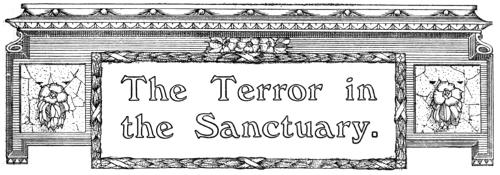
By Mrs. K. Compton.
A lady’s account of the fearful ordeal she underwent as a young girl on an estate in Natal—locked up in a tiny church, whither she had gone to practise a Christmas voluntary, with a huge python!
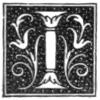
It was Christmas Eve, and one of the hottest days I remember during my sojourn in Natal. The recollection of that day, spite of the many years that have since passed, is so vividly imprinted on my mind that I can still see the heated atmosphere as it danced and shimmered over the cotton bushes and the rows of beans down the hillside.
The last stroke of the twelve o’clock gong summoning the gangs of Kaffirs to their midday repast and siesta had died away, and never a sound broke the stifling noontide stillness save the booming of the surf on the lonely sea-shore, three miles distant from my father’s plantation—the Beaumont Estate, as it is now called. The eye ached as it travelled over the glaring, sun-dried landscape that lay stretched before me, and sought grateful relief in the shady depth of the dark orange grove and spreading loquat trees that sheltered the veranda on which I lounged on my luxurious cane couch.
My father was a retired Anglo-Indian officer, who, having won distinction during the Indian Mutiny, had taken up a “military grant” of about two thousand acres of land in the Colony of Natal. He judged this to be an excellent opening for my brother Malcolm, who, although showing a strong desire to follow in his father’s military footsteps, lacked the capability and application requisite to pass the competitive examinations for the Army.
We had been, by this time, about three years in the Colony, and had half the estate under cultivation. Whether father was satisfied with the results I do not know. But, drowsily reviewing the situation on this particular afternoon, I came to the conclusion that a man who has spent the best years of his life in the Army cannot metamorphose himself immediately into an agricultural success.
I was aroused from my cogitations by Malcolm’s voice exclaiming: “Why, Jessie, I do believe you were asleep!”
“I was, very nearly,” I confessed. “This heat makes the physical exertion of unclosing my eyelids a task to which I do not feel equal.”
“When are you going down to the church?” he asked, as he tapped his cane against the leg of his long riding-boot.
“Now,” I declared, sleepily, “if you will come with me. Sam says he has got enough flowers and greenstuff to fill two churches.” Sam, I should explain, was the Kaffir boy whose duty it was to ring the bell for service, hand the collection-bag round, and gather the flowers for the church decorations. St. John-in-the-Wilderness, as it was called, stood on my father’s land, a shining beacon of corrugated iron and wood.
Struggling to my feet, I reached for my hat and green-lined umbrella, and stood ready, waiting to accompany my brother.
“Don’t take Nellie,” I protested, as the fat old bulldog gambolled about, panting and snorting in spite of the heat, in anticipation of a walk. But Nellie proved obdurate alike to threats and entreaties, and presently scampered off down the hill, leaving us to follow.
Half-way across the Flat we came to one of those exquisite little streams that are so frequently met with on the coast of Natal. Crossing this on stepping-stones, we reached the opposite bank, whence it was but a few paces through the narrow bush path to the clearing in the jungle where stood St. John-in-the-Wilderness.
“Look, Jessie, the door is open!” exclaimed Malcolm. “I suppose that duffer Sam didn’t lock it properly this morning when he put the flowers in.”
“Probably,” I returned, gaining his side on the vestry steps. “The lock has got so stiff that I cannot turn the key myself, so I am not surprised.”
The dim, subdued light inside the church caused us to pause a moment or so before observing the extravagant profusion of flowers, palms, and ferns that Sam had gathered—truly more than enough for the decoration of two churches the size of ours.
“How glorious!” I cried, kneeling by the side of this floral wealth and picking up a bloom of the delicately-tinted waxen ginger. “What would they say to Christmas decorations like this in England?”
“I think,” announced my brother, ignoring my ecstasies, “that I will just run over and inspect a gang at work at the other end of the Flat, and then I’ll join you and we can work undisturbed.”

THE AUTHORESS, MRS. K. COMPTON, WHO HERE RELATES HER TERRIFYING ADVENTURE WITH A HUGE PYTHON.
From a Photo. by W. J. Hawker.
I willingly agreed to this arrangement, as I wanted to practise some hymns for the morrow. To astonish our scanty congregation I thought I would put my musical genius to the test and attempt a voluntary.
Picking up his sun helmet and cane, Malcolm prepared to go.
“Don’t be long, there’s a dear,” I said. “And I think you had better lock the door and take the key, because the door won’t keep shut unless it is locked, and I do not care to have it open.”
“What are you afraid of?” laughed Malcolm, as he went out once more into the sunshine.
“Oh, I don’t know, I’m sure, but when I am alone I prefer to have the door shut.” Still laughing, he turned the key in the lock and went off.
Left by myself in the silent little church, I drew off my gloves and prepared to open the harmonium.
It occupied a position under a window in the chancel, on the first of the three wide steps leading to the sanctuary, on the right-hand side of the church. Immediately opposite was the vestry door by which we had entered, and between the harmonium and the vestry lay the pile of flowers and greenstuff for the decorations, so that I, seated at the organ, had my back towards the flowers. Two rush-bottomed chairs stood near, one bearing a basket of extra choice white flowers I intended for the altar vases; the other was on the right side by the harmonium, supporting the small repertoire of music that I needed for the service.
I took my seat leisurely, thinking over my voluntary for the morrow.
I turned over first one piece of music, then another, finally opening a tattered sheet of an old copy of “The Blacksmith of Cologne.” I settled on that; it looked so nice and easy.[213] Played slowly, with a proper amount of expression and a plentiful addition of the tremolo stop, I thought it would make a very telling and appropriate beginning to the Christmas service.
I had barely played a dozen bars of the music when I thought I heard a rustle of leaves behind me, but attributed the sound to some slight current of air from an open window. I was too much engrossed to pay the occurrence much attention, and continued my performance right through to the end, repeating a passage here and there which I thought required a different rendering. Then once again I seemed to hear stirring leaves, and, glancing over my shoulder at the lovely pile of flowers, I noticed the sound could only have been caused by the spray of wild ginger that I had carelessly tossed on the top of the other blooms, and which had apparently rolled down and now lay a few inches apart from the rest.
Rather amused that such a trifle should cause me to interrupt my practising, I again turned to the instrument, intent upon perfecting my piece.

THE CHURCH WHERE THE ADVENTURE HAPPENED AS IT APPEARED IN 1890.
Suddenly I was overtaken by a feeling of unaccountable apprehension, and, at the same time, became aware of a slow, continuous, rustling sound. Turning my head sharply over my shoulder, to my horror and intense surprise I saw the whole mass of leaves and flowers undulating!
Scarcely daring to breathe or move my fingers from the notes, I mechanically continued my playing. The fact that I was a prisoner behind a locked door forced itself on my mind and held me in my place, helpless. For a moment now and then as I watched the mass of verdure was quiet, only to begin upheaving again. What could it be? The suspense was becoming more than I could bear, and I was on the point of shrieking hysterically when my tongue refused utterance, and I felt as if life and strength were oozing out of my fingers.
On the farther side of the beautiful, fragrant pile of ferns and flowers appeared the head of an enormous snake. Slowly, quietly, with a gentle dipping movement up and down, it raised itself, and I saw that it was a python.
Then the Kaffirs’ legend was indeed true! They had told us a story which we had regarded in the light of a fable. In spite of our ridicule, they had maintained that a serpent of gigantic dimensions had its haunt in the neighbourhood of our little church. They said that it would suddenly appear from out the bush when the organ was played and lie in the sun as if listening to the music. We had naturally received the story as a Kaffir superstition, and gave it no credence.
But—Heaven help me!—it was no idle tale, but a horrible fact, for there was the immense snake before me.
A tempest of fear seized me. My heart seemed to beat all over me at once, and a singing noise in my head drove me nearly distraught. After a while, however, it appeared to turn into a voice calling upon me to continue playing. “It is your only chance, your only hope,” it seemed to say.
With a supreme effort of will I controlled myself sufficiently to continue my performance.[214] I compelled my hands and feet to move and perform their duty. Never once, however, did I move my eyes from the python, which was gradually drawing the vast length of its body into view.
A faint hope sprang within me that I might lull its savage proclivities with the music, and I forced myself to continue a monotonous droning on the little instrument. Calling to mind the snake-charmers of India, and imitating to my uttermost the mournful wail they produce on their reed whistles, I kept this going until the incessant thud, thud of the bellows seemed to pound on the nerves of my brain and be the only sound I extracted from the little organ.
Presently, with a fresh horror, I observed that the creature was rearing itself up, as if endeavouring to locate the direction whence the music came. Having done so, it gradually made its way round the heap of flowers and palms towards me.
Once the python reared itself to the level of the back rail of the chair where lay my choice white flowers, and for a space of time remained poised in that position, surveying its environment from that improved elevation. During this time its sinuous form quivered in perpetual vibration, and its changeful, scintillating eye gave indication of its exceedingly sensitive nature. It was evidently a creature so susceptible to sound that a human voice, far away across the Flat, borne on the scented, heat-laden air through the open window, smote its delicate organization and sent a tremor through its body, making the exquisite, shaded skin shiver, and bringing into prominence a wonderful iridescent bloom that glistened along the smooth surface of its coils.
Once, in its passage towards me, the snake pushed the chair that impeded its progress an inch or two from its former position, scraping it along the varnished boards, causing a sharp discordant sound.
Instantly the python drew back its awful head, assuming a swan-like attitude. The quivering tongue, as sensitive as a butterfly’s feelers, played and trembled, and its jewelled eyes narrowed and flashed. The creature’s whole position was one of threatening defence. How deadly it looked, how awful in its cruel beauty!
“Heaven send me help!” I inwardly prayed. “Oh, for some means of escape!”
Closer and closer the awful creature undulated directly towards me, pausing now and again as if to prolong my agony of suspense. In reality I believe it was listening, its sensitive ear—or if, as some scientists hold, snakes are deaf, then some subtle sixth sense unknown to us—detecting sounds my dull brain could not catch.
At length it was so close to me I could have stretched out my hand, had I wished, and touched it, and a coil of its body actually lay on my skirt as the creature rested at my side, evidently enjoying the mournful music, which I verily believed to be my funeral dirge. For the end, I thought, must come soon. With this deadly creature so close to me, and in such a position that I could not but disturb it if I moved, I was getting cold and numb with fear. I felt myself getting faint, and realized that I was going to fall. Desperately I fought against the feeling, struggling against my growing weakness.
How long the serpent lay, like a watch-dog, at my feet, how long I played I do not know. I could not measure time; I was in a trance, asphyxiated with fear.
Suddenly a noise seemed to snap something in my brain, and the spell was broken. It was a sharp bark from Nellie, just outside the window.
And, coming nearer through the bush, I heard the echo of my music whistled back to me, as Malcolm, all unconscious of my peril, took up the refrain with which I was endeavouring to soothe my dread visitant to rest and peace.
And now that help was at hand, a new danger and difficulty confronted me. How was I to warn Malcolm? How was I to drag my skirt away from under this monster quickly enough to escape through the open doorway before it struck me?
Long ere I was aware of the approach of help the serpent had shown signs of irritation, its intuitive sensibility detecting the advent of danger, and at the noise of the key grinding in the rusty lock the python gathered its sinuous body under it, as if to obtain greater support for a forward stroke. Then, with its head and a portion of its body reared high above the floor and darting angrily hither and thither, it waited expectantly.
Dazzled with the glaring sunlight outside, Malcolm hesitated on the threshold for a moment, and in that moment Nellie passed him and ran into the church. Even then I could not move my gaze from the snake, or speak or move, or give a symptom of warning But I was aware of poor old Nellie coming towards me, panting and puffing with the heat and fatigue of her walk, and with greeting and gladness in her soft brown eyes.
She was scarcely a yard from me, and I heard my brother call to her: “Go out, Nellie; go out!”
Then there was a sound as if a whip were cutting through the air, and something passed before my vision like a flash of forked lightning[215] in the sky, and I knew that the death-blow had fallen—not on me, but on dear, devoted old Nellie, the bulldog. The python literally leapt at her, striking again and again, as it endeavoured to seize her in its awful coils.
I waited no longer, but sprang from the chair, upsetting it and the books in my flight, and fairly flew to the door. I reached Malcolm in safety, and he dragged me outside, shutting the door behind us, and leaving Nellie and the python in the church. The dog’s piteous cries of agony and fear sickened us, and made Malcolm attempt a rescue. He rushed in once again, calling to the dog, in the vain hope that she might at least die with us at her side. But she could not see; blinded with fright she ran wildly about. Her end was horrible to contemplate, and I pressed my hands to my ears to shut out the sounds, running from the church and close proximity of the fearful creature under whose spell I had been for so long. I sank down under the shade of some trees and thanked God I was safe!
But the cries of poor Nellie, the thud, thud of the bellows, and the mournful dirge I had repeated over and over again banged and clanged unceasingly in my head, remaining with me through many days of utter prostration and exhaustion.

“THE KAFFIRS, SEEING ITS SKIN STRETCHED IN THE SUN TO DRY, LOST THEIR SUPERSTITIOUS BELIEF IN THE MAGIC POWERS OF THE CREATURE.”
The last music that python heard was the crack of Malcolm’s rifle as he shot it in the church. That same afternoon the Kaffirs, seeing its skin stretched in the sun to dry, lost their superstitious belief in the magic powers of the creature, and marvelled at its huge size. The mottled, shaded skin now hangs, faded, dull, and dusty, after many years, on the walls of a college museum, amidst other South African trophies. We buried what remained of poor Nellie in the shadow of St. John-in-the-Wilderness.
By Arthur Inkersley, of San Francisco.
Now that airships are so much to the fore, this account of the meteoric career of the largest “dirigible balloon” ever constructed—larger even than Count Zeppelin’s unfortunate monster—will be read with interest. The inventor had an ambitious scheme for running luxuriously-fitted aerial liners between New York and San Francisco, but his first ship got no farther than the ascension ground. The photographs accompanying the article are particularly striking.
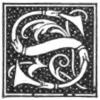
Some time last year there came from the windy city of Chicago to the hardly less breezy San Francisco a man named John A. Morrell, who built a small airship with a balloon of insufficient size to lift the engines and netting. The craft got loose before the crew of twelve had taken their places and rose from a hundred to two hundred feet in the air, floating away in a southerly direction down the San Francisco peninsula and coming to rest at Burlingame, in San Mateo County, twenty miles from its starting-point.
Nothing daunted by this mishap, Morrell organized the “National Airship Company,” incorporated under the laws of South Dakota, established offices in a leading street of San Francisco, and put forth a glowing prospectus, in which people were invited to invest their money in a sure thing—to wit, an airship a quarter of a mile long, already under construction, and intended to make regular trips between San Francisco and New York City, carrying passengers as comfortably as a Pullman car. The chairs in this remarkable craft were to be made of hollow aluminium tubes and to weigh only seventeen ounces; the bedsteads, of the same material, weighing twenty-seven ounces. The mattresses were to be inflated with a very light gas of a secret nature. Extravagant and fantastic though all this sounds, Morrell possessed the enthusiasm and glibness of the genuine promoter, contriving to obtain many thousands of dollars from credulous people in support of his wild project.
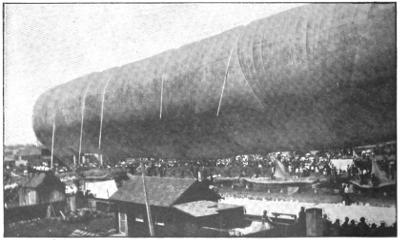
MORRELL’S MONSTER AIRSHIP BEING INFLATED, READY FOR ITS FIRST ASCENT, IN THE PRESENCE OF A VAST CROWD.
From a Photograph.
The National Airship Company established shops in San Francisco, and went to work upon the airship, which was named “Ariel.” The construction was under the direction of George H. Loose, who has had considerable experience in building aeroplanes and airships. It was intended that Loose should be first officer of the aerial liner, but, when the time for making the first ascent came, Loose wisely threw up his job, because Morrell had disregarded his advice in the construction.
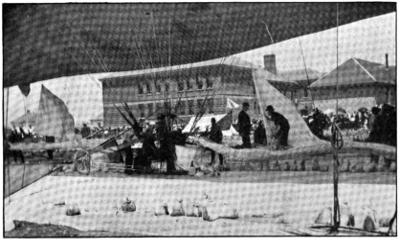
A NEAR VIEW OF PART OF THE AIRSHIP, SHOWING ONE OF THE ENGINES AND PROPELLERS—NOTICE THE FLIMSY NETTINGS AND THE MATTRESSES INTENDED TO SUPPORT THE CREW.
From a Photograph.
Nearly every well-known principle of airship construction was violated. The proportions were impracticable, the craft being four hundred and eighty-five feet long and having a diameter of only thirty-four feet. The gas-bag was like a huge snake, having no rigidity, either horizontally or vertically, and not being stiffened by trussing of any adequate sort. A gas-bag of such length and proportionately small diameter should have been strengthened by a vertical framework, or by trusswork of rope or wire, so as to impart rigidity; but nothing of this sort was done. The motive-power was supplied by six separate four-cylinder forty-horse-power automobile engines, hung below the balloon at intervals.
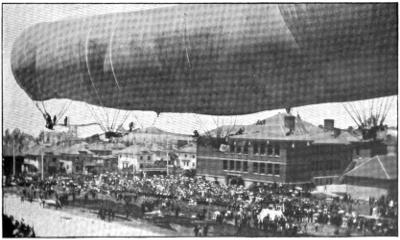
THE AIRSHIP LEAVING THE GROUND AMID THE CHEERS OF THE EXCITED ONLOOKERS.
From a Photograph.
These concentrated weights were carried on a platform, not of planks, but of mattresses, laid down on mere canvas, supported by the netting which covered the gas-bag. Ropes placed round the gas-bag at the points where the engines were situated cut deeply into it, and no arrangements whatever were made to meet the special stresses caused by the steering of so long-drawn-out an affair. Loose’s chief reasons for refusing to make the ascent were that if the envelope were filled with enough gas to render it rigid the emergency valves would open, and if these were tightened the envelope was liable to burst.
Serious as the various defects mentioned were, the most fatal one was the fact that nothing had been done to prevent collapse or deformation caused by sudden expansion or contraction of the gas from changes of temperature. The balloon was one great, undivided bag, containing from four hundred thousand to five hundred thousand cubic feet of gas, but having no compartments or internal air-bags. Its lifting capacity was from eight to ten tons, so that it was much the largest airship ever built in America, even exceeding in dimensions the great “dirigible” of Count von Zeppelin.
It might be supposed that it would be pretty hard to get together a score of persons who would be willing to risk their lives in such an unpractical affair as the Morrell airship; but, strangely enough, the greatest difficulty was experienced in keeping people off the craft. One man, a well-known aeronaut named Captain Penfold, repeatedly begged Morrell to let him make the ascent, but his request was flatly refused. Yet so eager was Penfold that at the last minute he smuggled himself on to the craft and went up with it and—a few moments later—came down with it.
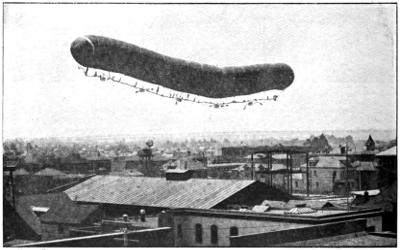
THE “ARIEL” IN MID-AIR. ITS NOSE HAD A DECIDED TILT DOWNWARDS, AND THIS INCREASED UNTIL ALL EQUILIBRIUM WAS LOST.
From a Photograph.
Some time before the attempted ascent was made the airship was conveyed from San Francisco across the Bay to Berkeley, in Alameda County, Cal. The trial trip was fixed for Saturday, May 23rd, and on that morning thousands of excited people were on hand to watch the ascent. The airship was released from its moorings and began to mount into the air, its nose having a decided tilt downwards. The machine had risen scarcely two or three hundred feet when the rear of the balloon had an upward inclination of as much as forty-five degrees.
Morrell shouted to his crew, consisting of engineers and valve-tenders, numbering fourteen or fifteen, to go aft, so as to depress the stern of the machine and cause it to resume its equilibrium. But the shouts and cheers of the people below drowned his voice so that he could not be heard. A moment later the gas rushed into the after-end of the bag with great force, bursting the oiled cloth of which the envelope was constructed, and the cheers had hardly died away before the horror-stricken crowd saw the great balloon collapse and come headlong to the ground, with its nineteen passengers, who included Morrell, eight engineers, five valve-tenders, two photographers with their assistants, and the aeronaut already mentioned.
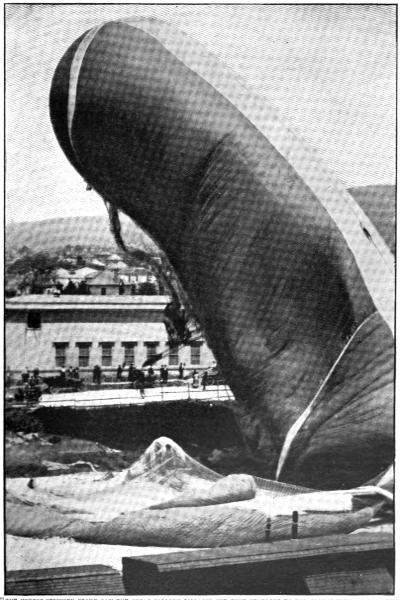
“THE HORROR-STRICKEN CROWD SAW THE GREAT BALLOON COLLAPSE AND COME HEADLONG TO THE GROUND WITH ITS NINETEEN PASSENGERS.” NOTICE THE VALVE-TENDER SCRAMBLING WILDLY ALONG THE NETTING ON TOP OF THE GAS-BAG; HIS AGILITY STOOD HIM IN GOOD STEAD, FOR HE ESCAPED ALMOST UNINJURED.
From a Photograph.
The unfortunate men were entangled in the wreckage of flapping cloth, network, and machinery, running the danger of being struck by the propellers of the engines or of being suffocated by the great volumes of escaping gas. One valve-tender, who was on the top of the great bag, can be seen in one of the photographs climbing along the netting. His agility stood him in good stead, for he escaped from the wreck almost uninjured.
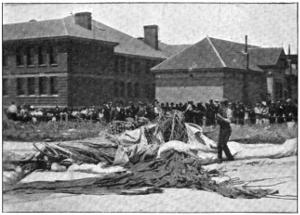
GATHERING UP THE WRECKAGE AFTER THE COLLAPSE OF THE AIRSHIP.
From a Photograph.
It might be supposed that nearly all the men on the ill-fated craft were killed; but, remarkable to relate, not one lost his life. Morrell himself sustained severe lacerations, and had both his legs broken by one of the propellers; Penfold, the persistent, had his right ankle and left instep broken; Rogers, an assistant engineer, suffered a broken right ankle; and another engineer met with broken ribs and ankles. Others were bruised or rendered unconscious by the gas.
Morrell ascribed the disaster to the fact that he was forced by impatient stockholders in the National Airship Company to make the attempted flight before he had worked out certain details of the vessel’s construction thoroughly. It is believed by those who saw the luckless craft that it was constructed flimsily of poor materials and not inflated sufficiently. The ill-starred aeronautic adventure not only cost many broken bones, but some forty thousand dollars (more than eight thousand pounds) in money.
It would naturally be supposed that so complete and disastrous a failure, after the expenditure of so large a sum of money, would have destroyed all confidence in Morrell as a designer of airships, and would have put him out of the business of aerial navigation for all time. But it was not so; the enthusiast still asserts that he has discovered the true principle of the navigation of the air, and that the National Airship Company is ready to proceed with the construction of another craft, much larger and costlier than the first one.
The new airship is to be seven hundred and fifty feet long and forty feet in diameter, equipped with eight gasolene engines, developing nearly three hundred and fifty horse-power and operating sixteen propellers. The inside bag will be of light silk and the outside bag of heavy silk interwoven with a material known as “flexible aluminium,” of which Morrell possesses the secret. The new balloon is to have more than a hundred compartments, many of which might be broken without disturbing the buoyancy or equilibrium of the vessel.
A rigid platform is to be substituted for the canvas and netting cage in which the unfortunate participants in the attempted ascent of the “Ariel” rode. The new vessel is to cost one hundred thousand dollars (more than twenty thousand pounds), and to be capable, if the inventor is to be believed, of a speed of a hundred miles an hour. The really marvellous things about the whole business are the unquenchable enthusiasm of the inventor and the unfailing credulity of those who believe in him.
By A. P. Taylor, Chief of Detectives, Honolulu, Hawaiian Islands.
The story of the most disastrous voyage in the annals of the United States transport service. The steamship “Siam” left San Francisco with a cargo of three hundred and seventy three picked army horses and mules, destined for “the front” in the Philippines. She landed two mules alive at Manila. In this narrative Mr. Taylor, who was a passenger on the ill-fated vessel, tells what became of the remainder.
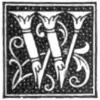
When the Japanese Government recently offered for sale the former Austrian steamship Siam, a prize of the late war, there was concluded one of the most remarkable romances of the United States army transport service. Four flags have so far flown over this steamer, but her career is not likely to conclude under the ensign of the Land of the Chrysanthemum.
Christened on the banks of the Clyde in the early ’nineties as the British tramp steamer Resolve, the vessel later passed into the hands of an Austrian corporation at Fiume, and was renamed the Siam. Fate and charterers sent her to the Pacific Ocean in the second year of the Filipino insurrection, and she was chartered by an American firm of San Francisco, and entered the coal trade between Nanaimo and the Bay City.
In the summer of 1899 the United States War Department assembled at Jefferson City, Missouri, one of the finest trains of experienced army mules and horses ever organised for foreign service. From Cuba, from the northern borders of the United States, from frontier army posts, and, in fact, from every part of the United States where the quartermaster’s insignia were in evidence, these animals were brought to the common rendezvous in Missouri. They were the pick of the army—staid old mules and horses that had been in the service for years, and knew almost as much of military discipline as the men in blue. Their transhipment to the Presidio at San Francisco followed in July, and then the War Department cast about for a vessel in which to ship them to Manila, where General Otis was even then delaying important army movements in order that these animals might accompany the troops to “the front.”
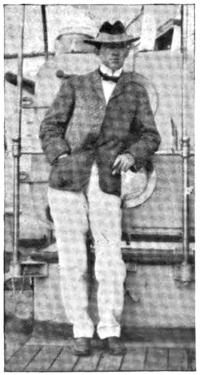
THE AUTHOR, MR. A. P. TAYLOR, CHIEF OF DETECTIVES, HONOLULU, HAWAIIAN ISLANDS.
From a Photograph.
The Siam had just returned from Nanaimo with a cargo of coal. She was a fine, big, ten-knot boat, with Austrian officers and sailors. The War Department decided, although she flew the flag of the Emperor Joseph, that she was just the vessel needed. Early in August, after several weeks of hammering, sawing, and building of superstructures, three hundred and seventy-three horses and mules were sent aboard and placed in separate stalls for the long voyage to Manila. The loading of the animal cargo was a matter of much concern to the War Department, with the result that almost the pick of the packers and teamsters of the army—fifty-six in all—were chosen for the voyage.
In command of these rough-and-ready plainsmen was Captain J. P. O’Neil, 25th Infantry, United States Army. Captain O’Neil was just the sort of man to deal with the cowboys—no army dandy, but a true-blue soldier, and the men admired and loved him.
Among the horses was the thoroughbred presented to General “Joe” Wheeler, United States Army, by the citizens of Alabama after his return from the Cuban campaign. “Beauty” he was called by the men, and he was given a place of honour near the officers’ cabin. Yet another splendid animal was the horse belonging to Miss Wheeler, daughter of the General, who was then an army nurse in the Philippines.
The officers and crew were all Austrians, with the exception of two engineers. The commander was Captain Sennen Raicich, sailor, gentleman, and postage-stamp connoisseur. His hobby was rare stamps, and his cabin was filled with cases containing valuable specimens. Every day he went over his collection, labelling, classifying, and docketing the new ones which he had purchased at the last port. The[222] collection was valued at about twelve thousand dollars, and was insured. Messrs. Xigga and Stepanovich were his two officers. Captain, mates, and crew all hailed from the section of Austria nearest Fiume.
Ten days after leaving San Francisco the Siam reached Honolulu, and the horses and mules were taken ashore and sent to the Government corrals, where they recuperated for two days. During this time Captain O’Neil spent much time considering the arrangement of the stalls. These were arranged along the main deck and in the first hold below. Over the exposed portions of the main deck superstructures had been raised to protect the animals from the elements. The forward deck was loaded with hay and grain for use during the voyage, while between decks was a stock of forage. Over the officers’ section a deck-house was built, and used as a sleeping-place for the cowboys.
The Honolulans took great interest in the horses, and hundreds examined the stalls, which were arranged along the sides of the steamer, the animals facing inward. Small chains hasped to the supports on either side led to the rings of the halters. Cleats were nailed to the flooring to give the animals a footing during storms. The leisure time of the cowboys was spent in making canvas “slings,” intended to be placed beneath the bellies of the animals during bad weather, the ends fastened to rings in the deck above, to assist the animals in keeping on their feet should the vessel roll awkwardly. The transport service had much to learn, and the use of slings was a costly lesson.
For several days the voyage toward the Philippines was delightful. Half-cloudy days and trade winds maintained an even temperature throughout the ship. Officers, crew, cowboys, the few passengers, and the animals were on the best of terms. Captain O’Neil cheerfully looked forward to the day when the Siam should steam into Manila Bay and he could report the voyage successfully ended and without the loss of an animal. Captain O’Neil’s enthusiasm was communicated to the cowboys, and they resolved to make a reputation for the voyage and land their animals safe and sound. Alas for human hopes! That voyage was to prove the most disastrous in the annals of the American transport service.
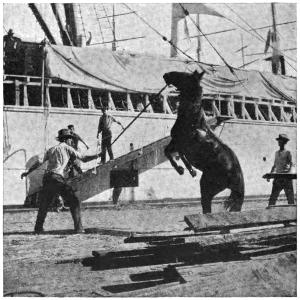
GENERAL WHEELER’S HORSE “BEAUTY” BEING TAKEN ON BOARD THE “SIAM.”
From a Photograph.
On the morning of September 17th came a change in the direction of the wind. The officers consulted the barometer, and the land-lubbers, taking amateurist observations of their own, saw that it was falling. Then came a few gusts, the sky changed, and in a little while a terrific storm burst over the steamer. The vessel rolled, and the horses, unused to such a motion, had difficulty in retaining their feet. Clouds of spray dashed over the bridge and tons of water broke upon the decks. The stalls were flooded and became slippery, and the animals frequently fell. Sometimes a lurch threw at least fifty from their feet. Instantly there was a struggling, kicking mass of horse and mule flesh on the decks. The cowboys, although experiencing the first real nausea during the voyage, bravely went among the helpless brutes and assisted them to their feet. For two days and nights this went on, and few men were able to sleep. Finally things got so bad that Captain O’Neil sent a written request to Captain Raicich to change the course of the vessel to any direction that would give the least motion to the ship.
Those who have never been to sea may not[223] know the danger of putting a vessel about in a sea which is piling up angrily from every direction. The order was sent through the ship that she was to go about, and everyone clung to a support during the manœuvre. Gradually the vessel answered her helm; the roaring wind beat against her hull, heeling her far over, until the landsmen clung desperately to anything handy to prevent them sliding into the boiling sea. At length the manœuvre was safely executed, and all hands breathed a sigh of relief. The vessel scudded before the wind, riding more easily, though she was going far out of her course.
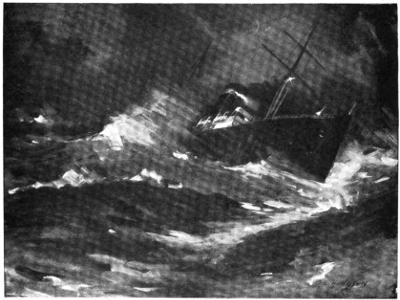
“A TERRIFIC STORM BURST OVER THE STEAMER.”
When the sun broke through the clouds a tropical-looking island loomed up on the horizon, which proved to be the island of Saipan, of the Ladrones group, just to the north of Guam. Whether it was inhabited those aboard did not know, for there was not on the ship a chart or book bearing upon the island. A mysterious column of smoke shot up from a grove of trees as the vessel passed by, followed by a second and a third. A “council of war” was held. Were the mysterious smoke signals sent up by shipwrecked sailors or by natives with questionable intentions? Captain Raicich cut the Gordian knot with the statement that the Siam was under contract to the United States Government at six hundred dollars a day, and as considerable time had already been lost he could not for a moment think of detaining the vessel while an investigating committee went ashore.
After that storm the ship was a hospital, for two hundred and thirty-three horses and mules were more or less injured, and every man devoted his whole time to caring for them. Strange to say, many of the cowboys and mules had been associated for years in Government work, and they were therefore old friends, and the men were sympathetic veterinarian nurses. Six animals died of their injuries.
That storm was a heartrending set-back to the ambitions of Captain O’Neil. However, he made the best of the experience by preparing for similar episodes. One day the engines gave out, and the vessel lay to for several hours while the engineers and firemen worked like Trojans to repair the damage. At first it was decided that the vessel, being then near the Philippines, could make port with the one uninjured engine, but it was finally decided that it would be best[224] to repair the damage at sea. It was well that this decision was arrived at, otherwise the Siam would never have reached port.
On September 29th the steamer was close to Cape Engano, on the northern coast of the island of Luzon. On the morning of September 30th the sky became overcast, the wind freshened, and the barometer fell. In the afternoon there was a peculiar glow in the clouds, which behaved most curiously; they seemed caught in currents of wind and were stretched out across the heavens in orderly lines, parallel with the horizon. To the landsmen none of the signs were ominous, but the ship’s officers sent orders quietly among the crew.
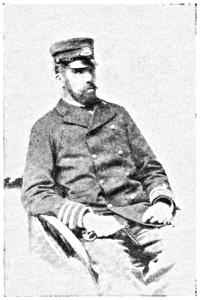
CAPTAIN SENNEN RAICICH, OF THE “SIAM.”
From a Photo. by Antonio Funk.
A passenger, going into the chart-room, from which an officer had made a hurried exit, saw a book on navigation lying there. It was open at a chapter on typhoons, and there were under-scorings where “China Sea,” “The Philippines,” “Yellow Sea,” etc., occurred in the text. The passenger looked at the barometer again, saw that it had fallen, and began to understand. There was an ominous silence throughout the vessel, and a peculiar stagnant feeling impregnated the air. The growing sense of menace affected every living thing aboard; the plainsmen had long since stopped chaffing and the animals stamped uneasily.
Meanwhile the crew were very busy. Canvas shields were taken in, rigging was examined, and the captain went below to the engine-room and consulted with the engineers.
Evening came on, the sea began to stir, and the crests of little waves broke sharply. The Siam was now in sight of the northernmost portion of Luzon, and as Cape Engano was approached she was slowed down, but the captain and officers looked in vain for the lighthouse on the cape. At ten o’clock the commander changed the course of the vessel from west to north, thereby keeping out of the channel above the cape, for he would not risk entering the waterway without first picking up the light.
It was well that he formed this decision, for at eleven o’clock the heavens and the sea seemed to meet in a mighty clash. There was one mighty reverberating roar, the steamer heeled over, the wind howled through the rigging, and the stern, lifting high out of the water, permitted the propeller to race, shaking the vessel from stem to stern. The gong and bells rang sharply in the engine-room, the propeller stopped racing, stopped altogether, spun again. The tramping of feet sounded along the decks; orders were shouted from the bridge in Austrian. The cowboys gathered on the main deck and waited anxiously—for what, they did not know. Then the passenger transmitted the knowledge of the open book in the chart-room to the landsmen. A typhoon was on, perhaps, he suggested. “Typhoon” in the China Sea, “hurricane” in the Atlantic, “pampero” off the South American coast, “cyclone” on land—all mean much the same thing. The most terrifying storm a vessel could encounter held the Siam in its mighty grip.
Then, almost without warning, a demoniacal sea and a fearful wind, with legions of horrible, never-to-be-forgotten night terrors, appeared to leap upon the ship from the darkness.
A sickening dread crept into my heart. In fifteen minutes the whole fury of the typhoon was upon us. It was almost midnight of September 30th when we realized, by a glance at the captain’s face as he rushed into the chart-room, that a battle for our lives was upon us. It was human science matched against the ungovernable fury of the elements. Which would win?
I made my way to the bridge, clinging now to a rope, and now down upon my knees with my arms around a stanchion. By main force I held on to the wheel-house, where the captain and his two mates directed the course of the stricken ship. Their faces were set with grim determination, their eyes staring fiercely now at the compass and then at the boiling seas, which pitched and rolled us about like a paper box. The wheel flew round from side to side. One end of the bridge rose and towered above me until I leaned over almost upright against the ascending deck, and as suddenly it fell until it seemed to plough the water. The wind, blowing at eighty miles an hour, tore canvas and rigging to shreds.
Suddenly the bow lifted high upon a monster wave. Higher, higher, higher it rose, while the stern sank down into a yawning chasm. Simultaneously a huge wave struck us abeam. Down came the bow, and over heeled the steamer upon her side. From below came the nerve-racking bellowing and screaming of the terrified animals as they strove madly to keep their feet. Hoarse shouts came up from the lower decks, where the cowboys were endeavouring to help their charges. Now and then there was a crash as an animal was flung bodily out of its stall across the deck, where it smashed stalls and set other animals loose. Each time the ship rolled I set my teeth, for each swing seemed about to plunge us into the boiling black abyss below. Often my heart seemed to stand still, and I waited for the moment when our devoted band would be hurled into eternity.
Presently half-a-dozen of us descended to the stokehold in order to send ashes up to the deck to be spread under the hoofs of the struggling animals. Out of that stifling hole bucketful after bucketful was hoisted until the deck was strewn with débris. But the heat of the stokehold and the unusual labour caused the amateur stokers to sicken, and, exhausted and nauseated, we climbed to the deck again and lay there gasping.
With morning the storm grew worse. At nine o’clock Captain Raicich determined to heave the ship to, but the plan had to be abandoned, owing to stress of weather. The steamer was compelled to head directly into the wind, which eddied in dizzy concentric circles around a larger circumference. My diary contains the following notes jotted down on the afternoon of October 1st, written mainly in shorthand while I lay ill in my bunk:—
“Good heavens! Another such day and night as we have been having and I believe I shall become insane. Buffeted and tossed about like a feather, careening, rolling, and pitching, the Siam seems ready to take her final plunge. Just now a great wave lifted the bow until it seemed the vessel would stand straight upon her stern; the stern went down and threw us up again with a terrific lift. A wave strikes the bow and races the full length of the vessel, tearing everything loose it can rip from its fastenings. It is sickening. I am writing this in the very midst, the centre, of the worst kind of storm one can encounter at sea. The men are shouting and cursing, the animals pawing and uttering plaintive sounds.
“We don’t know where we are. We know we are heading north-east to get away from ragged reefs which lie to the north of Luzon. We are steaming directly in the face of the typhoon and make no progress. The barometer has fallen twelve points since noon. May Heaven have mercy on us!
“7 a.m., October 2nd.—What terrible sights I have witnessed during this awful time! The storm increased every hour of the night, the barometer going down from 82 to 30, disclosing the fact that we were heading directly toward the centre of the typhoon. We have rolled so heavily that the rail goes under at each dip. The men remained at their posts in the stable division, striving to keep the animals from plunging out of their stalls from sheer terror. Suddenly a mule falls. Men hurry to raise it. A return lurch, and down go a score—a mass of maddened, screaming brutes. From every part of the ship whistle-signals are heard calling for help. None can be offered, and there the poor beasts lie piled up on each other, sliding upon their sides and backs from one side of the ship to the other, tearing strips of flesh from their bodies, causing them to groan piteously in their helplessness. The ship is tossed every way, up and down, side to side. Heavy seas break across the decks.
“Crash! There goes the cowboys’ bunk-house on the poop deck. It is flooded, and the men’s belongings are sweeping into the sea. The water is pouring down into our cabins. Destruction everywhere. Another crash—the rending of timbers in the stable sections. I hear the men shouting warnings and hear their feet tramping across the decks. The stalls have given way entirely. Horses are plunging through the hatchways into the lower stable divisions. A thud, a groan, and they are dead. The rest are piled up in sickening, agonizing masses, rolling, snorting, kicking, and endeavouring to get upon their feet. No man dare move from his holding-place. One has to stand almost upon the cabin wall to keep erect.
“There they lie, all our pets, the captain’s thoroughbred, General Wheeler’s own charger. There are twenty horses dead in one heap. A mule has plunged right down into the engine-room, breaking its legs. It lay there for two hours before Captain O’Neil could shoot the suffering beast. The engineers crawled over the carcass as they stood at the throttles to ease the engines down as the propeller races.
“The terrific battle of the elements outside beggars any description from me. Intensify any storm you have experienced on land a couple of thousand times, add all the terrors that darkness can furnish, add the thoughts of terrible death staring you in the face every minute, with the sights and sounds of Dante’s Inferno, and then perhaps you can gain some idea of our misery.
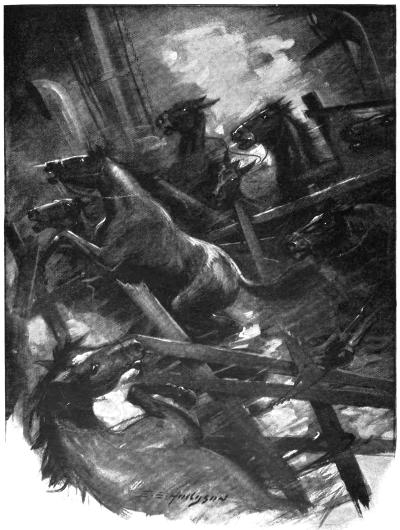
“A MASS OF MADDENED, SCREAMING BRUTES.”
“At daylight the seas swept across and filled up our decks. Then it was that Spartan measures had to be taken. The hatches were ordered to be battened down, thus confining in a death-trap nearly two hundred mules. We knew it meant death by suffocation to those that were still living, but our own lives were at stake, and to save our own the animals must be sacrificed.
“I am now writing in the chart-room. If we[227] sink, I don’t want to be caught like a rat down in my cabin, although there will be no chance for life in any case if we go down.
“To make our terror worse the Austrian firemen have mutinied. They heard that the captain had given up the ship. They were right, for he told us to prepare for the worst. Think of knowing that we have got to drown! Our boats are all smashed and hanging in bits at the davits. The firemen tumbled up on the deck looking like demons from the underworld. Then Captain O’Neil showed his true nature. He became the hard, steel-like soldier. He sternly ordered them below, but the men did not move. The cowboys knew instinctively that without steam to turn the engines we must surely founder. Two of the cowboys seized the ringleader, and, placing the ends of a lasso about his wrists and thumbs, started to draw the rope over a guy wire, threatening to string him up by the thumbs. Captain O’Neil had turned away when these men took the prisoner in charge. Immediately the frightened crew turned and fled down to the stokehold.
“Who can blame the poor beggars? Life is as sweet to them as to us. Two hours later they came up again, but the display of an army revolver in Captain O’Neil’s hand caused them to retreat.
“The chief engineer, an Englishman, has gone insane. Thirty-three years at sea, and now he has gone to pieces! The terror of the long vigils at the throttle unnerved him. I passed him a little while ago; he was sitting in his cabin wailing piteously, his face blanched with terror. The little Scotch second engineer has been on duty almost every hour since the night of the 30th. His whole back was scalded by steam. Dr. Calkins bound it up in cotton and oil, and he is working as if nothing had happened, brave little fellow.
“6 a.m., Tuesday morning, October 3rd.—Another chapter in my experience of Hades. No one is on duty except the ship’s officers. It is a ship of the dead. I have just taken a look down the upper stable division, and the sight sickened me. The poor brutes of horses and mules, mangled and torn, lay in heaps, the live ones trying to extricate themselves from the dead.
“At last the typhoon has spent itself, and by to-morrow morning we shall probably be able to get back on our course and make a fresh start for Manila. Nearly all the horses and about two hundred mules are wounded as far as we can ascertain. Soon the hatches will be taken off, and we can learn the horrible truth.
“October 4th.—All morning long the dead animals have been hoisted out and thrown overboard. How horrible it all is! The men working in the lower holds are overpowered and compelled to come up on deck every few minutes. We have three steam-winches going. We found only one live mule in the lower hold. Captain O’Neil has been shooting most of the live animals, for they are beyond hope in their terrible condition.
“Captain Raicich told me to-day that for four hours yesterday he did not know whether the ship would pull through. The Siam got into the trough and could not be steered. He said he was prepared then for death. He said he has never before experienced such a terrible storm. We don’t know just where we are yet, as we can take no observations.
“What a terrible change in Captain Raicich’s appearance! He never left the bridge for three days and nights. He, as well as the two men at the wheel, were lashed to stanchions. He wore two oil ‘slickors,’ but they are in ribbons, and the tar from them has sunk into his hair and beard and deep into his skin. He is dirty and wretched-looking. His cheeks are sunken and there is an almost insane glare in his eyes. He looks like a wreck, but in spite of his terrible ordeal he is as decisive in manner as before. Poor fellow, he hardly ate anything during the whole of the typhoon. He saved our lives.
“We have just located our position. We are a hundred miles north of Luzon, and close by are the dreaded coral-teeth we tried to avoid.
“October 5th.—We are now nearing Manila Bay and have cleared up the vessel fairly well and thrown most of the carcasses overboard. The ship is a wreck; everything seems to have been twisted, broken, torn, or damaged in some way. Up to last night we got overboard three hundred and fifty-five carcasses. This morning four more were found dead and two others had to be shot. We now have only twelve animals left, some of which we may land at Manila alive. This is all we have left out of three hundred and seventy-three. Dozens of sharks follow in the wake of the vessel. The Siam’s expedition has been the most disastrous in the transport service.”
As a matter of fact, the Siam actually landed only two animals at Manila. They were little Spanish mules which had been thrown into the coal-hold and, strange to say, had not a scratch upon them. They were and are still known in and about Manila as the “Million-Dollar Beauties” of the quartermaster’s department.
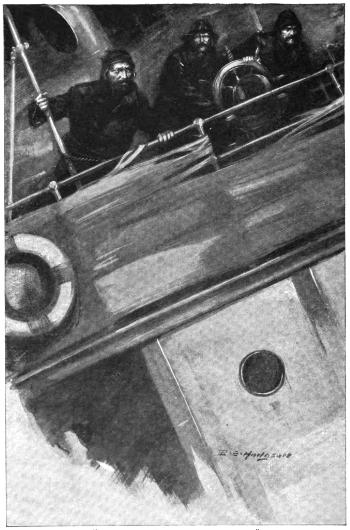
“HE NEVER LEFT THE BRIDGE FOR THREE DAYS.”
I accompanied Captain O’Neil to General Otis’s head-quarters in the ancient Spanish palace in old Manila. When informed of the disaster the General was greatly grieved, and remarked that it would have a serious effect on the plans he had made. Captain O’Neil[228] then presented him with the following report of the voyage, which, although an official document, contains much of the romance connected with the disastrous expedition:—
United States Transport “Siam.”
Adjutant-General Eighth Army Corps, Manila, P.I.
Sir,—I have the honour to report my arrival with the steamship Siam, chartered as a United States animal transport. I left San Francisco, California, on the night of the 19th of August with three hundred and seventy-three animals aboard. We experienced ordinary weather, and arrived in Honolulu, H.I., August 29th, leaving there September 6th.
After leaving Honolulu, and until the 17th of September, we had fairly good weather, and up to this date (a month away from San Francisco) all the animals were in perfect condition. The duties of horse veterinary and nurses were then sinecures. On the morning of the 17th a heavy swell from E.N.E. and N.N.E. struck the ship and made her roll considerably. This swell continued. The next day, Monday, the 18th, the wind rose from[229] S.S.E., and continued to increase in force until it became a gale, blowing from S. and S.S.E., with a big swell from S.S.W. and S.E. This rough sea was extremely trying on the animals; as many as fifty would be thrown from their feet at the same time, and for forty-eight hours I was not able to spare a moment for sleep, and the greatest rest that any man of my detachment had was six hours. I, at this time, sent a written order to the captain of the ship to change the course of the vessel to any direction that would give her the least roll. According to this order, he changed the course to S.E. We were driven several hundred miles out of our course. Wednesday morning the wind abated; we were able to resume our course, and passed the Ladrones, north of Saipan. Wednesday morning the storm began to abate; Wednesday evening and night we were busy caring for the injured and taking stock of our animals. I found two hundred and thirty-three animals injured more or less severely; of these, six (6) died. The greatest care was given to the injured, and they all pulled through remarkably well.
Everything ran smoothly, fair winds and fair seas, until Saturday night, September 30th. We arrived at the head of the island of Luzon (Cape Engano). It was after dark—there was no light—the weather looked threatening. The captain and I discussed the matter and finally decided that it was not safe to try and go through this passage on a stormy night without being able to locate any landmarks. The captain was directed to cruise outside until daylight. About twelve o’clock that night the wind started blowing from N.N.W., gradually increasing into a gale; the vessel was headed into the wind and sea and rode very smoothly until Sunday morning, October 1st, when the wind began to shift, increasing in force, and for the next two days continued changing direction. Until the storm abated Tuesday morning, the wind was blowing from the S.E. The sea raised by this circular wind was tremendous. From Saturday night at twelve o’clock, for fifty-six hours, every man on board the vessel worked like a Trojan. Animals were continually being thrown from their feet, and the men worked getting them to their proper places. As the storm increased, so increased the labour—the men, almost exhausted, continuing their task. I cannot give them too much praise for their utter disregard of danger, and the heroism they displayed in trying to save their charges.
Monday morning, October 2nd, at five o’clock, the captain of the ship gave orders to close the hatches to save the ship, and just then a tremendous sea swept over the vessel, throwing from their feet every animal on the port side of the ship and most of the animals on the starboard side; the vessel continued to do sharp rolling, so that these animals would shoot from one side of the deck to the other. It was absolutely impossible to do anything for them; some men had been injured, and I gave up the fight. I ordered every man to a place of safety in the forecastle, cabins, and chart-room, and we were forced to let the animals stay where they were.
Three hundred and sixty odd animals shifted from side to side of the vessel, and it became too great a risk to make men face it when nothing could be accomplished. When I knew the captain had ordered the hatches closed (which I felt meant suffocation for those animals still alive in the holds), I knew he would not take this step if ingenuity or human skill could possibly avoid the danger. For a few hours I had no confidence in or hope of saving even the vessel. The wind was so strong that she was perfectly helpless; she would not mind her helm though going at forced speed, but had to drift helplessly in the direction the wind drove her.
As soon as it was possible to go upon deck, every effort was made to rescue those animals still living. A few that were fortunately thrown on top of the heap of mangled horses and mules were brought out. Many died from their injuries. Six were saved, but I doubt if they will be of any service for a long time to come.
It is my opinion, and also the opinion of everyone on board this vessel, that had the weather continued as fair as it was up to September 17th, the ship would have arrived in the port of Manila without the loss of a single animal. As it was, every animal that died on this trip did so from the effect of the storms encountered.
A detailed report and copy of the orders on which this vessel was run, and such suggestions as I have been able to make from the experience I had in these two storms, accompany this report.
I have the honour to remain,
Yours respectfully,
(Signed) J. P. O’Neil.
Capt. 25th Infty., A.Q.M., U.S.A.
(Dated) Manila Bay, P.I., October 6th, 1899.
By Mrs. Herbert Vivian.
The recent State trial for high treason at Cetinje was a most sensational affair, the prisoners—many of them ex-Ministers and politicians of high rank being accused of a conspiracy to destroy the Montenegrin Royal Family root and branch. Mrs. Vivian was the only woman present, and her photographs were the only ones taken. Her description of the trial, with its picturesque environment and mediæval atmosphere, will be found extremely interesting.

I feel quite spoilt for home-made pageants or foreign processions after assisting at the sensational State trial for high treason in Montenegro—a sight which transports one at once into mediæval times again. The ordinary person may imagine that it is quite an everyday affair, and that conspirators grow like blackberries on the hedges of Montenegro, but then the ordinary person knows little about foreign lands apart from Norway, Switzerland, or Italy, and less than nothing about the Near East. When I was in Montenegro my family was besieged with inquiries after my safety and hopes that I might escape unhurt from the brigands and bandits who must infest the Black Mountains; whereas in Montenegro the remark that greeted me was that it was very brave of me to pass through so many lands on the way to the principality, but that now I was there all was well.
I think it is time, therefore, to explain that the trial, far from being an everyday affair, was something unheard-of in a land where everyone, though, of course, warring against the fiery Albanian and enjoying a certain amount of friendly sparring with neighbours, adores his beloved Prince and looks on him as chieftain, father, and general Providence all rolled into one.
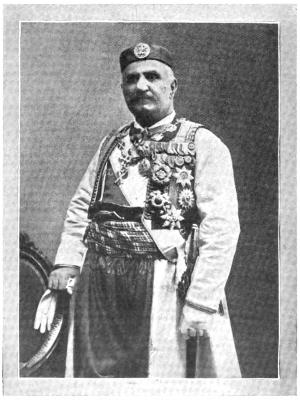
PRINCE NICHOLAS OF MONTENEGRO—THE CONSPIRATORS PLOTTED TO DESTROY NOT ONLY THE PRINCE, BUT THE ENTIRE ROYAL FAMILY.
From a Photograph.
Indeed, Prince Nicholas must be counted among the lucky ones of this earth. He has not only been blessed with talents and tact above those bestowed on the ordinary man, but he has also been watched over by the gods and allotted more luck than falls to the lot of most mortals. Like King Edward, he is popular wherever he goes, and he has a genius for statecraft. When he came to the throne forty years ago Montenegro was absolutely unknown; probably barely one in a hundred of educated people knew that such a place was to be found in the atlas. During those forty years the Prince has fought successful wars against the Turk, more than doubled his territory, married[231] his daughters to some of the greatest partis in Europe, and made the name Montenegro a household word for valiant men and deeds of daring.
But Prince Nicholas, unluckily for himself, married his eldest daughter to a certain Prince Peter Karageorgevitch. This lady died many years ago, and in the course of time Prince Peter was called from his haunts in Switzerland to take the Crown of Servia from the hands of the regicides. Whether he knew anything of their evil plans beforehand need not be discussed here; but, at any rate, ever since the day he entered Belgrade he has been their tool, and as wax in the hands of the ringleaders. Nevertheless, people were astonished when it was discovered last October that bombs were being smuggled over the Turkish frontier, coming from Servia. A plot was discovered to blow up the whole of the Montenegrin Royal House—not only the Prince and his two sons, but the Princess and her two daughters, her daughters-in-law, and even the poor little grandchildren, so that the entire family might be exterminated root and branch!
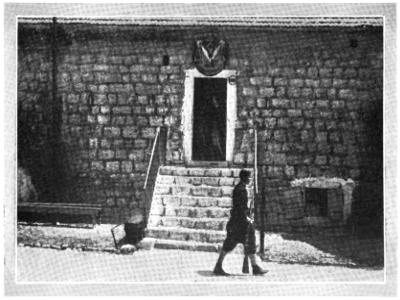
THE EXTERIOR OF THE COURT-HOUSE, SHOWING SENTINEL ON GUARD.
From a Photograph.
The affair was engineered in Belgrade, and the bombs were manufactured by a Servian officer at the State Arsenal of Kragujevats. It was also rumoured by those who might be expected to know that the dreams of the blood-stained authorities in Belgrade are to unite Montenegro, a Slav nation speaking the Servian language, with Servia, and the idea was that if there were no member of the House of Petrovitch left alive the throne might possibly fall to the share of a Prince Karageorgevitch, one of the sons of Prince Nicholas’s eldest daughter.
The Crown Prince George of Servia is not exactly one’s ideal of a model ruler. This young gentleman, whose hobby is said to be to bury cats in the ground up to their necks and then stamp them to death, is more one’s idea of a youthful Nero or Caligula, and Heaven help the nation delivered over to his tender mercies. Before the trial, however, rumours were all that one heard; so everyone was on tiptoe with expectation, wondering what sensational revelations would come to light.
By great good luck we happened to arrive in Montenegro just a week before the trial began.[232] We steamed in one of the excellent boats of the Austrian Lloyd past the grey mountains of Istria and through the wonderful fjords of the Bocche di Cattaro till we cast anchor under the peak of Lovcen. In a victoria drawn by two tough little Dalmatian horses we climbed the mountain side in zigzags, persevering up the vast rocky wall till we found ourselves some four thousand feet above the sea below. I have neither time nor words to describe the view, a task which needs the pen of a poet like Prince Nicholas himself, but must dash on, like our game little horses, to Cetinje, down the steep sides of silver mountains, which gleam in the tropical sun without a vestige of green to relieve their Quaker-like hues.
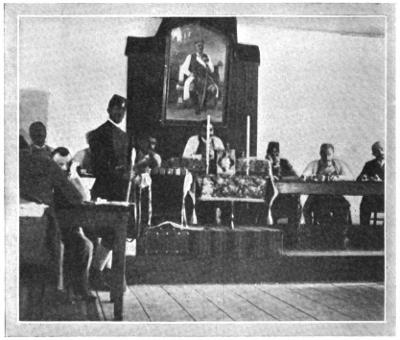
THE JUDGES IN THEIR GORGEOUS NATIONAL COSTUMES—TO THE RIGHT OF THE SOLDIER WILL BE SEEN THE BOMBS WHICH WERE AN IMPORTANT “EXHIBIT” IN THE TRIAL.
From a Photograph.
As a town Cetinje is not thrilling, but it lies in a lovely neighbourhood and is peopled with perhaps the most picturesque race in the world. For the Montenegrins are not only the most magnificent specimens of humanity in point of size, clad in gorgeous raiment which, I feel sure, Solomon in all his glory could not have beaten, but they have behind them a past which can scarcely be beaten by any fighting race on earth.
Some five hundred years ago the Turks defeated all South-Eastern Europe in the Battle of Kossovo, and Servia and Bulgaria entirely, and Roumania to a certain extent, fell under the sway of the Ottomans. Then, the story goes, the bravest and the noblest of those lands, disdaining to live beneath the banner of the Crescent, withdrew to the eyries of the Black Mountains, where, thanks partly to their valour and partly to the favourable position of the land (which is a natural fortress), they defied the Turks. They never intermarried with the inferior races, and so have preserved the magnificent physique and extraordinary distinction of bearing which strikes every stranger who visits Tsernagora. Indeed, if it comes to a question as to who should be the dominant race in Servia and Montenegro, it seems more fit[233] that Servia should be taken under the wing of a race which has done deeds all these centuries instead of merely talking.
We found at the hotel that half the newspapers of the Near East and Vienna were sending correspondents, and we therefore felt ourselves lucky in getting a room in the front looking down the main street, where everything in Cetinje happens, and where, towards sundown, when the siesta is over and the air becomes cool and pleasant, you may find anyone you want to see. Half-way down we saw a crowd of people in national costume (for in Cetinje, thanks to the Prince’s influence, it is universally worn) standing outside a house. “They are waiting to try and get a seat in court to-morrow,” I was told, “but only a score or so will succeed, for there are thirty-two prisoners, each one guarded by a soldier, besides all these journalists to be made room for.”
Through the good offices of the Prince’s secretary, to whom His Highness had confided us, we were provided with tickets, which was lucky for us, for when we arrived within sight of the court-house we found a cordon of soldiers guarding it. We were stopped and our passes examined before we were allowed to proceed. When we reached our destination, a long, low, grey stone building with the Montenegrin two-headed eagle over the door, an officer took us in hand and led us with ceremony to our places. I looked round me with great satisfaction from my red velvet arm-chair in the ranks of the Diplomatic Corps. Not only was I the only English person there save one, but I was the only woman in the whole place.
It was the most thrilling trial I have ever witnessed. At the top of the room, behind a long table beneath the picture of Prince Nicholas, sat the nine judges, all save one in the most gorgeous national costume: long coats of pale green cloth, heavily braided, with waistcoats of vivid carnation red, crossing over to one side and covered with beautiful gold embroidery. Baggy breeches of ultramarine blue and smart top-boots continued the gay effect, which was completed by a bulky sash of striped and gold silk wound round the waist, and containing an assortment of daggers and revolvers; for a good Montenegrin would as soon think of coming out without them as an Englishman without his collar.
In the middle sat the President, a person of extreme distinction and great dignity, who conducted the proceedings in an irreproachable manner. A small table stood before him, on which a pair of high tapers were placed, and between them was a copy of the Gospels, bound in red velvet and gold metal-work, and a crucifix. On his left hand sat a Mohammedan judge, with red Turkish fez and simpler costume than that of the Montenegrins; and on his right the bombs were all set out on a little table as evidence, guarded by an immense soldier about six-foot-six in height and of a forbidding aspect. It gave one a certain creepy sensation to see, only a few feet away, enough of these infernal machines to send the whole of the court-house into the clouds, and to know that close by were thirty-two desperate men who would stick at no kind of devilry. The bombs were little square flasks of grey metal with screw tops, almost like the fittings of a common dressing-bag or luncheon hamper, and certainly did not betray by their appearance what terrible things they really were. For these particular bombs were manufactured in a very ingenious fashion, and were enough to make an Anarchist tear his hair with envy. At the foot of the table was the black bag in which the infernal machines had been smuggled over the frontier.
A story is told of the conspirator’s journey which brings a touch of comedy into the affair. When he passed through Austria he had the bag registered as luggage, for it was so heavy that he feared it might attract attention if placed in the rack. A mistake was made by the clerk and he was overcharged. The honest official discovered his mistake directly the train started, and telegraphed off to the junction to describe the man, giving orders that the money should be refunded. At the junction the conspirator was found, and the station-master came up to him to inquire if he had not registered a black bag. Overcome with terror and dismay, and thinking he was discovered, the man seized the bag and bolted, leaving the official greatly perturbed and convinced that he had to do with a madman.
The court-house itself was long, low, and white, with a blue ceiling and a boarded floor. A long table ran half-way down either side of the hall to accommodate the journalists, and half-a-dozen arm-chairs were arranged in a good position for the diplomatists. These were almost empty on the first day, and my next-door neighbour, a polite young Turkish attaché, considerately moved out of the way whenever he saw that I was trying to take a photograph. And, indeed, it was not the easiest task in the world to get pictures of the proceedings. The prisoners were a restless set of people, who fidgeted, sprang constantly to their feet, and interrupted the speakers in a very tantalizing way. As there was not very much light a fairly long exposure had to be given, and there were difficulties in propping the camera up satisfactorily and also in disguising my intentions as[234] much as possible. However, I had the satisfaction of knowing that mine were the only photographs taken, for the local photographer who had been commissioned by the authorities to take some pictures declined to try, owing to the obstacles.
The thirty-two prisoners, guarded by soldiers on either side, occupied benches all down the centre of the hall. Some of them were in European dress, thus differing from the majority of Montenegrins. Amongst them were all sorts and conditions of men, from peasants to ex-Ministers of the Crown. It is not often one finds a former Prime Minister, four ex-Ministers, three high State officials, and several Deputies all in one trial for high treason. As a rule, the accused were puny, furtive-looking striplings, a contrast to their stalwart compatriots; but their imprisonment of several months may have had something to do with this. Many were students who had gone to Belgrade to complete their studies and had there imbibed Anarchistic and revolutionary principles. The judge showed great tact and firmness in dealing with them.
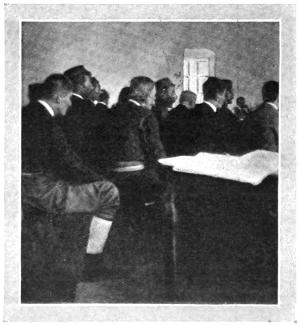
THE CONSPIRATORS LISTENING TO THE READING OF THE INDICTMENT.
From a Photograph.
As the long indictment which contained all the particulars of the plot was being read out by the counsel for the Crown—a handsome man in full Montenegrin costume—first one prisoner and then another started from his seat, rudely interrupting and violently contradicting. A clamour then arose from the whole thirty-two. The judge expostulated, begged them to be reasonable, and finally touched a silver hand-bell. The soldiers pulled them down to their seats again, but seemed as gentle in their methods as policemen with Suffragettes. As names were mentioned now and again in the indictment, exclamations of derision and protest were heard from the prisoners. They next complained bitterly that they had no note-books or pencils with which to take down the points and prepare their defence, whereupon the President ordered that paper and pencils should be brought to them at once. The indictment was long, and it finally asked for the death penalty as punishment. At this loud clamours arose, and the excitement grew so intense that a nervous feeling communicated itself to the public. The President by this time despaired of keeping order, and directed that the prisoners should be taken back to their prisons. One alone remained, Raikovitch, the man who brought the bombs into Montenegro, and the principal prisoner.
Raikovitch was a rather good-looking young man, dark and sallow. He had a large, round nose, a round chin, and even his forehead seemed to bulge. But his black, beady eyes struck me as shifty, and he appeared somewhat ill at ease. In spite of his confident manner he would glance round at the pressmen’s table every few seconds to note what effect his defence was having on them. But he had an amazing fluency, and his story flowed on like a river. There was no bullying by Public Prosecutor or judges.
Every now and then the President, tapping his fingers with a pencil, would interrupt the prisoner with a short, sharp question, evidently very much to the point, and he pulled up the prisoner’s counsel very sharply on one occasion for attempting to prompt his client. Presently there was a small stir, for Raikovitch was heard to denounce Vukotic, the nephew of Princess Milena, Prince Nicholas’s wife, as having been in communication with and paid by the conspirators. No one seemed to know who would be accused next, and the Servian Minister, who was present, must have experienced feelings of uneasiness. Raikovitch was next led to the table to examine the black bag, to identify it as his[235] luggage, and acknowledged that those were the bombs he had brought into the country. His defence lasted for the rest of the day.
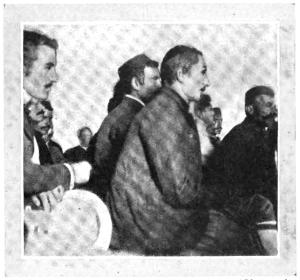
SOME OF THE AUDIENCE.
From a Photograph.
Next morning, when the prisoners were brought back, the sitting was even more agitated. The ex-Deputy Chulavitch was accused. He leapt to his feet, and in a voice of thunder shouted that he had been betrayed—he had been sold! Later on, however, he acknowledged that he had received thirteen napoleons for his help in the plot. Various other prisoners were accused, but all had answers and excuses at first. Some said they acted on behalf of others. Others said they had taken no active part, but had only known of the conspiracy. They would confess one day, and the next flatly deny everything they had said before. Later on in the trial, however, they found means of communicating with each other, and arranged on a line of common action.
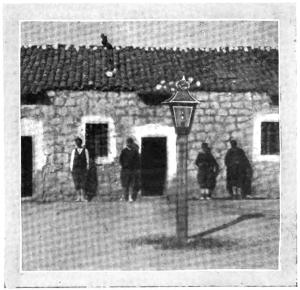
INSIDE THE PRISON AT CETINJE—THE CELL DOORS ARE GENERALLY OPEN AND THE PRISONERS ARE ALLOWED TO TAKE EXERCISE IN THE YARD.
From a Photograph.
Few documents could be produced in evidence against the accused, but a great sensation was caused by the reading of a letter from a Montenegrin, now an officer in the Servian army, to his brother. In it he promised both moral and material support for the plot and enclosed a thousand francs from King Peter. At this there was profound silence in the court, and a deep impression was left on the minds of the public.
A student named Voivoditch then gave the details of the plot. He had brought bombs from Belgrade with the express intention of killing Prince Nicholas and Prince Mirko. It was arranged that various Government offices were to be set on fire and in the confusion bombs were to be thrown against the palace, a small building which would be easily destroyed. Then, acting on the lines of the Servian regicides, the Ministers and principal people in Cetinje were to be assassinated and their houses wrecked.
The trial lasted several weeks, for with fifty persons accused and thirty-two prisoners to examine and hear, things cannot be done in a moment. But the principal witness against the prisoners was a certain Nastitch, a Servian journalist from Serajevo. He brought the gravest charges against the Servian Government. As he had been present at the manufacture of the bombs he said that he was entitled to speak with some authority. Last year he was sent to Kragujevats State Arsenal by a Captain Nenadovitch, cousin of King Peter, who gave him a letter to the Commander from the Servian Crown Prince. In this letter the Prince begged the Commander to allow Nastitch to stay ten days in the arsenal whilst the bombs were being made. They[236] were then given to him to be consigned to Captain Nenadovitch in Belgrade, who told him that they were to be employed in a patriotic enterprise. A little later he was informed that the police had sequestrated the bombs, as Pasitch, the Prime Minister, had been informed of his stay in Kragujevats.
Nastitch then began to perceive that some mischief was being hatched, and that Nenadovitch was trying to throw dust into his eyes. He put two and two together and got a shrewd suspicion of what was really up. So he crossed over to Semlin, in Hungary, from Belgrade, as no letters are safe from being opened by the Servian secret police, and communicated with Tomanovitch, Prime Minister of Montenegro. He asserted that he did not fear denials, since he had documents to prove the truth of what he said. He next produced specifications of the bombs, and then asked the judges to have those in their possession examined to see whether they were not identical. At the conclusion of his evidence Nastitch was applauded loudly by the public, and was cheered as he left the court.
There were several rather interesting little touches in the evidence of other prisoners. One was found to be sending secret messages to a friend written in microscopic handwriting under the postage-stamps of the letter. Under one was written: “Is it true that Stevo has confessed everything?” Stevo being Raikovitch.
Raikovitch was brought up a second time and confronted with various prisoners, who accused him of inventing the whole plot. He met every accusation with complete calm and cynicism. Indeed, it seemed impossible to disturb his sang-froid. He proclaimed aloud that he would laugh even when climbing the steps of the gallows. He was the type of the complete poseur, considering himself the centre of attraction, choosing his language with the utmost care, and throwing himself into appropriate attitudes. When asked if he was not a Socialist, he replied, “Of course I am a Socialist. I must confess, however, that I am not absolutely sure what Socialism is!”
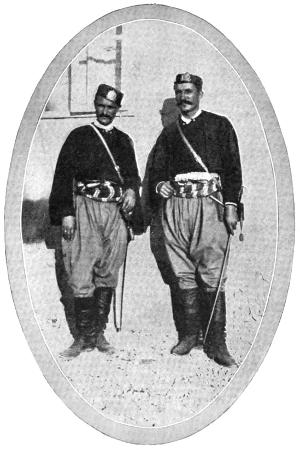
THE GOVERNOR OF THE PRISON (ON RIGHT) AND A MONTENEGRIN.
From a Photograph.
The ex-Prime Minister, Radovitch, was the most interesting of the villains, and was quite a story-book scoundrel. He had enjoyed the favour of the Prince, and had been Court Chamberlain for some years. It was expected that he would make a favourable impression on the public, for when he had come back from Paris to deliver himself up, arriving dramatically the very morning of the opening of the trial, he had been cheered all along the streets of Cetinje, and flowers had been thrown at his feet; but in court he cut a sorry figure indeed. For six weary hours he spoke unceasingly, and all the time about himself only! According to his own version he is the cleverest, the most capable of Montenegrins—in a word, he is the only patriot in the land. He alluded contemptuously to the judges, and cried theatrically to the President: “I am proud and happy to stand before you as defendant, for I would not change[237] places with you, my Lord President!” He boasted of the Prince’s affection for him and openly betrayed that he expected to be let off easily.
The trial lasted over a month. This is no joke in a sweltering Montenegrin summer, and both judges and prisoners must have heaved sighs of relief when every witness was heard and the suspense was nearly over. Six were condemned to death, but only two of these, Chulavitch and Voivoditch, were in custody; the others had escaped abroad. Raikovitch and the Minister Radovitch were sentenced to fifteen years’ imprisonment. Thirteen others received sentences varying from two to ten years, and several were discharged either because they were innocent or from lack of proof.
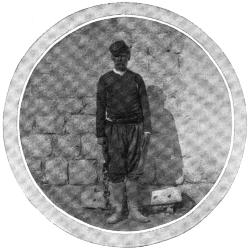
A WARDER, WITH THE HEAVY CHAINS AND ANKLET WORN BY PRISONERS.
From a Photograph.
I was interested in visiting the prisons of Cetinje and Podgoritza. Both are very small, which speaks well for the state of the country. Few murders are committed, and these are rarely for gain, but usually acts of revenge. The men concerned in the plot were confined at Cetinje, in a small and somewhat primitive building, but when they had been sentenced they were removed to Podgoritza. Both prisons are built round a courtyard in which exercise can be taken, for the doors of the light and roomy cells were open all day long. Nearly every cell contained an oven, and the prisoners were allowed to cook their food themselves. The daily rations consisted of two pounds of bread and the sum of fourpence, with which they could buy what they liked.
I was taken over the place by the Governor, a very kindly-looking giant, who seemed as if he could not hurt a fly. If I am ever unlucky enough to be put under lock and key, I should like to have a jailer just like him. He and a Montenegrin officer, who spoke most excellent French, were very kind in helping me to take photographs. Some of the prisoners wore irons which I rather wanted to photograph, but they thought it might hurt the men’s feelings, so they offered to lend me a jailer to be manacled and snap-shotted. He thought it the greatest joke in the world, and quite entered into the spirit of it all. Just as I was about to press the button he gesticulated wildly. He had remembered that there was a little collection of a dozen or so weapons of warfare in his capacious belt, and these were not at all in keeping with the irons. So he pulled out daggers and pistols galore, and looked quite thin by the time he had finished.
We also visited the prison at Podgoritza, a large town some forty miles from Cetinje. Here we found a strange collection of men and women. There was a saintly-looking pope, who had appropriated the funds of his church. He was dressed in priest’s robes and did the honours of the place. We saw several convicts who were being kept in solitary confinement, and pushed cigarettes to them between the bars. They seemed to feel the boredom most; otherwise they have an easy time. They do little work in summer and still less in winter, and a great part, of the day is spent in sleep. The cells looked far more comfortable than barrack-rooms, and prisoners in Montenegro evidently have little to complain of.
There were ten or twelve women there. These were nearly all guilty of infanticide. When I came into their quarters they rushed at me, seized my hands and kissed them, and tried to make me sit down and talk to them. But, as I could not understand a word they said, and one of them looked very mad, I made my escape as soon as possible.
It will be long before I forget that strange trial, which for spectacular effect might have taken place in Venice in the magnificent Middle Ages. The splendid figures of the judges rivalled the signori in all their glory, and the gigantic soldiery in gay and glowing colour made one almost forget the prisoners, until their primitive, almost savage, behaviour reminded one of their existence and of the fact that even nowadays in Europe things happen that eclipse the achievements of mediæval criminals.
By J. T. Newnham-Williams, of Salisbury, Mashonaland.
A trader’s story of the appalling catastrophe which, almost in the twinkling of an eye, wiped out the fruits of a lengthy and arduous expedition and cost him the lives of two faithful “boys.”

It was about the end of October, 1902, when I was returning from a trading and hunting expedition which had taken me into the wild bush-country lying to the north-west of the Limpopo valley, that the following incident occurred—an incident which neither myself nor any of the “boys” who accompanied me are ever likely to forget. I had started out from Pietersburg, in the Transvaal, about five months before, taking with me a good “salted” horse, a wagon and sixteen oxen, and half-a-dozen boys. I had loaded up with a good deal of the usual trading gear, and had made a very successful trip.
It was always my rule, on returning from these expeditions, to shoot the whole of my way back, and I arranged my departure from civilization so that I could get through with my trading in good time and have the game season well in hand on the home trek.
The rains had commenced rather earlier than usual, and, although we had only had a few showers as yet, I felt that there was not much time to lose if I wished to get back to Pietersburg before they had fairly set in. I had started out in the morning from a little native village called M’Sablai, and meant to push on through the day in order to get to a native “staad” called Wegdraai, which lay on the opposite side of the Limpopo River, better known as the Crocodile. Everything went well during the day, and towards five o’clock in the afternoon I sighted the group of kopjes by which Wegdraai was surrounded. Telling the boys to make all possible haste and follow me, I spurred my horse and rode forward to find a suitable ford.
The river at this point is about a quarter of a mile in width, and in the dry season is very shallow, the water usually lying about in pools. It presents a very pretty appearance at this time of the year, being dotted with innumerable verdure-clad islands. I did not anticipate much trouble in crossing, and, on reaching the bank, soon selected a suitable spot. There was rather more water than usual, but this was only to be expected, as it had been raining a little the day before.
Having picked out the ford, I watered my horse and rode slowly back to meet the wagon. When it came in sight, creaking and rumbling, I dismounted and, throwing the reins over the horse’s head, sat down and lit my pipe whilst waiting for it to come up. I had been smoking for a few minutes, thinking of nothing in particular, when my attention was attracted by a curious murmuring sound, very faint and far away; it sounded like the roar of a train travelling at a high speed.
I glanced uneasily towards the river, but as far as the eye could reach it looked peaceful enough. I knew the sound only too well, however—it was the noise of flood-water coming down stream. When the wagon arrived, my head boy, Jim, called my attention to the murmur, at the same time advising me not to attempt to get across. I had half a mind to follow his advice and outspan then and there, but it occurred to me that the river might remain “up” for several days, and then, if more rain came, I should not be able to get across for weeks. It seemed to me to be a case of getting across at once or waiting for an indefinite period.
We were moving steadily forward all the time, and when we came to the river-bank I noticed that by this time the water was looking slightly disturbed, little swirling eddies being plainly visible about half-way across. I looked doubtfully up the river, which here ran nearly straight for about a mile, but, seeing nothing of the wall of water which usually comes down when a river is rising in flood, I threw prudence to the winds and determined to get across. Tying my horse to the rear of the wagon, and shouting to the boys to look after the brake, I seized the long whip which the driver was carrying, and, making it whistle around the ears of the oxen, urged them down the bank. I could see that the boys were scared—they knew the treacherous nature of the river only too well—but I thought that we could gain the opposite bank long before the water reached us.
Urged on by wild yells and shrieks, such as only a Kaffir wagon-boy can utter, the team moved slowly on through the river-bed, and in a very short time were half-way across. It was then that I observed for the first time that the water was slowly rising, and, looking backward, I saw that what had been a dry place a few seconds before was now entirely covered. Glancing down, I saw that the water beneath us, motionless a moment ago, was now slowly running. Alarmed, we redoubled our efforts,[239] but without avail. The oxen moved slower and slower as the water increased in volume and depth, until, the wagon listing slightly in a small hole, they stopped altogether.
I could see there was nothing for it now but to cut loose the oxen and abandon the wagon, so, shouting to the boys to assist me, I loosened the trek chain and tried to whip the oxen across. By this time, however, the poor beasts had scented their danger, and lowing piteously they huddled together and became hopelessly entangled in the long chain. Jim, whipping out his hunting-knife, shouted, “Sicca, baas, sicca lo n’tambo” (“Cut the reins”), and immediately began slashing at the reins which bound the yokes to the oxen. I saw that it was the only thing to do, and promptly followed suit. We were just then quite close to one of the larger of the islands which stood well out of the water, and as the leading oxen were freed they made for this.
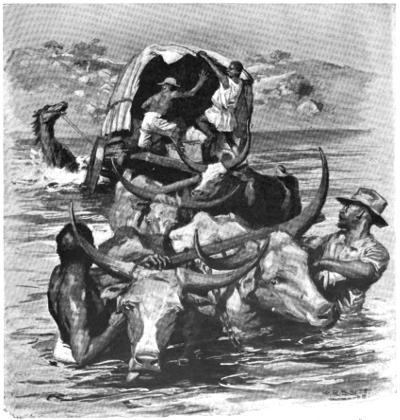
“I SUDDENLY HEARD A WILD SNORT, FOLLOWED BY AN AGONIZED SCREAM FROM THE REAR OF THE WAGON.”
We had cut most of them loose and the water had risen above our waists, when I suddenly heard a wild snort, followed by an agonized scream from the rear of the wagon, and the next moment my horse was down, and three of the boys, with yells of terror, were making for the island. “Hurry up, baas,” remarked Jim,[240] coolly; “lo ingwania” (crocodiles). As he spoke there was a huge splash alongside me, and down went one of the oxen, the water round us turning a sickening red.
I must confess that at that moment I lost heart completely, and shouting to the other two boys, who had climbed on to the wagon, to make for the island, I grabbed Jim by the arm and literally had to drag him away, the brave fellow wanting to remain and loosen the remainder of the oxen. We reached the land in safety, and, turning to look for the other two boys, saw that they were still on the wagon, being afraid to venture into the momentarily-deepening water. I shouted to them to come away, but without avail. Just then Jim touched me on the shoulder and pointed up the river. Looking in the direction indicated, I beheld a line of foam stretching from bank to bank, and coming towards us like an express train. The two boys on the wagon also saw it, and one of them plunged off into the water, which was now running swiftly, and in a few seconds was carried down to us, Jim catching hold of him and hauling him up on to the higher ground. There was not a moment to spare, for we could plainly see that the onrushing water would overwhelm us where we now stood.
Yelling to the boys to follow my example, I made a rush for a good-sized tree which stood on the summit of the island—now looking little more than a large mound. Getting a lift from Jim, I was soon in its topmost branches. Three of the boys were already perched in trees, but the fourth, the boy who had swum from the wagon, not having recovered his wind, was clinging helplessly round a tree-trunk, too exhausted to pull himself up. Noticing his predicament, Jim rushed across and, giving him a shove, sent him up on to the lower branches. The water was now almost upon us, and I shouted to Jim to follow the boy up the tree, but my voice was drowned by the roar of the flood. He ran towards me, then hesitated, glanced round, and saw the roaring wall of water within about fifty yards of him. The sight seemed to paralyze him for a moment; then, with a spring, he reached a small tree which was within a few yards of him, and, clambering like a monkey, reached the top just as the water struck the wagon. The heavy vehicle was picked up in the swirling tide as though it had been a straw, the boy Zuzi clinging to the top until it was nearly abreast with us. Then it rolled over and over, and he disappeared from view, never to be seen again.
I had scarcely had time to realize that the boy was gone when I noticed that the remainder of the oxen which had been standing beneath us were adrift. The poor beasts swam desperately, but it was no use—they were carried away like flies on the raging torrent.
Darkness was now falling fast, and the water had completely covered the island, while the trees were swaying in a manner which brought my heart into my mouth; I expected every moment to see them torn out by the roots. What made matters worse was that pieces of timber, uprooted trees, etc., coming down-stream at racing pace, would strike the trunks of the trees we were sheltered in with terrific force, and the smaller trees were one by one uprooted and carried away in this manner.
I clung desperately to my perch for about two hours, expecting every moment that my frail support would give way. By that time it was pitch-dark, and, feeling cold and stiff in my wet clothes, I shifted my position a little; I could see nothing of the boys in the darkness, and shouting brought me no answer. I moved about as carefully as possible, seeking a better position, and at length found a more comfortable place in a fork a little lower down. Here—cold, wet, and miserable—I could do nothing but wait for daylight. I had now lost everything I possessed, my wagon and oxen representing nearly the whole of my capital. I felt deeply for the loss of the poor boy Zuzi and my faithful old horse, and would willingly have sacrificed the wagon and oxen could I have saved these two. I blamed myself bitterly for having made the foolhardy attempt to cross, and with these and other equally bitter reflections the long hours of darkness dragged slowly through. When, after what had seemed ages, the first faint streaks of dawn appeared, I uttered a prayer of thankfulness; and as the daylight became clearer and surrounding objects visible, I looked anxiously round to see how my boys were faring.
I first caught sight of the three boys who had escaped when the crocodiles pulled my horse down, and a little farther on I saw Pete, who had been helped up by Jim, but of Jim himself I could see no trace. Trembling with horror, I began to realize that he had gone. The flood had by now practically spent itself, and the top of the island was again visible. I called out to the three boys who were nearest the spot where Jim’s tree had been, and, in a voice which I could scarcely recognise as my own, asked them where Jim was. Their answer only confirmed my worst fears.
“Jim hambili, baas, blakla futi” (“Jim gone, master, tree and all”).
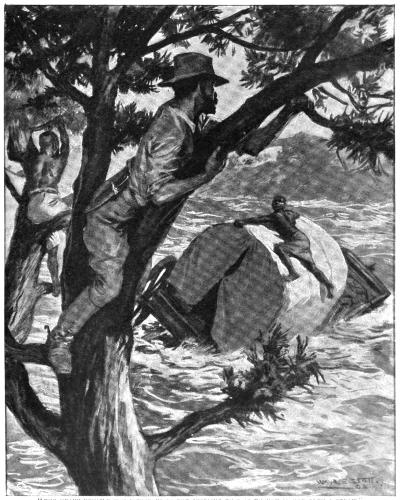
“THE HEAVY VEHICLE WAS PICKED UP IN THE SWIRLING TIDE AS THOUGH IT HAD BEEN A STRAW.”
This was the worst blow of all, for Jim, though only a raw native when I had first got him, had been with me for over five years and was deeply[241] attached to me. Bitterly I cursed my folly in not taking his advice, trying to console myself with the reflection that he might somehow have managed to reach the opposite bank, though in my inmost soul I knew this to be almost an impossibility, as the river was full of crocodiles, who lurked on the lower side of all the small islands, awaiting their opportunity to rush out and seize anybody or anything that might be carried past them by the water. The water was now going down slowly but surely; and, as it sank, our little island grew larger and larger. It must have been about nine o’clock when I climbed down out of the tree and stretched my stiffened limbs once again. I called the boys down, and they came gladly, but all the time casting anxious glances around them, fearful of a visit from the crocodiles again. I did not apprehend much danger from these brutes now, however, as those in the[242] immediate vicinity would probably have gone farther down the river after the cattle.
The morning passed slowly away and I began to feel hungry, but there was nothing to eat. About eleven o’clock some natives came down to the river-bank from the “staad” on the opposite side, and shouted to us to remain where we were until the afternoon; the river, they thought, would have gone down sufficiently by that time to enable us to make an attempt to reach the mainland. The sun had dried the greater part of the island by this time, and, telling one of the boys to keep a look-out, I lay down under a tree and was soon fast asleep. I slept on until about four o’clock, when a boy awakened me, and, glancing round, I saw that the water had gone down enough to warrant our making an attempt to get across. The natives who had been on the bank in the morning had meanwhile returned, and were gesticulating and shouting to us to come away. The boys, whilst I had been asleep, had made a long strip of “n’tambo” (rope) from the bark of the trees, and, fastening this around my waist, I secured the others to it, each boy being as far from the next as the length of the rope would permit. Then, with myself leading, we started off. The current was still very strong, and, had we not been roped together, would undoubtedly have carried us off our feet. We could stand all right in the shallower places, but when I came to a strip of deep water the boys let out the rope until I had got over, then I in turn would pull them over. In this manner we finally reached the bank and were helped out by the natives from the “staad.” After resting a little I accompanied them to their kraal, where my boys were fed and rested.
Learning from the headman that he had already sent a number of men down the river-bank in search of anything that might have been washed up, I partook of a little mealie meal, which was the best he could offer, and, having washed it down with copious draughts of new milk, lay down on a bundle of skins and once more fell asleep, being utterly exhausted by the previous night’s hardship and the struggle we had made to get out of the river.
I must have been asleep several hours when I was awakened by a light touch, and, sitting up, saw the headman, who explained that his boys had returned, having found several cases of provisions, etc., and asked me if I would not like some food. I made a good meal and once more retired to rest, sleeping soundly until sunrise the following morning. Rising early, I sent a number of men to search the river-banks whilst I was having my breakfast, telling them that I would follow later. They had been gone about an hour, and I was preparing to follow them, when one of my own boys came running towards me from the direction of the river, breathlessly informing me that they had found Jim, and that he was alive, but had been badly mauled about by a crocodile. I immediately started off at a run, the boy leading the way through the bush to a spot where the river turned off to the left, about a mile farther down. There, under a tree, surrounded by half-a-dozen natives, lay Jim. He was in a fearful plight, one arm being almost eaten away and the whole side of his body mangled in an awful manner; he was still conscious, however, and recognised me immediately. I at once set to work to construct a kind of litter with branches and boughs, and, laying him carefully on it, ordered the boys to carry him back to the kraal. As they were moving off I asked one of the natives where they had found him. Pointing to what at first sight looked like a large hole in the ground, the boy answered, “Lapa, baas, hya ka lo ingwania” (“Here, mas’er, in the crocodile’s house”). I approached the place and, looking down the hole, was astonished to see a large chamber beneath and a small tunnel which seemed to lead down to the water. The ground forming the roof of the chamber had been worn away a good deal, and the crocodile, in turning round in the hole with his victim, had evidently broken the crust above, thus exposing his hiding-place.
I followed the boys back to the kraal, and pulling poor Jim in a hut carefully washed his wounds, doing all I could for him. He remained conscious the whole morning and told me that during the night, whilst he was on the island, his tree, which was not a very strong one, had been struck several times by floating driftwood. Towards midnight, as near as he could remember, a heavier log than usual had crashed into it, carrying it away completely. He had clung desperately to the branches in the hope of reaching the bank when he got to the curve in the river, and had managed to keep himself above water until he found himself floating in a place where the water was smoother and running less rapidly. Divining that he must be near one of the banks, he tried to reach it by swimming, but had only made a few strokes when he suddenly felt himself seized by one arm, and was immediately dragged under the water. He had just had time to realize that it was a crocodile which had got him when he lost consciousness. When he recovered his senses again he found himself in a hole, lying on dry ground, with the sunlight streaming in through a small opening above. There was no sign of the crocodile, and suffering agonies from his wounds he managed to drag himself up to the orifice,[243] where he at last gut out his hunting-knife, which still hung on to his belt, and, digging at the edges of the cavity, tried to enlarge it so that he could crawl through. Weakness overcame him, however, and he fainted again. At last, hearing voices above him, he once more tried to get out, and, managing to put his uninjured arm up through the hole, had attracted the attention of the boys, who were searching near.
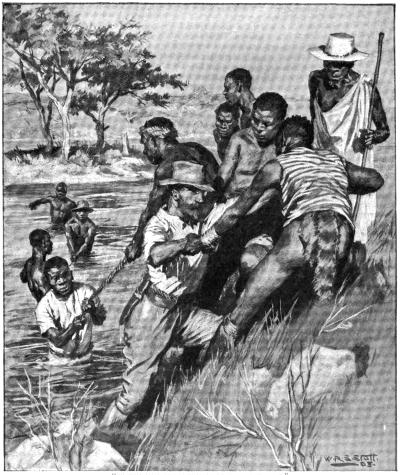
“IN THIS MANNER WE FINALLY REACHED THE BANK.”
I could plainly see that the poor fellow was past all hope, but I did all I could to ease his last moments for him. In the afternoon he became unconscious again, and at about five o’clock passed quietly away. I buried him under a large tree, near the entrance to the circle of small kopjes by which the “staad” was surrounded, and, cutting a small wooden cross, nailed it to the tree, with the simple inscription, “Jim. 21-10-’02.”
Next day, sad at heart, I started off to Pietersburg, having to walk the whole way. Here I reported the matter to the police, who sent out a patrol to investigate the affair, and there the matter ended so far as I was concerned. I never recovered any of the oxen, and the wagon, or the remains of it, so far as I am aware, still lies in the river-bed. I have never done any trading in that district since.
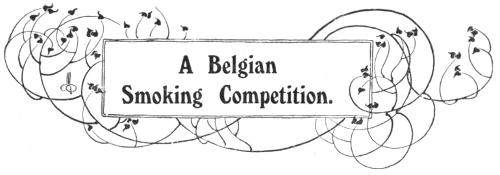
By A. Pitcairn-Knowles.
There is more tobacco per head consumed in Belgium than in any other country in the world. It is therefore fitting, perhaps, that one of the favourite pastimes of the menfolk should be smoking competitions, at which valuable prizes are awarded to the man who can make his pipeful of tobacco last the longest. Our representative was recently the guest of honour at a competition held by the premier smokers’ club of Belgium, and here describes and illustrates what he saw.
BRUGSCHE ROOKERSCLUB.
Honoured Sir and Member,—Once more an honour is being bestowed upon us. Mr. A. Pitcairn-Knowles, the representative of three journals of world-wide reputation, will be present at our general meeting on Friday next, and will give an account of this gathering in one or perhaps in all of those papers. We have, therefore, decided to commence the meeting at an earlier hour. We shall assemble at 8.30 p.m., and open the entertainment with a grand prize competition, and we urgently beg you to put in an appearance, as the reputation of our club depends to a great extent upon the success of the fête. As true smokers you should look upon it as your duty to join us at 8.30 p.m. sharp, on Friday, the 11th inst. Accept, honoured Sir and Member, the greetings of your devoted committee.—(For the President) The Second Secretary, L. Monballiu.
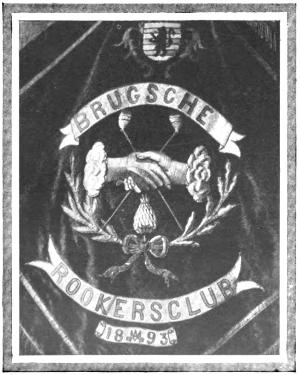
THE GORGEOUS BANNER OF THE BRUGES SMOKING CLUB.
From a Photograph.

Such were the contents of a printed notice in Flemish sent out to all members of the Bruges Smoking Club, as a result of my expressing a desire to the indefatigable secretary of this most famous of all Belgian “Rookersclubs” to witness one of their quaint smokers’ competitions.
I am glad to be able to state that the invitation issued to the Bruges devotees of the fragrant weed had the desired effect, and when I reached the cosy Graenenburg Estaminet of the Grande Place I found the obliging secretary and the genial president of the Smokers’ Club preparing for a record attendance, which, judging from the number already present, seemed assured. My introduction to the assembly was looked upon as needless, since everyone present was acquainted with the reason for my admission within the precincts of the club, and the most strenuous efforts were made to render my visit to the Graenenburg an agreeable one.
In response to the invitation of the secretary, I ascended a steep staircase[245] leading from the café to a room reserved for the club. It was there that the solemn function of admitting new members took place, and general regrets were expressed that my visit had not been made upon a day which would have presented an opportunity for witnessing such a ceremony. As it was, I had to content myself with an inspection of the paten, to which, on such an occasion, the would-be member had to press his lips after taking an oath in the following words: “I pledge myself solemnly to be a faithful and honest member of the club, and to conform strictly to the rules.” Previously to installation, he had to furnish proof of his suitability for election by smoking a pipe in the presence of the committee.
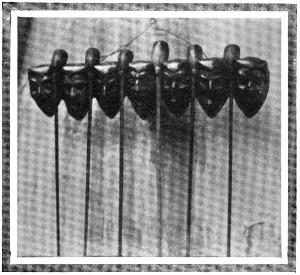
A CURIOUS AND VERY ANCIENT PIPE-RACK IN THE POSSESSION OF THE BRUGES SMOKING CLUB.
From a Photograph.
Although I had not the good fortune to be present at such an inauguration, time did not hang heavily on my hands while waiting for the smokers to prepare for the contest.
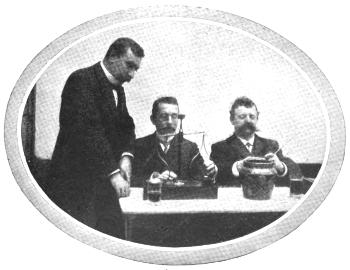
THE JUDGES WEIGHING OUT THE COMPETITORS’ ALLOWANCES OF TOBACCO AND FILLING THE PIPES.
From a Photograph.
Glancing around the room I noticed with interest a large shield adorning the wall, upon which was arranged an assortment of most curious pipes, representing all corners of the globe. In fact, the place was a veritable museum of pipes, giving silent testimony of the character and degree of culture attained, as well as[246] of the individual taste of smokers of almost every nation of the world. The lordly meerschaum, elaborately carved; the Turkish chibouque; the “hubble-bubble,” in which the fumes pass through water; the long German pipe, with its china bowl adorned with a gay picture; the Indian’s pipe of peace—all, their functions finished, now hang side by side in idle repose. A huge pipe carved from the stump of a tree and a pipe with a sea-shell for a bowl were conspicuous among the curiosities of the collection.
After my inspection of the museum the labour of deciphering the rules of the club, in Flemish, came as a less welcome task, but the secretary, always ready to be of service, aided my efforts, and I was able to discover the real objects of the association.
A casual observer might be somewhat surprised to find that a society of this kind should require numerous laws and regulations, but a glimpse at the workings behind the scenes of a Belgian “Rookersclub” furnishes convincing proof that the number of rules is in no way excessive, considering the importance of the institution, for the strictest discipline is a sine quâ non in a well-conducted “Rookersclub.”
Many are the duties of the members and the regulations for competitions. No applicant can be elected unless he has reached the age of eighteen. Cigars and cigarettes are tabooed, the pipe being looked upon as the only justifiable means of satisfying that craving which makes us slaves to the weed. The chief object of the club being to teach, through its disciples, the world at large the use of tobacco and to guard against its abuse, it wisely refrains from over-indulgence, and asks no more from its members than that they should “smoke at least one pipe at every club meeting.”
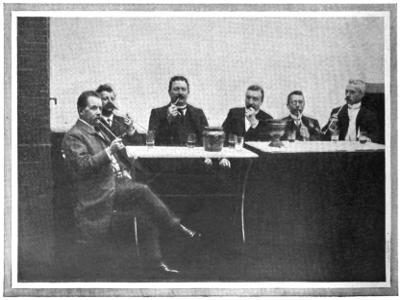
THE CONTEST IN FULL SWING.
From a Photograph.
The picture the words “smoking competition” call up to the mind’s eye of the uninitiated, of competitors sitting in a room made almost unbearable by the dense volumes of smoke they are vigorously puffing from their pipes, is as far from the reality as it is possible to imagine. When I stepped into the spick and span Café Graenenburg I was certainly under the impression that I was conversant with the science of smoking, though I must own I had up to that time been willing to accept with blind faith its dictionary definition as “a continuous drawing in and puffing out of the fumes of burning tobacco,” which is, I assume, what nine hundred and[247] ninety-nine out of a thousand of my fellow-smokers look upon as the desideratum of their enjoyment.
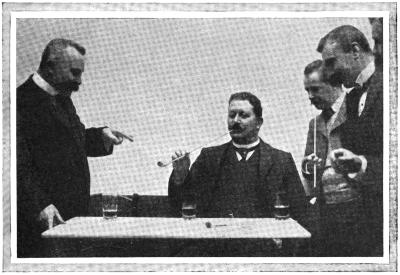
“SMOKE, PLEASE!” A COMMITTEEMAN DEMANDING PROOF THAT A COMPETITOR’S PIPE IS STILL ALIGHT.
From a Photograph.
Now, however, after half the term usually allotted for mankind’s existence upon this earth had run out, the truth dawned upon me that I had hitherto been chasing shadows, and would have to learn all over again. Smoking was, I began to realize, not the simple, easy pastime I had considered it to be, but an art which one might only expect to master after careful study, silent pondering, and steady practice. In this humble frame of mind I lost no time in repairing to an expert for instruction in the management of a pipe, so that all fatal mistakes should be avoided at the outset of my second schooling; and now that I am on the high road towards experiencing hitherto dimly-conceived moments of unalloyed bliss, let me impart my experience as a valuable secret to those who lie under the same mistaken impression which I once fostered. In the words of my preceptor: “The true art of smoking consists in reducing the combustion to a minimum, and yet never allowing the pipe to go out while a particle of tobacco remains in the bowl. The object is not to smoke quickly or much—we are not locomotives bent upon producing force, but men on the quest of solace and enjoyment.”
But now let us see the outcome of his doctrine, as displayed by the members of the “Rookersclub” on the occasion of my visit to their meeting-place.
The preliminary arrangements for the battle of pipes having been completed, I was led back to the café, where the committee were busily engaged at a table putting the finishing touches to their work. Before them lay the empty pipes, all of equal length and size. Tobacco taken out of a jar was being apportioned into little heaps to be weighed on a small pair of scales. As each competitor’s share, consisting of exactly forty-five grains, left the scales to replenish the pipe awaiting it, the eyes of the judge roved anxiously from the balance to the hands of the colleague to whom the filling of the bowls had been entrusted. Unerring fairness characterized the operations of the committee. Around another table the competitors were seated indulging in “bocks” while waiting to take part in the struggle for supremacy in serious smoking.
At last a general wave of excitement showed that the proceedings were about to begin. The pipes were placed in the hands of their claimants, the matches put within easy reach, and the president, in his capacity of judge, called for attention.
“You have two minutes in which to light your pipes!” he announced, watch in hand;[248] then, presently, “One minute!” “Half a minute!” “One quarter of a minute!” These successive announcements were followed by the ringing of a bell, and then, almost simultaneously, twenty hands holding burning matches were raised to set the pipes alight. All but one or two, whom anxiety to be in time had slightly flurried, delayed setting the match to the tobacco until the very last moment. One unfortunate competitor procrastinated too long, and was promptly disqualified before he could apply the light. No time had been wasted in removing the matches from the table, and as soon as the time-limit had been reached every one but the disappointed straggler was beginning very slowly to draw short puffs. At this critical moment, when all the rivals were applying themselves with slow caution to the initial whiffs, on which the final issue frequently depends, so complete a silence reigned that one might have heard the proverbial pin drop. It is said by many that the secret of success is found in the way of lighting, but as to which is the correct modus operandi there exists a great diversity of opinion, for while one expert will attribute his success to the fact that he lights the tobacco nearest the side of the bowl, another equally practised smoker believes in applying the match to a central spot. Be that as it may, there is no denying the fact that to ensure obtaining a satisfactory start both experience and intelligence are essential factors.
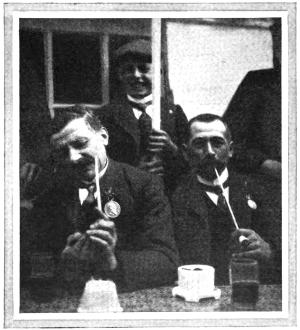
“IN DISTRESS.”
From a Photograph.
But to return to our friends of the “Rookersclub.” Ten minutes had elapsed, and all were still in the running except the disappointed man who had been ejected at the outset. Some had become quite communicative, trusting to their pipes to look after themselves while they exchanged views on politics. Others, not losing for one moment their sense of the importance of the occasion, kept the stems between their teeth, without allowing their tense expressions to relax into the faintest suspicion of a smile. One competitor in particular looked as if he were made of wax, even the chaffing of his colleagues failing to upset his gravity. He had been pointed out to me as a winner of many prizes and the fortunate possessor of a temperament any smoker might envy.
“Ting-a-ling” went the bell, the announcement of the extinction of a pipe—the first defeat—and this early failure was received with general merriment.
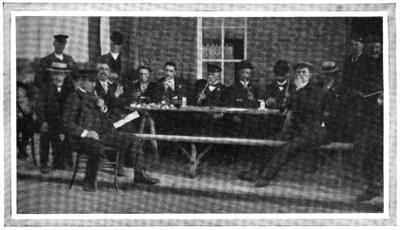
AN OPEN-AIR CONTEST IN THE COUNTRY.
From a Photograph.
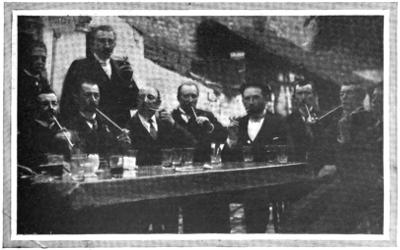
A MEETING OF CHAMPIONS.
From a Photograph.
But hark! The bell was heard again. This time the victim was a man who had been trying to give me some faint idea of the magnitude of the feats he intended to accomplish, his loquacity being undoubtedly the cause of his premature downfall. As he made his exit amid roars of laughter I attempted to assuage his mortification by promising to convince myself on a future occasion of the grounds for his self-praise. He was forced to the indignity of becoming a looker-on, and tried to find consolation by critically regarding the performance of each candidate. Each time the judge’s bell gave the signal for the departure of another competitor he had some infallible theory to[250] expound in regard to the unsuccessful smoker’s faults and follies, and upon those who still possessed a winning chance he generously showered well-meant, but unsolicited, counsel.
Slowly but surely the tobacco of the remaining competitors burnt itself out, and every quarter of an hour, when the clock of the world-famed belfry on the opposite side of the square pealed forth one of its melodious airs, the number of the possible victors had diminished.
After the lapse of about three-quarters of an hour the judge’s bell set up a continuous tinkle. It was now time for those who acted as controllers to keep a sharp look-out, and every now and then the order “Smoke, please,” could be heard, as a committee-man pointed at the bowl of an apparently extinguished pipe, whereupon the faintest cloud of smoke would rise into the air from the clay of the cunning laggard, or the bell would announce another failure.
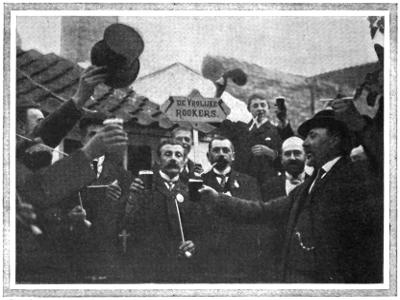
TOASTING THE WINNER AT A COUNTRY COMPETITION.
From a Photograph.
Presently the fiftieth minute arrived, and the number of smokers had dwindled down to six. Opinions differed as to which would “live” to bear the palm. Among the favourites was the amiable secretary himself, one of the most skilful of the Bruges “Rookers,” who, strange as it may seem, is practically a non-smoker when outside the precincts of the club. In the president of the club he possesses a most formidable rival, who enjoys the reputation of being able to win one of the first prizes whenever he chooses to do so.
An hour and five minutes had passed when the secretary and three other members were found to be the sole survivors. Then the unexpected happened. The secretary was seen to be in distress. His efforts to entertain a guest of the club—I had been given the honour of sitting beside him—had diverted his attention from his difficult task; and once more the bell made itself heard as he laid down his pipe, unable to respond to the judge’s request of “Smoke, please.”
One hour and ten minutes had run their course, and only two men were competing. The excitement became intense as the members gathered round the two valiant champions to get a close view and offer encouragement to the one or the other. To outward appearance both were calm and confident. They allowed the[251] tiniest cloud of smoke to escape at intervals from their pipes, and it looked as if these motionless and imperturbable men might survive long enough to eclipse the famous club-record achieved by a champion who succeeded in making sixty grains of tobacco last as long as one hundred and twenty minutes.
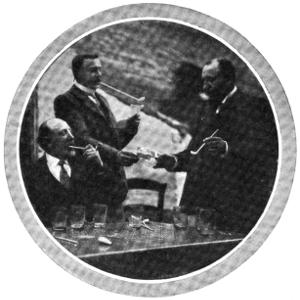
A SUCCESSFUL COMPETITOR RECEIVING A MONEY PRIZE.
From a Photograph.
But suddenly one of the rivals became agitated. He was beginning to realize that the end of his resources was last approaching, for the spark in his pipe became more and more difficult to keep alive. Anxiously he blew into the stem, but only with the wasteful result of dispersing a tiny particle of fire, the last that remained, as it proved, for the pipe was empty. Sadly he laid down his clay, leaving the victory to his opponent. The latter smoked on with an unmoved countenance, allowing not the smallest sign of elation to escape him, as he continued to foster, by an almost imperceptible inhalation, the tiny spark in the clay bowl which had now become the sole object of attention in the crowded room. A hasty movement on the part of the victor as if to settle himself more comfortably in his chair to prepare for a long-dreamt-of record, a slightly more animated whiff to counteract the effect of this incautious action, and the mischief was done—the smoker drew an extinguished pipe from his mouth. He had won, sure enough, but only by twelve short seconds. “One hour twenty-one minutes and thirty-three seconds,” announced the judge. “And to think that I might have held on another half-hour with a little more care!” sighed the disappointed winner.
Then followed the ceremony of presenting the prizes, the successful candidates being allowed to make their choice of rewards in the order in which they were placed. A bread-basket, a pocket-knife, a flower-vase, and other useful and ornamental souvenirs were handed over to the fortunate ones, after which victors and vanquished assembled once more around the long table to enjoy a pipe in the ordinary way, without restraint or restriction.
Nowhere in Belgium are competitions of the kind I have described conducted in a more correct and business-like manner than in Bruges; in fact, the “Brugsche Rookersclub” can be considered in every respect as authoritative[252] and exemplary in matters pertaining to the world of “pipenrookers,” as the smoker of the pipe is called in Flanders. It is among the quaint Flemish people that smoking clubs and smoking competitions enjoy more widespread popularity than in any other part of King Leopold’s little dominion, and nearly every village, no matter how small, can boast of a “Rookersmaatschappij,” which almost unpronounceable word is the equivalent for what we term “smokers’ club.” In the country districts it is the custom to compete for money prizes, and to decorate the winner with some floral adornment, which is pinned on his breast as a visible proof of the honour he has achieved. Many of the estaminets, which thrive in countless numbers in thirsty Flanders, endeavour to stimulate the desire of customers for refreshment by organizing a “Prijskamp in Het Rooken,” and offering prizes to those who best understand the art of making a little tobacco go a very long way.
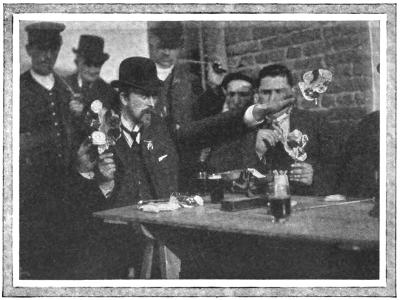
THE JUDGE DISTRIBUTING ARTIFICIAL FLORAL FAVOURS AMONG THE PRIZE-WINNERS.
From a Photograph.
Smoking for prizes is a curious way of killing time and may not appeal to the Anglo-Saxon, who prefers to devote his leisure to more active and health-giving occupations, but it possesses certain advantages over other pastimes which must be taken into consideration. It is not costly, it is not dangerous, it is sociable, and, as my kind hosts of the “Brugsche Rookersclub” were at pains to convince me, it is a form of rivalry from which much excitement can be gained. But above all it teaches one the use, as distinguished from the abuse, of tobacco, which is undoubtedly the best raison d’être for smokers’ clubs and smokers’ contests in a country whose army of smokers forms no less than a third of its entire population, and whose annual consumption of tobacco is six and a quarter pounds per head. This is more than three times the amount consumed in the United Kingdom, and six times as much as in Italy. In fact, little Belgium’s appreciation of tobacco reaches limits unattained in any other part of the world.

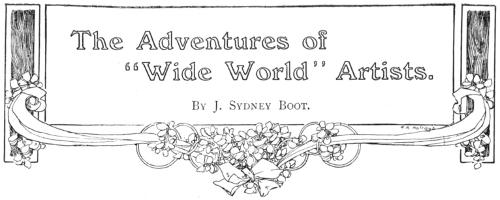
By J. Sydney Boot.
It has always been our rule, in order to obtain accurate pictures, to entrust the illustration of our stories only to artists who have actually visited or lived in the various countries referred to, and are consequently familiar with the conditions of life prevailing there. The result of this custom is that our artistic staff is composed of men who have travelled extensively, roughing it in many remote parts of the world. In the course of their journeyings our illustrators have themselves met with exciting and unusual experiences, some of the most interesting of which are here given, each artist depicting his own adventure.
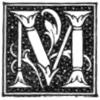
Mr. Charles M. Sheldon, the well-known war artist, who has done splendid work for The Wide World, has had several exciting experiences in the course of his career. He was the special artist for Black and White during the Dongola Campaign in 1896, and received the Khedivial medal with two clasps awarded to the correspondents. He went through the Spanish-American War in Cuba, was dispatched to South Africa at the time of the Jameson Raid, and has also represented his paper in India. Mr. Sheldon has a studio full of interesting souvenirs of his various campaigns.
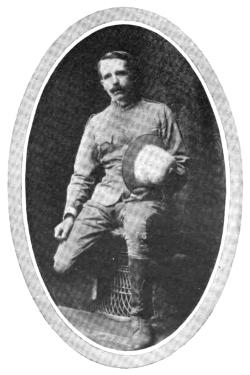
MR. CHARLES M. SHELDON, WHOSE JOURNEY DOWN THE HANNOCK CATARACT ON THE SIDE OF A CAPSIZED BOAT IS HERE DESCRIBED.
From a Photograph.
It was during the Dongola Campaign that Mr. Sheldon met with his most exciting adventure, and the fact that he is alive to-day is more owing to good fortune, he says, than to any skill on his part on that occasion.
Mr. Sheldon joined the column advancing on Dongola under the command of the Sirdar, then Sir Herbert Kitchener, at Wadi Halfa, and was present at the Battle of Firket. After the battle, and while the railway was being brought up, the army camped for a couple of months at Kosheh, where, in addition to the terrible heat and sandstorms, cholera broke out, and threatened at one time to annihilate the camp. When the railway was completed as far as Kosheh, the force marched across an arm of the desert to Hafir, where the gunboats drove the dervishes from their forts with such loss that Dongola fell after very little resistance. The country being cleared of the enemy, and the war for that year at an end, the correspondents made hasty preparations for their journey to Cairo on their way back to England. In order to reach rail-head, they decided to travel by boat down the Nile to Firket, Mr. Sheldon and Mr. Seppings Wright, the artist of the Illustrated London News, arranging to make the journey together. Having sold their horses and camels and discharged their native grooms, with the exception of one camel-man, they packed their baggage and war-trophies on board a boat—purchased[254] from Mr. H. A. Gwynne, now editor of the Standard—and started down the river. They expected to accomplish the journey in about six days and nights, and for the first three days the conditions were delightful, as, floating mainly with the swift current, they made rapid progress, enjoying to the full their enforced ease after the hard work of the campaign. As they approached the Hannock, or third cataract of the Nile, however, the voyage became more exciting, and extreme caution was necessary on the part of the pilot in charge of the boat. The Hannock cataract is, indeed, a formidable menace to navigation, consisting as it does of about sixty miles of shelving ledges of rock and groups of huge boulders, over and among which the water rushes headlong in a series of whirlpools and rapids. It was here that several of the boats taking part in Sir Garnet Wolseley’s campaign were overturned and many lives lost.

THE ROUGH SKETCH OF THE RAPIDS WHICH MR. SHELDON WAS MAKING WHEN THE DISASTER OCCURRED—IT WAS AFTERWARDS RECOVERED FROM THE WRECK OF THE BOAT.
The first few miles of the cataract were negotiated in safety in the early morning, and Mr. Sheldon had just finished making a sketch of the rapids when sudden and dire disaster overtook the party. The boat was a stoutly built, three-quarter-decked craft, with one huge wing-like sail, and the pilot had given the sheet into the care of the camel-man, who, to save himself trouble, tied it, unobserved, to one of the seats. Finding it necessary to tack across the river, to take the boat through a safe channel between the rocks, the pilot, to bring the sail over, shouted to the man to let go the rope. As it was securely fastened to the seat, however, he was unable to do so, and in an instant, as the strong wind caught the tacking boat, it capsized, flinging its occupants with startling suddenness into the water.
Mr. Sheldon sank, but, after what seemed to him an interminable time, rose to the surface, and, dashing the water from his eyes, found himself battling with the full force of the seething current, which threatened every instant to hurl him against the rocks. He realized immediately that he would have a hard fight for his life, and at once struck out for the boat, which was floating on her side some distance off. The only other alternative was to swim to the nearest shore, but, as that was a quarter of a mile or more away, Mr. Sheldon knew that he would be unable to reach it alive in such a terrific current.
After a desperate struggle he gained the boat and pulled himself up astride the gunwale. Mr. Seppings Wright had also managed to reach the boat, which, under their combined weight, was floating but six inches out of the water; while the pilot and camel-man hung on to the mast and spar—all of them looking, as Mr. Sheldon says, more like half-drowned rats than anything else he can think of.
It was quite evident that their position was critical, their one hope being to cling to the boat, which was being carried down the Nile at an alarming rate. At any moment it might go to pieces among the great masses of rock and huge basalt boulders which projected from the surface of the river throughout the entire length of the cataract. Indeed, their chances of ever setting foot again on dry land appeared to be well-nigh hopeless. It was only with extreme difficulty that they managed to cling to the little craft as it plunged and kicked in the swirling eddies of the cataract, and, once at the mercy of the furious torrent, they knew full well that nothing short of a miracle could save them.
Both men discarded most of their clothing, for, as the wreck carried them down the smooth slides over the ledges of rock—for all the world like weirs—the boat was continually being sucked under the surface of the water. When this happened and they were unable to retain their hold, it was only by swimming with all[255] their strength that they were able to regain the boat when she rose again. Their baggage and cherished war trophies had all been thrown into the water, and most of them went straight to the bottom. But here and there they could see saddles, valises, boxes, helmets, and other articles bobbing about in the current until hurled against the rocks and destroyed, or detained far behind in eddies.
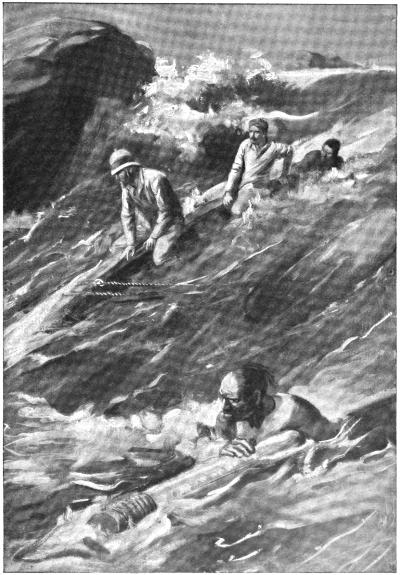
“ON AND ON THE BOAT CARRIED THEM, SEEMINGLY ENDOWED WITH HUMAN INTELLIGENCE AS IT DODGED THE ROCKS.”
On and on the boat carried them, seemingly endowed with human intelligence as it dodged the rocks and found a way for itself through the[256] intricate channels of the cataract, while the shipwrecked crew could but cling to the gunwale with all their strength and trust to Providence for their ultimate safety.
In this way mile after mile of the cataract was passed, with Mr. Sheldon and his companions hoping against hope that the current would take them near enough to the shore to swim for it. In this, however, they were disappointed, for their craft kept well in the middle of the stream. Presently, moreover, they drifted into another and worse rapid, where, caught suddenly in a huge eddy, they were carried round and round until the boat, after twisting and ducking in a manner that threatened to break it up, incontinently sank beneath them—for good and all, it seemed. This time it was a swim for life, and they were all but exhausted when, dazed and spluttering, they succeeded in once more regaining the boat, which had come up, in this instance, behind them. The principal danger they feared was that the boat, which was continually swinging round, would drift broad-side on to the rocks and break up completely.
Again and again, as they continued their mad career, a huge boulder would loom up threateningly from out a smother of foam, and it looked as though nothing could save the wreck from final disaster, but invariably the self-navigated vessel would win a way for itself, at times actually shaving the very side of the rock.
During their passage down the cataract the artists saw several native villages and also some large ghyassas (native boats) drawn up on the bank, but their frantic signals for help were either absolutely ignored, or the natives, in their usual way, expended their energy in urging one another to do something until the capsized boat was far out of sight.
Hour after hour they raced along—sometimes for a mile or two in comparatively easy water, but more often struggling to retain their hold as the vessel rolled and pitched in the rapids.
The afternoon waned at last, and with evening came a welcome abatement of the sun’s pitiless rays, but still the anxious journey continued, with current and rapid in long succession. The strength of the two weary artists and the natives had by this time all but given out, and, thoroughly exhausted and battered as they were, it was evident that if they did not reach the shore before the rapidly-approaching darkness fell it would certainly be all up with them. Then, providentially, a curve in the river took the current close into the bank, carrying the boat to within some thirty yards of the shore. The castaways realized at once that this was a golden opportunity, but in their weak state it was exceedingly doubtful if they would be able to swim to the bank. As luck would have it, however, a number of natives appeared on the spot. They had been watching the capsized craft with evident curiosity, and now, in response to urgent signals for help, they put off to the assistance of Mr. Sheldon and his companions. They easily reached the boat, bringing with them the curious, wedge-shaped floats, constructed of reed-like sticks of ambatch wood, which they use in crossing the Nile. With the timely aid of this primitive form of river craft, Mr. Sheldon, Mr. Seppings Wright, and the natives reached the bank in safety. Their voyage down the dangerous Hannock cataract on the side of a derelict boat, lasting as it did from nine o’clock in the morning until sunset, in the course of which they were carried through some sixty miles of rock-strewn rapids, is, it is safe to say, unique as a record of endurance and long-drawn-out peril, fraught with possibilities of the most alarming description.
On reaching the shore they sank down dead-beat on the bank. Their condition was most wretched, such little clothing as they retained consisting of soaked and tattered rags. They had no means of making a fire, which they badly needed, as, with the setting of the sun, the terrific heat of the day was succeeded by the chill night air of the desert. To make matters worse, the natives either could not or would not give them anything to eat, and the only food they had of their own was a tin of preserved ginger, found in a valise which one of the natives rescued from the current.
The night, as may well be imagined, was passed in misery and discomfort, but with the morning the welcome discovery was made that directly opposite, a mile away on the farther bank, was one of the hospital camps established by the Egyptian field force. Mr. Sheldon thereupon bribed a native at the cost of a razor, also found in the valise, to swim the river and obtain help for the party.
Now, at length, their troubles were ended. The commandant of the camp signalled to a steamer, which carried them over to the other side, where the officer provided them with dry clothes and what they most appreciated, comfortable beds to sleep in.
There are but few artists, even marine artists, who have actually followed the sea as a profession. A well-known name among the few who have done so is that of Mr. E. S. Hodgson, whose strong, vigorous illustrations of seafaring adventures are a familiar feature in The Wide World. A casual glance at his drawings is sufficient to show that he has an intimate acquaintance with the life and customs of a[257] sailor, and they are executed with a realistic touch that could not be attained except by personal experience.
Mr. Hodgson, while on a voyage, once met with a serious accident which nearly cost him his life; and it was entirely owing to the effects of this mishap that he gave up the sea and decided to become an artist. Mr. Hodgson has provided us with the following account of what happened to him for inclusion in our series of “Adventures of Wide World Artists.” His ship, the barque Her Majesty, six hundred tons register, sailed from the London Docks bound for the West Indies with a cargo of bricks and rice for the prisons in Martinique.
For some weeks nothing out of the ordinary routine of life aboard ship occurred, Her Majesty bowling along with a favourable wind and making good headway.
The north-east trades had only just been reached, however, when bad weather was encountered, storms and squalls succeeding each other day after day.
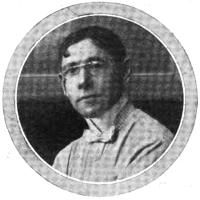
MR. E. S. HODGSON, WHO FELL FROM THE MAST OF A SHIP TO THE DECK BELOW, A DISTANCE OF OVER A HUNDRED FEET.
From a Photograph.
“All hands on deck,” was the order one bleak, dark night when a sudden blustering gale arose, and Mr. Hodgson, with the rest of the crew who were keeping their watch below, tumbled up, none too pleased at the prospect of a night on deck instead of in their bunks.
“Jump up there, my lad, and make fast the fore-royal,” was the skipper’s order to our artist.
“Aye, aye, sir,” he replied, as he made for the foot of the shrouds. The gale was blowing at a terrific rate, causing the ship to plunge and roll heavily, and Mr. Hodgson’s task would have been a dangerous one even for a much more experienced sailor. The order had been given, however, and up he had to go.
It was a perilous journey up into the blackness of the night, and he had literally to feel his way rope by rope, hanging on by hands and toes. The oscillation of the ship was so violent that he expected every moment to be flung into the sea, while the thudding of the clewed-up sails threatened to carry the masts overboard. Higher and higher he climbed until he reached the top-gallant rigging, where the fury of the gale literally pinned him to the ropes, but at length he managed to crawl out on to the yard. The foot-ropes were shallow, making it necessary for him to kneel on them, but once out on the yard Mr. Hodgson applied himself to the work of securing the sail with all possible speed, a task which the pitch-darkness of the night and the plunging of the ship rendered one of extreme difficulty, perched as he was over a hundred feet above the level of the deck. He had bent over to gather the madly-slatting canvas when suddenly it bellied up over the yard and bore him irresistibly backwards with it. In a flash he saw his danger and, with a frantic clutch, tried to grasp the sail—missed it—and realized that he was falling! The accident had happened so suddenly that for the moment he was unconscious of the full extent of his peril; his brain was unable to take in the terrible significance of what had occurred, and the situation seemed unreal—a passing freak of the imagination that would presently be dispelled. Then the blackness seemed to lessen slightly and, coming slowly towards him, he could see the top-gallant yard and the men on it busy furling the sail. Mr. Hodgson says the sensation he experienced was that of floating easily and gently in the air; he did not seem to be actually falling. Next the upper topsail yard appeared to pass him, brushing gently by him on its way “up.” Then, with a vague sense of wonder, he noticed that he could make out clearly all the details of the deck, which seemed to be rushing up towards him with a gigantic leap. At once, as his brain cleared, the appalling truth dawned on him that he was falling down, down, through the darkness, and with a feeling of unutterable horror he realized that, powerless to help himself, he must, in the course of the next few seconds, be dashed to his death on the deck, or to an equally certain fate in the roaring seas alongside.
The various objects now began to lose their shape and the darkness closed in again; then came oblivion, for, mercifully, Mr. Hodgson lost consciousness before he reached the deck.
“Poor laddie! I doot he’s gone. This will be sore news to send home.” This remark, coming to him as though from far away, was Mr. Hodgson’s first intimation that he was still alive. He recognised the skipper’s voice, and, opening his eyes, discovered that he was lying on the deck, surrounded by the entire ship’s crew, with the captain bending over him. He was in such frightful agony, however, that he promptly fainted away again, and did not[258] recover consciousness for a week. He then found out that his leg was fractured in three places, and as the ship was three weeks’ journey from the nearest port, and there was no doctor on board, Mr. Hodgson experienced a long period of excruciating agony, and, in fact, thought that he was dying.
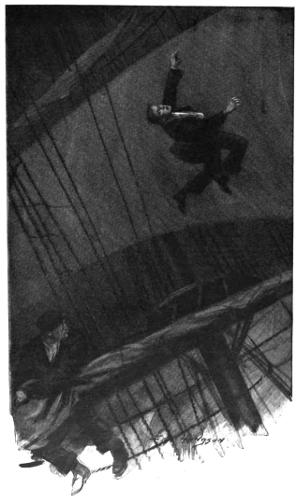
“HE TRIED TO GRASP THE SAIL—MISSED IT—AND REALIZED THAT HE WAS FALLING!”
What doctoring he did get was of an exceedingly rough and ready description, and was provided by one of the fo’c’s’le hands who had at one time had his own leg fractured, and on the strength of this claimed to know all about broken bones. It may have been that he was specially gifted in this respect, or it may have been sheer luck, but he certainly made a very fair job of it, all things considered.
Three weeks later, when Her Majesty reached St. Pierre, after an exceptionally long passage out of ninety-eight days, a medical man was sent for at once, who was not at all satisfied with the methods of his unprofessional rival. In fact, he announced that Mr. Hodgson would never be able to walk again, and advised the immediate amputation of his injured limb. Mr. Hodgson, however, decided that if he was to return home at all he would do so as a whole man, and flatly refused his consent. Fearing that the operation would be performed against his will, he declined, for days together, to touch any of the food offered him, in case it should have been “doctored” and he would wake up minus his leg. After Her Majesty had unloaded her cargo and taken another on board she sailed for home, and Mr. Hodgson went with her, but his troubles were by no means over, as the ship foundered in a gale and the crew took to the boats. As may well be imagined, Mr. Hodgson, in his enfeebled state, was in no fit condition[259] for such an experience, and during the eight days’ journey in open boats that followed until the island of Santa Cruz was reached his sufferings were beyond description.
Mr. Hodgson went to sea for a year or two after his accident, but as the unskilled treatment of his amateur doctor was not entirely successful the bones of his leg were never properly set. Although the limb was sound enough for all ordinary purposes it was not strong enough to stand the continual strain of a seafaring career, and he accordingly made a fresh start in life as an artist, with what success is well known to our readers.
Mr. Hodgson says, “Until you have known me quite a long time you would not think that I was any the worse for my accident,” and as he fell over a hundred feet the wonder is that he was not killed on the spot. His escape from death was, in fact, little short of miraculous.
Mr. Norman H. Hardy’s record of travel is certainly as extensive as that of any artist whose work appears in the pages of The Wide World—or of any other magazine, for that matter. He was for seven years in Australia as the special artist of the Sydney Mail, and in the course of his wanderings has visited the South Sea Islands, New Guinea, Solomon Islands, New Hebrides, New Britain, China, Siam, India, and Egypt. His latest trip was on a roving commission to Central Africa during the early part of this year.
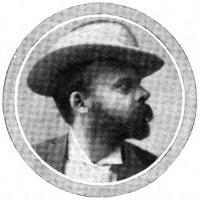
MR. NORMAN H. HARDY, WHO WAS ATTACKED BY A MOB OF INFURIATED SHEEP-SHEARERS ON STRIKE IN AUSTRALIA.
From a Photograph.
While in Australia Mr. Hardy met with some exciting experiences in connection with the New South Wales sheep-shearing strike in 1894, one which he will always remember as an occasion on which he was lucky to escape with his life. The strike was brought about by the union sheep-shearers, who objected to the employment of “free” or non-union men who were willing to work at a lower rate of pay, and caused wild excitement throughout New South Wales. The unionists struck work in a body and resorted to “picketing,” threatening the free labourers with violence if they persisted in carrying on their work. This affected many thousand men, as in New South Wales sheep-shearing is a trade of such importance that the welfare of the entire State was involved. To such a height did the excitement rise that the bad feeling between the opposing factions grew to alarming proportions, resulting in serious loss of life, and the country rang with reports and rumours of outrages perpetrated by the incensed unionists. The seriousness of the situation was such that the late Sir George Dibbs, then Premier of New South Wales, issued a proclamation in which he threatened to call out the military to quell the riots.
Burrowang station, in New South Wales, was regarded as the stronghold of the unionists, and it was recognised that on the turn of affairs there the ultimate issue of the strike depended.
Mr. Hardy was accordingly dispatched to Burrowang as the special correspondent of the Sydney Mail, making the journey in the company of some forty “free” men, under the charge of a Mr. Campbell. The men were a very mixed lot, drawn from all classes of society, and were sent out by a non union pastoral organization to take the places of the shearers who were on strike.
A special train had been chartered, and as, at six o’clock in the evening, the closely-packed cars left Sydney it was evident that there was a feeling of uneasiness among the passengers, for it was well known that the unionists were in strong force at various points along the line. Some of the younger men had undertaken the journey from pure love of adventure, but the older men were mostly out-of-luck miners and shearers who were genuinely in search of work. While on their way to Sydney a number of them had already come into contact, at Circular Quay railway station, with some of the unionists, and a fierce fight had ensued; this fact undoubtedly helped to increase the alarm of the rest of the men in the train.
At Emu Plains station, where the train halted, the less resolute were seized with an attack of panic, and had literally to be driven back into the cars when the train was ready to start again, where they sat in gloomy apprehension of danger as they approached nearer and nearer their destination.
The journey from Sydney to Burrowang is made, in the ordinary course, by train to Forbes, and thence by horse-buggies. But as at the latter place an angry mob of unionists was awaiting the arrival of the “free labourers’” train, it was decided to resort to strategy to avoid the risk of an ugly fight between the two parties.
Accordingly, although, as a blind, coaches and mounted police were ordered to meet the[260] special train at Forbes, the driver was instructed to stop at the small station of Droubalgie, where a second contingent of four-horsed cars, also guarded by mounted police, were waiting to convey the men to Burrowang, thus avoiding the unwelcome attentions of the rioters at Forbes, whose anger, when they found they had been outwitted, speedily brought them into conflict with the police.
The men were in a tremendous state of excitement as the train drew up at the station, and many of them were afraid to take their seats in the buggies; but at length, when it was seen that there were no union men in sight, Mr. Campbell and Mr. Hardy were able to induce them to take their seats. There was scarcely room for all, and the cars were uncomfortably crowded, but Mr. Hardy, owing to the fact that he was popularly supposed to be a detective from Sydney, was given a box-seat. Just as they were starting two horsemen, who turned out to be union men who had got wind of the “blacklegs’” arrival, appeared on the scene. They tried hard to induce the “free” men to join them, but without success, and finally galloped off to Forbes, after having announced their intention of informing the waiting crowds of the arrival of the train at Droubalgie and bringing them in pursuit. The buggies containing Mr. Hardy’s party thereupon started off with all speed, led by the mounted police. The going was bad, frequently over long stretches of quagmire and marsh land, occasional stoppages being necessary when one or other of the coaches became bogged, sinking axle-deep in the mud and requiring terrific exertion to move it.
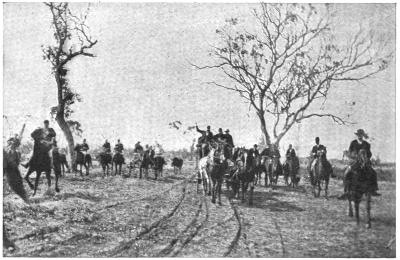
THE COACHES ON THE ROAD FROM DROUBALGIE TO BURROWANG, GUARDED BY MOUNTED POLICE.
From a Photograph.
Another uncomfortable night was spent in the bush, the men camping out by the side of the coaches, strict silence being enforced in order not to attract the attention of the unionists. Following an early and meagre breakfast a start was made, and after a journey of some hours the men became easier in their minds, as it was thought that the pursuit had been abandoned. Soon after, however, as the coaches emerged from a belt of timber and scrub into open ground, it was seen that a number of unionists were waiting for them. The strikers were all mounted and at once charged, yelling fiercely, and started pelting the coaches with stones. It looked as though there was bound to be serious trouble, but the mounted police, with characteristic promptitude, drew their carbines and prepared to open fire.
The attitude of the troopers had its effect on the strikers, who, after a slight show of resistance, drew off and allowed the coaches to proceed on their way. Some few of them, however, had managed to get to close quarters,[261] and hard knocks were exchanged, resulting in injuries to both sides, happily none of them severe.
As it turned out, this was the only real excitement that occurred during the journey, and a few hours later Mr. Hardy and the rest of the party made their entry into Burrowang.
A meeting was at once held at which both sides were well represented, Mr. Hardy attending in the ranks of the non-unionists. The conference provoked a considerable amount of bad feeling, and was broken up in wild disorder by the strikers when they found they could not induce the new arrivals to join them. The presence of the police, however, prevented any serious fighting, only one man being badly injured.
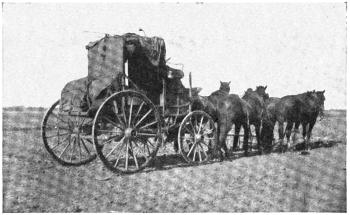
THE COACH ON WHICH MR. HARDY WAS RIDING WHEN HE WAS ATTACKED BY THE STRIKERS.
From a Photograph.
Mr. Hardy soon discovered that he was a marked man, as it was thought that he was either a detective or else an official of the non-unionist organization, and for the next few days it was only by seeking police protection that he avoided bodily harm at the hands of the mob. The whole place was in a suppressed state of excitement owing to the attitude of the strikers, who, it was evident, were liable to break out at any moment, and neither life nor property was regarded as safe. Several attempts were made to burn down the wool-sheds, but happily they were in every case discovered before serious damage was done. Under police supervision the new men started work, but it was at once apparent that they were, in most cases, absolutely unfitted for the work of sheep-shearing, and as the season was by now well advanced skilled labour was soon at a premium. The situation was critical, and at length the union men were approached and asked to resume work at their own terms. This offer they unanimously refused unless every “free” man was discharged.
At length, having treated the strike from every possible point of view, Mr. Hardy decided to return to Sydney, and accordingly booked his place on the next mail-coach running to Forbes, as it was not possible to get a conveyance to Droubalgie on his way back. The strike was still at its height, and the route to Forbes and that town itself were strongly held by the unionists. Mr. Hardy was prepared for an exciting journey, as all coaches were subjected to the closest scrutiny, and he himself was suspected of non-unionist sympathies.
When the Forbes coach drew up at Burrowang for the mails, and the coachman discovered that he was to have as a passenger Mr. Hardy, who had taken an active part in the strike, he was in an exceedingly perturbed state of mind. In spite of his fears, however, the start was made quietly enough.
The day’s journey through bush and scrub proved uneventful, and towards evening the coach drew up at a small bush station, where a halt was made for the night.
In the morning three more passengers put in an appearance—all non-union men—and also a new driver, who was to take the reins as far as Forbes, where, the latest report had it, the strikers were in an extremely dangerous mood. The new driver, when he had taken stock of his passengers, appeared to be even more terror-stricken than his predecessor. He warned them that there was likely to be serious trouble, as the only practicable road took them close to the unionist[262] camp just outside Forbes. He was also particularly anxious to know whether any of the party possessed unionist passes. These were simply small scraps of paper scrawled over in a peculiar manner in blue pencil; but, as they enabled their holders to pass through the camps without molestation, they were extremely useful, and Mr. Hardy remembered with regret that he had been offered one at Burrowang. Attaching little importance to the offer at the time, however, he had declined it.
As the coach neared Forbes two mounted union men were seen, who on the approach of the vehicle at once turned about and galloped back, with the object, it was thought, of informing the strikers of its arrival. Their action proved too much for two of the passengers, who promptly insisted on being put down. The journey was then resumed with Mr. Hardy and the driver on the box, and the remaining passenger inside, cowering under the seat.
As the camp came in sight an outburst of shouting gave ample proof of the hostile attitude of the strikers, a number of whom at once made a rush to meet the coach.
A short distance along the road was a bridge spanning a small creek, and at this point a strong guard of strikers was posted to hold up all traffic. On previous occasions their method of procedure had been to haul out any passengers who were without passes, rob them of everything they possessed, and, after treating them with the utmost brutality, set them to work in a menial capacity about the camp. The driver of the coach, when he found that he was in actual danger, plucked up his courage and, lashing his horses into a gallop, made a dash for the bridge at a furious pace.
Mr. Hardy was immediately recognised by the foremost of the strikers, who, with hoarse cries of rage, shouted to the men on the bridge to stop the coach at all costs.
The terrific rate at which the horses were travelling showed plainly that it was the driver’s intention to ride down any opposition, and this action provoked such an outburst of fury among the mob that it was perfectly clear that if they did manage to stop the coach both he and Mr. Hardy, even if they escaped with their lives, would be treated with savage violence.
Mr. Hardy’s presence on the coach—it will be remembered that the men suspected him of being a detective—had the same effect on the strikers as a red rag on a bull, and with an ungovernable fury of rage and at imminent risk of their lives they literally hurled themselves at the horses’ heads, meanwhile calling on the driver, with the vilest imprecations, to halt.
By way of reply the Jehu applied the whip to his team still more vigorously, yelling at the same time at the top of his voice that anyone who dared to stop the Royal Mail would get ten years for his trouble. His threat, however, was ignored, and presently the sharp crack of a revolver rang out. Mr. Hardy felt a bullet whiz past his head, missing him by inches. The shot was followed the next instant by another, and it was only the celerity with which he ducked down to avoid the bullet that saved his life.
The sound of the firing caused the frightened horses to rear and kick, knocking down the men who had seized their bridles and almost stopping the coach.
The check, however, was only momentary, and as the horses plunged forward again some of the more excited strikers, who, with wild curses, had endeavoured to climb the side of the coach to get at Mr. Hardy, were flung back into the roadway.
The panic-stricken horses in their mad struggles had dragged the coach across the road, and nearly over the side of the bridge into the creek below, but the driver, applying his whip freely, soon had his team under control again, and, scattering the crowd to right and left, the flying coach crossed the bridge, followed by a volley of sticks, bottles, and stones. Mr. Hardy, crouching low over the seat, was struck with such violence by a brick on the left shoulder that he at first thought it was fractured, but happily he escaped further injury. With the horses maddened and excited, the coach dashed at a furious pace along the short stretch of road to Forbes, where it drew up at a small hotel. The coachman was white to the lips from the strain, and the inside passenger alighted trembling with fright, while Mr. Hardy confesses that he felt more than a little shaky.
A large crowd soon collected, anxious to learn the cause of the excitement, and the hotel-keeper, when he heard the driver’s story, promptly dragged Mr. Hardy indoors, telling him, if he valued his life, to keep out of sight. The presence of the police prevented an attack being made on the place, and when things had quietened down a little our artist was able to slip out unnoticed. After another coach ride, this time a peaceful one, he made his way back by rail to Sydney.
In the end the unionists gained the day at Burrowang, going back to work on their own terms, and thus virtually ending the strike throughout New South Wales.
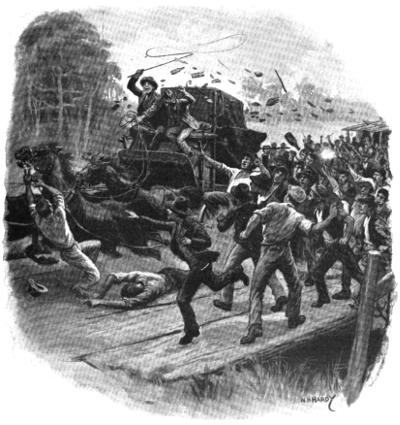
“THE FLYING COACH CROSSED THE BRIDGE, FOLLOWED BY A VOLLEY OF STICKS, STONES, AND BOTTLES.”
Mr. Inglis Sheldon-Williams is an artist with a grievance. He complains that, although he[263] has travelled a great deal and roughed it in various parts of the world—and for so young a man his record is remarkable—he has not met with a single first-class adventure of a really hair-raising nature. That he ought to have done so is an obvious fact, he says, and, indeed, on several occasions he has been perilously near as much excitement as would last any man a lifetime. In fact, it may be said that he has been out looking for trouble most of his life, and he is to be accounted lucky in that he has never found it.
Early in his career he emigrated to Canada, where for some years he lived the rough-and-tumble life and endured the manifold hardships that fall to the lot of a farmer in the back-woods. At the call of art, however, he returned to England to study, but with the longing for adventure strong upon him he later enlisted in the Imperial Yeomanry and took part in the South African Campaign, where he saw some considerable amount of fighting.
When the war between Japan and Russia broke out, Mr. Sheldon-Williams was early in the field as the special artist for the Sphere, and was in China and Manchuria during the earlier[264] stages of the campaign. He has also visited India and attended the Durbar.
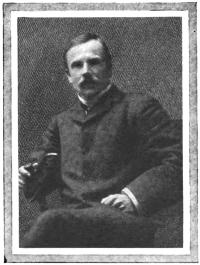
MR. INGLIS SHELDON-WILLIAMS, SOME OF WHOSE VARIED EXPERIENCES ABROAD ARE HERE RELATED.
From a Photograph.
On numerous occasions he has congratulated himself that he was at last placed in a critical situation, only to finish up with an anti-climax.
When he was in Canada, for instance, he lost himself on the prairie while in charge of a team of oxen. A terrific blizzard came on, and, as the snow was absolutely blinding and the temperature many degrees below freezing-point, all sorts of unpleasant things might easily have happened. Mr. Sheldon-Williams had visions of wandering about for days in the snow, starving and frostbitten, with a mere possibility of rescue when he was in the last stages of exhaustion. But although he was lost, his oxen were not, and they took him safely home.
On another occasion he attempted to rescue a duck from the depths of a well, but fell in himself—into sixteen feet of water. Any other man placed in this situation would have been drowned without any bother at all. But Mr. Sheldon-Williams had not been in the water more than a few minutes before he was discovered and hauled out by the united efforts of his mother and sister.
It was just the same in South Africa—no luck at all, simply a lot of dramatic situations which fizzled out miserably. On one occasion Mr. Sheldon-Williams’s company occupied a farm-house near Johannesburg, and the very night on which he was absent, having ridden into town to deposit some money in the bank, was the one selected by the Boers to attack the place. His bed was close up against a window through which the Boers fired volley after volley. Had Mr. Sheldon-Williams occupied it as usual, he would undoubtedly have been shot!
On another occasion he got leave of absence from a patrol, as the neighbourhood was supposed to be clear of the enemy, in order to do some sketching. The patrol was, of course, ambushed, and the man who took his place shot dead.
Another piece of particularly bad luck occurred when Mr. Sheldon-Williams’s troop was attacking Klip River Kopje. The Boers had actually been seen on the ridge, and in the morning he was one of the men selected for scouting purposes. As he rode up the hill it certainly looked as though he had a fine chance of figuring in the next list of killed and wounded. But, as Mr. Sheldon-Williams says, “It was not my fault that the Boers had left overnight!”
At Diamond Hill it was just the same. A mere handful of Yeomanry, Mr. Sheldon-Williams among them, held an exposed position throughout the night in the face of the enemy, determined to do or die. As it happened they did neither, for the next day they were told that there had been an armistice on all the time.
Before Pretoria Mr. Sheldon-Williams was in the firing-line, which was strung out on the left of the advance. The Boer shell-fire had set the grass alight, depriving them of anything like adequate cover, and in the open the rifle-fire from the Boers was nothing more or less than a leaden hailstorm, but he was not even wounded. Presently the order to withdraw was given, but, having fallen asleep, he failed to notice it, and was the last man to leave. As he thus offered himself as a suitable target for a little individual sniping, a Boer marksman took careful aim at him and fired. He was a remarkably good shot, but, needless to say, he missed Mr. Sheldon-Williams, who at that precise moment stooped down to pick up a discarded rifle, the bullet passing close over his head! All things considered, therefore, Mr. Sheldon-Williams has certainly received exceptional treatment at the hands of Dame Fortune, but so long as she continues to serve him in the same way it is difficult to see that he has any just cause for complaint.
By Lieutenant Paul Durand.
The hippopotamus—that enormous pachydermatous creature whose shape reminds us of the antediluvian monsters—was formerly met with over a large part of Africa, but it has been so pitilessly pursued by hunters that it is every day becoming scarcer and scarcer. Within a hundred years, perhaps, the hippopotamus will be numbered among the vanished curiosities of the animal world. In this article a French sportsman describes his exciting experiences while in quest of “river horses,” and furnishes a number of very impressive photographs.
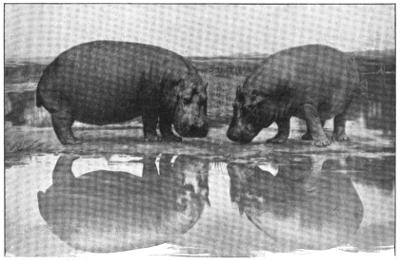
MALE AND FEMALE HIPPOPOTAMI ON THE BANKS OF AN AFRICAN RIVER.
From a Photograph.
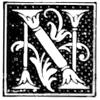
Not many months ago the habitués of the Jardin des Plantes, the Paris “Zoo,” were much astonished to notice that one of their favourites—Jack, the hippopotamus—displayed signs of unwonted irritation. The change in the animal’s temper had been quite sudden. Hitherto Jack had been extraordinarily docile; now, whenever it became necessary to make him change his quarters, either for the purpose of cleaning the cage or to show him off to better advantage to visitors, he yielded with manifest surliness.
Then there came a day when the keeper in whose charge Jack had been for a great number of years found it quite impossible to induce the animal to leave his bath for the open enclosure, beyond the bars of which a score or two of nurses and children were eagerly waiting to feast their eyes upon him. The more insistent the keeper grew, the more did it become evident that the great, unwieldy beast was determined to try conclusions with its human tormentor. On his side the keeper was equally obstinate, but blandishment being clearly of no avail he resorted to more convincing measures.
Poor fellow, he little realized his danger! To the unutterable horror of those present the animal’s enormous jaws suddenly flew apart, disclosing a cavernous mouth and throat. By the time those jaws had closed again the unfortunate keeper had ceased to be numbered among the living!
Appeased, apparently, by this act of savage ferocity, Jack has since been as docile as he ever was. His diminutive, befogged brain had,[266] no doubt, suddenly shown him, as in the mirage of fever, some dimly recognisable vision of the luxuriant African landscapes he was eternally severed from. He may—who knows?—have thought of other creatures like himself, lazily enjoying existence in sun-warmed, muddy streams, browsing at will on unspeakably luscious herbage. Then, perhaps, an illuminating flash of lightning rage showed him instantaneously the long tale of wrongs inflicted upon his dull-witted race by the white man. Because his ivory is finer-grained than that of the elephant and because it does not so easily become yellow, because his hide—cut into narrow strips—makes superexcellent sticks, not an instant’s respite from persecution is accorded to the poor “river horse.” Pitilessly is he harried and massacred, the hunter’s rifle vomiting forth a constant stream of bullets—“dum-dum,” explosive, or steel-pointed—to pierce the massive, narrow skull.
As a consequence of this ceaseless warfare the rivers are so rapidly becoming depopulated that the day cannot be far distant when, like the American buffalo, the African hippopotamus will be nothing but a memory. Possibly the domesticated “dark continent” of to-morrow will piously preserve in some park, national or international, a model herd of the only surviving representatives of this once prolific race. Learned men will then bring forward convincing arguments to prove the propriety of favouring the propagation of such useful animals; but the useful animals themselves, wearied out by the last years of their persecuted existence, will probably refuse to breed. Already the hippopotamus is scarce enough to make us realize some of the good that is in him. The knowledge has come too late; the “river horse,” it seems, is doomed to disappear. Under these circumstances, perhaps, the recital of my own recent experiences while hunting hippopotami may be found of interest.
To the African traveller the hippopotamus is a species of game particularly desirable, for its ivory and its hide are both valuable, while the not inconsiderable danger involved in its pursuit provides the delicious emotion without which every kind of hunting is tame and insipid. Moreover, the obligation under which the leader of the expedition lies to feed his servants and carriers adequately makes one of these enormous beasts, twelve feet long or so and disproportionately wide, a perfect godsend. Not only does the hippopotamus furnish a formidable amount of meat, but that meat has the inestimable merit of keeping fresh much longer than any other, principally owing to the fact that flies seem to have an insurmountable horror for it. I must admit that for a long time I thoroughly sympathized with the flies! Alive, the hippopotamus has a very peculiar odour, somewhat resembling musk, which discloses the presence of the animal from afar, when he happens to be to windward of one. In the flesh of the dead animal this odour—or the taste of it, rather—persists, and is much appreciated by the natives, though Europeans take a long time to get accustomed to it; some are never able to support it.
Once, when I was in the neighbourhood of the Chari River, my men informed me that a herd of hippopotami were in possession of a series of ponds not far from our camp. I immediately marched in their direction. As we approached the water we heard the trumpeting of the leader of the herd, and almost simultaneously caught sight of him. Erect on a small bank, his formidable mouth widely opened, he was uttering that characteristic neighing sound in which there are notes that remind one both of the lowing of a cow and the roar of a lion. On the surface of the ponds, moving quickly from place to place, were to be seen what appeared to be large balks of some kind of dark wood; these were the muzzles of the remaining members of the herd.
I succeeded in getting round the water unobserved to a spot where I was concealed from the animals by a small islet which occupied the middle of the pond. To this island I transported myself by means of a small and primitive canoe, which two of my men had brought on the chance of its being required.
By this time the old male had taken to the water again. The whole herd were now vaguely alarmed, for from my place of ambush I could obtain only fleeting glimpses every now and then of a muzzle momentarily showing itself on the surface of the water—just long enough for the animal to take breath—and then disappearing.
After waiting some time I grew impatient and began to salute each of these distant apparitions with a shot from my Express rifle. Nothing, however, is so deceptive as to shoot across water, especially when situated, as I then was, facing the sun; and I was not successful in lodging even one bullet in the targets I aimed at.
I then made up my mind to lie low for such time as might be necessary to reassure the animals. I had to wait some considerable time—certainly more than an hour; but finally my patience was rewarded. The old male, still swimming, was actually coming in my direction. His head, carried well clear of the water, presented a marvellous target at a distance of about twenty-five feet from me—a regular tyro’s shot.[267] And yet something or other made my hand tremble, and as I pulled the trigger I realized that I had missed!
I also realized more than this. In order to make the effect of the ball the surer I had employed my largest gun, and I had given it a full elephant charge. The shock of the recoil was so tremendous that I was thrown on my back several paces away, with a feeling as if my shoulder had been put out of joint. When I got on my feet once more all the natives were shrieking with laughter, for this misadventure to their white master appeared to them highly diverting.
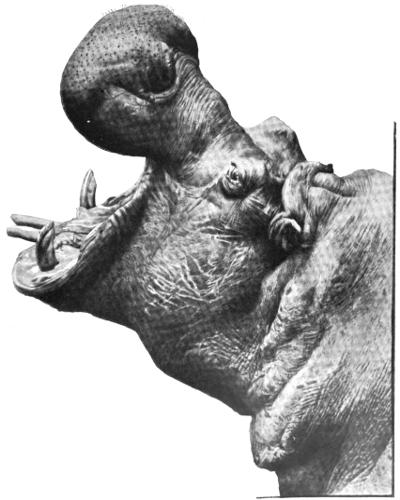
A GLANCE AT THIS TRULY FORMIDABLE PAIR OF JAWS WILL ENABLE THE READER TO REALIZE HOW IT IS THAT THESE GREAT BRUTES ARE ABLE TO DEMOLISH CANOES SO EASILY.
From a Photograph.
Meanwhile, in the pond a terrible scene was in progress. Maddened with rage and pain, the old hippopotamus was swimming furiously, first in one direction, then in another. Now he would mount on a sandbank, now plunge with a tremendous splash into the water, which was reddened with his blood. He was seeking an enemy on whom he might be avenged, and blindly pursued his fellows under the water. The ball had struck him in the chest, whereas the only immediately vital spot in the hippopotamus is situated just beneath the eye, the ball thence penetrating the brain. My bullet, though it had not killed him outright, must have caused terrible internal injuries, for very soon I saw him turn completely over several times, displaying successively above the surface of the water his head and his feet. Then, all at once, he sank and did not again reappear.
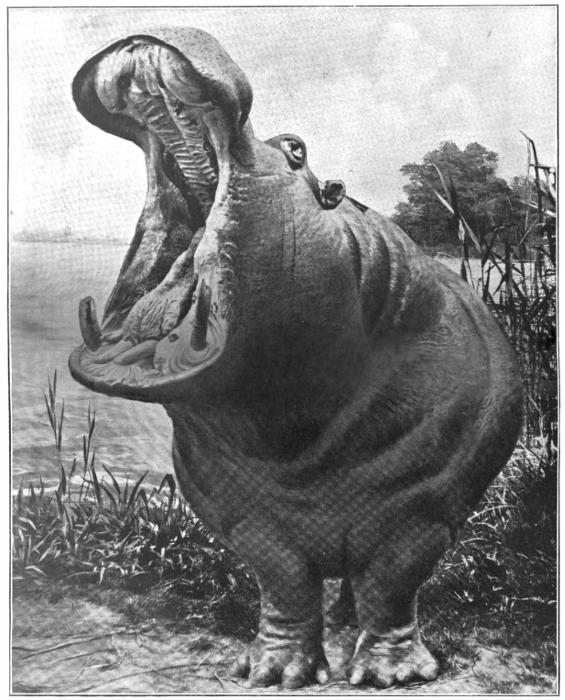
THE ALARM! A BOAT HAS APPEARED IN THE DISTANCE, AND THE GIGANTIC LEADER OF THE HERD ROARS OUT HIS WARNING.
From a Photograph.
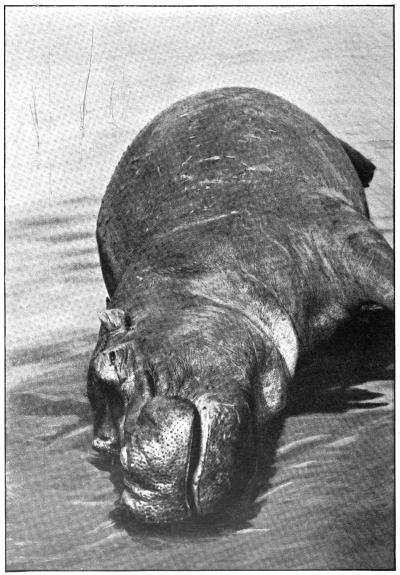
A DEAD HIPPOPOTAMUS WHICH HAS BEEN DRAGGED IN TO THE RIVER BANK.
From a Photograph.
A dead hippopotamus invariably sinks to the bottom, and it is only after an interval which varies between two and eight hours that the body rises and floats on the surface. For this reason, if you kill a hippopotamus in a river the current of which is at all rapid, you must, in nine cases out of ten, give up all hope of ever recovering your quarry. The carcass may be carried a great distance under the water, reappearing at the surface miles away, where it furnishes a providential feast to the native inhabitants on the banks, who call down ironical blessings upon the infallible rifle of the white man.
In the present instance there was no necessity for me to trouble about the carcass, which by the following morning, if not that very evening, I knew I should find floating placidly on the surface, waiting to be hauled ashore. In any case it would have been sheer madness to try to recover it at that moment, as the pond was infested with crocodiles.
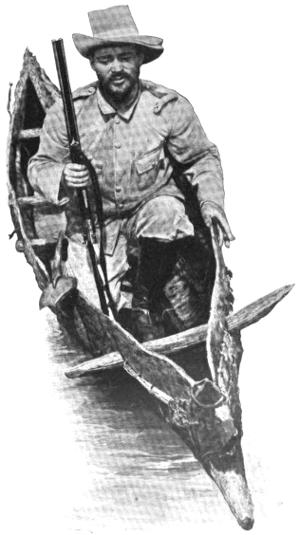
THE HUNTER DRIFTING DOWN STREAM IN A PRIMITIVE NATIVE CANOE.
From a Photograph.
That day every member of the unfortunate herd—there were six in all—fell a prey to my rifle; the massacre occupied about two[272] hours in all. When I returned on the morrow half-a-dozen enormous carcasses lay stretched out among the aquatic herbs, some floating on the surface of the water, others stranded on the banks.
It was not without difficulty that I persuaded my men to carry out the ropes necessary for hauling in the carcasses that were out of reach, the pond, as I have said, being full of crocodiles. One of their number, however, at last volunteered to do the job. While he was engaged in his somewhat perilous undertaking the rest of the natives set up a chorus of the most atrocious howling it is possible to imagine, meanwhile thrashing the surface of the water, creating by one means and another so discordant a concert that the saurians, terrified no doubt out of their wits, must have sought refuge in the most hidden depths, for we saw nothing of them.
To cut up a hippopotamus is no easy task. In some places the hide is almost two and a half inches thick, and before you have got through a hand’s-breadth your knife has completely lost its edge, and requires to be resharpened. The head and the feet are put on one side to be preserved as trophies of the chase, while the remainder of the flesh is cut into long, thin strips which, after they have been dried by hanging them on the tree-branches, will keep good for a very long time. The ivory of the teeth and tusks, which is of very fine quality, used to be employed almost exclusively in the manufacture of false teeth; nowadays it is turned to all the purposes of ordinary ivory.
As for the hide, cut into strips it is made into sticks, which are as good defensive weapons as one could wish to possess. Treated with oil they become as transparent as tortoiseshell, and look quite pretty. Out of hippopotamus-hide bullock-drivers likewise make thongs for their whips which are positively everlasting, and fetch, relatively speaking, quite a good price.
In this particular expedition the only trouble I had was that involved in shooting the animals. Things do not always go off so smoothly, however, and hunting hippopotamus may turn out to be a more dangerous sport than almost any other.
On one occasion, when we were descending the course of the Chari in canoes, we perceived a number of the great beasts in the river, playing some clumsy sort of game among themselves and throwing up in the air jets of water, somewhat similar to those ejected by whales through their blow-holes. We could distinctly hear the animals’ powerful breathing.
Carried away by the nearness of the game, I forgot entirely how dangerous the pursuit of the hippopotamus may become when the hunter is in a boat.
Meanwhile we were advancing steadily, and every time a huge frontal bone or a giant muzzle appeared above the level of the water I pulled trigger. There were frequently quite long intervals, for the hippopotamus is able to remain over three minutes under water without coming up for breath.
Presently, out of the corner of my eye, I caught sight of a female and her little one on the river bank; then I saw her take to the water. My attention, however, was riveted on a spot in the river where I had seen an old male plunge. Every instant I expected him to reappear.
Suddenly, ere I fully realized what was occurring, I found myself projected upwards in the air with incredible violence. Before I descended I had time to see a gigantic jaw open wide, and then close with a snap on the unfortunate canoe which followed mine. An instant later I was in the water, striking out madly for the bank, almost persuaded that I felt the sharp teeth of a crocodile nipping off a thigh or an arm. I was fortunate enough to reach the shore, however, without mishap. Then we called over the roll. At first I supposed nobody was missing, but we soon perceived that our number was one short. We never saw the poor fellow again. Doubtless he had been injured when the jaws of the hippopotamus closed over his canoe, and was thus unable to reach the bank. At that moment, probably, a crocodile was devouring his body at the bottom of the river.
By dint of a few questions I was able to piece together what had happened. The female, thinking to defend her young, had thrown herself upon the canoe behind mine, and almost simultaneously the old male had emerged from the water with irresistible violence beneath my own craft, pitching me upwards. It was a very narrow escape, all things considered, and I can assure you that, for the rest of that day at least, we left the poor “river horses” in peace.
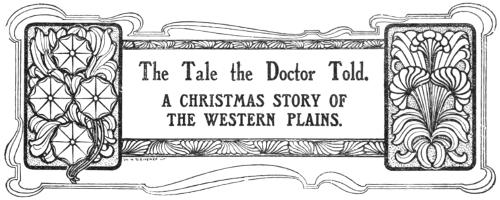
Written and Illustrated by Stanley L. Wood.
Concerning this narrative, Mr. Wood writes: “I was a boy at the time, living with my parents on the plains, the nearest point of civilization being Fort Hayes, now Hayes City, Kansas. The doctor had occasion to ride out to our place, and told us of his adventure, and the sequel, much as I have set it down.”

It was Christmas Eve.
“Hear that wind?” said Dr. McDonnell. “It sounds like a pack of wolves, the way it howls; and the snow means to keep on coming.”
“Yes, and stayin’,” answered the cow-puncher, nodding gravely at the stove.
“Not a nice night to go walking,” ventured the tenderfoot; “in fact, I think I’d rather be here. It’d take a bit to get me out—and Christmas Eve, too. As you say, doctor, the wind does sound like wolves; and no doubt if one were out they’d find the wolves—or the wolves find them.”
“No doubt whatever, young feller,” remarked the puncher, dryly. “Wolves are out this weather for grub; and when they’re out for grub they’re out on a business trip, dead sure.”
The doctor bit the end off a fresh cigar.
“Do you boys want a story?” said he.
“Go ahead, doc,” replied the cow-puncher, proffering a match. And the doctor, after lighting up, went ahead to the following effect.
Well, boys, it’s a long time ago now—a Christmas Eve, too—way back in the ’seventies, when things on the prairies were very different. It was usual in those days to get a brush with the Utes or the Cheyennes pretty regularly once or twice a month.
The twenty-third of December was a bright, sunny day, with not more than three or four inches of snow on the plains. Over the thin snow-crust galloped Jimmie Dink—“Darky Dink” we called him, because of his swarthy hair and skin.
“Doc,” said he, pulling his broncho up short before me, “Wolfie Jim’s about done. Can’t you go to him? He’s ’most busted up.”
Poor old Wolfie! I knew why.
Some time previously he had run in among his dogs, which were attacking a timber wolf they had turned up on the creek bank. He intended to knife it, as he had done many a time before, but the old fellow, maybe, was not so agile as formerly, and things had gone a bit wrong. Anyhow, he’d knifed the wolf all right, but the wolf bit his foot badly, and Wolfie doctored it in his own peculiar manner with unlimited bad whisky, taken both outside and in. Well, the foot didn’t heal, and Wolfie couldn’t understand it.
He was one of the old fur-cap-and-buckskin-shirt trappers who never consulted even a medicine-man, let alone a white doctor. I’d stopped at his shack once or twice and got a liking for the quaint old fellow, so I told Darky to get one of the boys to put a saddle on my old horse Pete while I got my “murder-bag,” as they called my medicine outfit, and was soon ready for Wolfie and his trouble.
Away loped Pete over the beautiful glistening prairie; I could have found my way to Wolfie’s with my eyes shut.
It occurred to me soon that I was foolish not to have brought a heavier overcoat, but I knew if I didn’t start on my return journey before sundown I could either stay with old Wolf or borrow something to make me warm; besides, although it was December, it was one of those prairie days that would almost fool a wise man into the belief that it was spring.
I shall never forget the shock I received as I pushed the door of the little hut open. I had[274] started with my case full of all I thought I should want—even to vitriol, in case of a last resource. But Wolfie was beyond my skill. He lay stretched out on his blankets, dead, with his two dead hounds beside him. There was a half-empty bottle in his left hand and a big six-shooter in his right. There were three cartridges in the revolver and three empty shells. The old man and both hounds had each been killed with a bullet through the head.
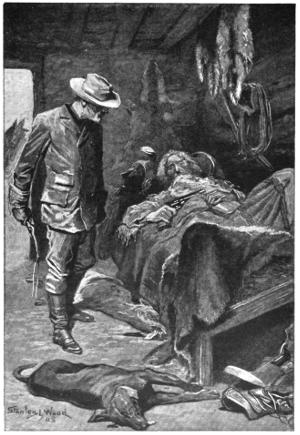
“HE LAY STRETCHED OUT ON HIS BLANKETS, DEAD, WITH HIS TWO DEAD HOUNDS BESIDE HIM.”
I examined the injured foot and understood the whole thing.
Wolfie had doctored himself, but the wound had got worse and worse, and at last the old fellow, in awful, never-ending pain, had drunk himself half-dead and completed the work with his trigger finger.
Meanwhile the weather had been growing gradually colder, and the wind started to moan as I fastened the door from the outside, after quitting that abode of death. The sky, too, was rapidly darkening, and Pete shook his head up and down and stamped uneasily.
Mounting, I rode off; but I had not been going long when, away in the distance, I heard the dismal, long-drawn howl of a prairie wolf, then another, and another. Not till that moment did it flash upon me what an all-round fool I was.
I had brought no revolver with me. It had started to snow, evening was drawing in, and there were those gaunt brutes in the distance—yet I had no protection against either the weather or the wolves. I touched up old Pete, and we started to travel fast for home.
We had not gone more than a mile farther before a real, genuine blizzard sprang up. How it came down! Waves, absolute waves of snow, whirred, cut, and beat about my face, while the wind howled and shrieked dismally.
Then I did the worst, most foolish thing a man could have done. I tried to guide old[275] Pete! I steered him, and, though Pete knew better, he obeyed; and so, between a good old horse and a fool of a young man, we made a fine mess of it. We got lost, tangled up, with the snow whirling about us in sheets. Every minute it got deeper and thicker, and at last poor old Pete staggered, tried vainly to right himself, fell over, and collapsed.
Try as I would I couldn’t get him up, and—well, I fear I lost my nerve, what with the blinding snow and the distant howl of those wretched wolves.
As the snow beat down upon me, piling up pitilessly over the now stiffening form of the poor old horse, I thought it time to move on. To stay where I was meant being frozen to death, to go on might mean the same; but there was just a chance, and I stumbled forward and took the chance.
Heaven only knows how long I ploughed and pushed through those awful snow-drifts with the falling flakes eddying about me in clouds; I lost all account of time. I went stumbling blindly forward until I seemed not to be myself, but just some machine without feeling or hope, mechanically pulling one foot before the other, and groping through the freezing dark.
I was just beginning to experience a drowsy, comfortable feeling, when—bump!—the little sense left in me was nearly knocked out as my head struck against something hard.
That deadly, comfortable feeling left me at once. I felt about in the darkness and touched boards. It was a cabin! With my half-frozen hands I hammered at the woodwork, and I shall never forget my feelings as a door opened and I was pulled in out of the storm, the door banging to behind me.
I couldn’t speak for a minute, and my eyes were blurred coming in from the darkness and snow, but when they got accustomed to what little light there was I didn’t feel I wanted to say much.
Before me was a giant. He must have stood a good six-foot-six, but all I could see of his face was his eyes. He was masked in what was called in those days a “storm-cap,” which completely hid the face of the wearer, showing only the eyes. A long, heavy overcoat, with collar upturned, reached to his ankles.
“Having arrived here, stranger,” he remarked, in an unpleasant, metallic sort of voice, with a half laugh, “and it now being near Christmas Eve, I’d be interested in knowing how you managed to bump up against this building.”
This was not the sort of greeting one would have expected under the circumstances, and the man’s language did not smack of the prairie, but I was too weak after my exertions and too thankful to be out of the storm to notice trifles, and so I told him as briefly as possible that I was lost, and should be grateful if he would give me shelter for the night.
“Shelter?” said he. “Shelter? Yes, why not? All the shelter a man could want. I wouldn’t turn a dog out such a night like this. Yes, stranger, you can sleep here to-night, nice and quiet. I’ve nothing to give you to eat, but there’s whisky here. Being nearly Christmas Eve, drink up, and then—go up!”
As he spoke he poured whisky from a demi-john into two tin mugs and picked up a lantern. Then, for the first time, I saw there was a rough ladder, up which he went to a room above.
Now all shacks, dug-outs, and cabins I had seen hitherto were of only one storey. There was something uncanny about the man and the place, and tired and knocked up as I was I did not drink the whisky; I just wetted my lips with it as my host’s feet clumped around above, and ere he descended I carefully poured the contents of the tin cup into the ramshackle stove.
“Now, up you go and sleep the sleep you’ve asked for,” said he, when he came down. “A merry Christmas to you!” With that he tossed off his whisky at a gulp.
Up I went through the rough opening; it was not a trap-door, for there was no flap to shut down. I found myself in a kind of loft, in which was a wooden apology for a bed, heaped over with some evil-smelling blankets. All this I saw by the light of a guttering candle stuck in the neck of a cracked bottle. Though I was very, very weary, all thoughts of going to sleep went out of my head. I distrusted that sinister-looking fellow below.
Pulling my flask from my pocket, I look a long drink, and the neat spirit gradually warmed me. Then I sat down in the semi-darkness to think.
Suddenly an inspiration came to me. Taking out my medicine-case I quickly charged a syringe with whisky. This frail thing, in case of attack, was my only weapon, with the exception of the cracked bottle holding the candle.
As I crouched there in the attic there came crowding into my memory stories of lonely travellers lost on these plains who had left not even a button to tell how or where they had gone. There had been talk during the last month of at least three men, settlers near the Fort, who had mysteriously vanished, leaving not the faintest clue to their whereabouts. At first their disappearance had been put down to raiding parties of Utes, but careful scouting by some of the best men disproved this theory.
Why should these thoughts come to me now? I asked myself, uneasily. Could that villainous-looking[276] giant below have had anything to do with the disappearances? Lying prone, I peered cautiously through the trap, striving to see what was going on below. Indistinctly I saw the big man fill his tin cup three times and drain it off, muttering the while. Then, struck by a sudden inspiration, I went back to the bed, pulled off my coats, and heaped them up in a bundle on the bed to resemble as much as possible a sleeping form. Next I took off my boots and hat and placed them also in such a position, partly covered with the blankets, as to suggest the idea that, worn out with fatigue, I had thrown myself down to sleep fully clothed. Then I blew out the light and, keeping the bottle in my hand, crept again to the opening by the ladder head.
What I saw made my blood, which was chilly already, go colder yet.
The big man was taking off his overcoat. He threw it to the floor, and from his waist detached a belt from which dangled a heavy revolver and a long bowie-knife. The latter he drew from its sheath, running his thumb caressingly along the edge; then he laid it on the table.
Crossing the room he returned with an iron bar about three feet long. I heard it ring as he dumped it down on the table near the knife.
Then, tossing off more whisky—this time from the demi-john—he snatched up the bar and lantern and unsteadily approached the ladder. So my half-formed suspicions were correct; he meant to murder me!
With my heart beating like a sledge-hammer, I silently crouched behind the bed.
Never, if I live to be a hundred, shall I forget the next few minutes. He emerged through the opening, tiptoed to the bed, swung up the bar, and with a dull thwack brought it down just where my head might have lain. Again and yet again he thrashed and beat the tumbled clothes. Then, as he paused, from my place of concealment I squirted the whisky from the syringe straight into his eyes. Dropping the bar, he staggered and rubbed at his eyes, swearing horribly. As he reeled, half blinded, I sprang up and brought the bottle down with all my strength on his head, at the same time giving him a sideways push that sent him crashing through the opening to the floor below.
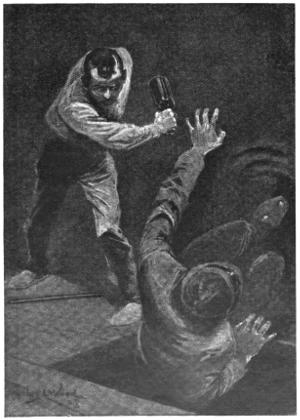
“I SENT HIM CRASHING THROUGH THE OPENING TO THE FLOOR BELOW.”
I was trembling in every limb with excitement, but I managed to get my boots, hat, and coats on.
Then I cautiously descended. I had no doubt that the fall had killed him, but I felt no pity; it was either his life or mine. Greatly to my surprise, however, the giant was still breathing. He lay huddled up at the ladder-foot, with blood on and about him. I tied his hands with a rope, and then, turning him on his chest, cut away the back part of his flannel shirt collar with his own villainous bowie-knife. Next, taking the small phial of vitriol from my case, I spilt a few drops on the back of his bare neck. The awful burning partly restored his senses, and he moaned. I had no compunction, but proceeded to tear the visored cap from his head.
I have never seen such a fiendish face in all my wanderings! The lower part was covered with a thick jet-black beard and moustache, but the face, taken altogether, was that of a murderer—the most horrible, wolfish-looking visage I have ever gazed on. Like a cornered wolf, even as he slowly revived he struggled and snapped to break the cords that bound him, cursing savagely in his semi-drunken frenzy.
Many a man would have shot him out of hand with his own weapon; but I could not bring myself to that. I had left an indelible mark on him, however, that he would carry with him to the grave, and should we ever meet again there could be no disguising those awful eyes and his enormous proportions. But, unless I killed or disabled him, it was obviously unsafe to remain in the cabin. The storm had now ceased, so taking the villain’s revolver, and leaving him struggling to unfasten his bonds, I set out to try to find my way to the Fort, hoping against hope that I should soon sight some familiar landmark.
How long I blundered over the snow before I lost consciousness I do not know, but I remember it flashed upon me once that this was the dawn of Christmas Eve! Then I felt myself getting drowsier and drowsier.
When I recovered my senses it had to be explained to me how I came to be in bed back at my old quarters at Fort Hayes, minus two toes, which I had bequeathed to “Jack Frost” during my stroll over the snow-clad prairies.
A merciful Providence and three friendly Utes had found me and brought me in. If it had not been for Black Cloud, one of the three Indians, and a pretty big chief in his way, this story would never have been told. He was the means of saving my life, and I thankfully presented him with the big revolver I had taken from the rascal at the hut.
Guided by Black Cloud, some of the boys and scouts a few days later located the spot where the Indians had found me unconscious, slowly freezing to death. From there they hunted in all directions, and at last found the two-storeyed hut—empty.
It was miles from the way I ought to have taken when I left the trapper’s shack, which showed that trying to guide my poor old horse was the worst thing I could have done.
Later, when the weather broke and I was able to get about, I got two of the boys to ride over to the hut with me.
My tale had sent search-parties scouring the countryside to try to run the would-be murderer down, but they never got him. What made the settlers and the sheriff more than keen to catch him was the gruesome discovery the two scouts and I made at the hut—three male skeletons, with their skulls smashed in, roughly buried in the earth! I thought of the iron bar and shuddered at my narrow escape.
Three years after I happened to stroll into a crowded court-house in San Jaleta, Southern Texas. A man was on trial for the murder of a lonely rancher, and seemed likely to be acquitted, for the evidence was too slight to convict him. There was no doubt that the motive of the crime had been robbery; and there was no doubt, when I’d had a good look at the prisoner, as to who he was. He was clean-shaven now, but, nevertheless, I remembered those awful eyes. Making my way to the front, I asked permission to give evidence for the prosecution.
After I had told my story—although it took five men to master the prisoner—the sheriff at last laid bare the scar on the neck where my vitriol had branded him the night of the storm.
Some of the crowd in court were pretty well worked up over the manner in which the lonely ranchman had been done to death, and the tale I told did not help to calm them. That night the jail at San Jaleta was “held up” by an armed mob, and when the sun rose it shone down on the body of a giant dangling from a telegraph pole at the end of a lariat.
That’s my story, and every word of it is true. I am afraid it’s taken a bit long in the telling, but I never hear the wind howling and moaning on a Christmas Eve as it does to-night without thinking of that other Christmas Eve on the Kansas plains so many years ago.
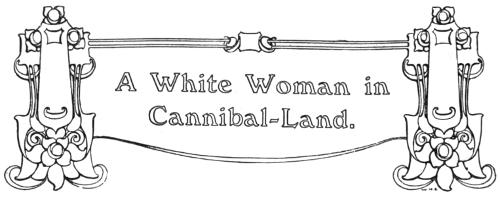
By Annie Ker.
Some incidents of a lady’s life in the wilds of New Guinea. Miss Ker went out to Papua—as the country is now called—attached to a mission, and describes the many strange, amusing, and exciting experiences she encountered during her seven years’ sojourn among the natives, who, not so very long ago, were always fighting and much addicted to cannibalism—a practice which still prevails among the wild tribes of the unexplored interior.

In many Papuan villages the visiting magistrates have raised one of the chief men to the rank of local policeman, rewarding him with the princely salary of ten shillings per annum (usually paid in tobacco) and two uniforms. The latter consist of a neckless tunic with long sleeves, and a strip of dark blue cloth covering the wearer from waist to knee. A flaming red belt lends colour to the costume.
The Wedau policeman lived a peaceful life on the whole, though when an energetic magistrate swooped suddenly down on the village the functionary’s life was, for the time being, scarcely worth living. Luckily, the magistrate’s little vessel could be seen directly it rounded the cape and long before it had crossed the bay, so that there was time for preparations. Women set frantically to work with handfuls of stiff stalks, which served as brooms, and swept fallen leaves into heaps, which were immediately burned. Children buzzed backwards and forwards, carrying loads of stones and rubbish, which they threw into the swamp on the beach. “Gabemani” (Government) had ordered it to be filled in long ago, but the villagers preferred swarms of malaria-disseminating mosquitoes rather than exerting themselves to do away with the cause of them.
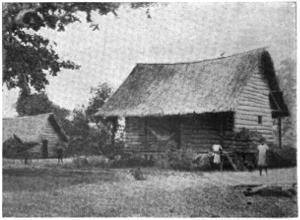
THE HOUSE AT WAMIRA WHERE THE AUTHORESS LIVED FOR SEVEN MONTHS, SPENDING AN EXCITING TIME OWING TO “EVIL SPIRITS” AND NATIVES “RUNNING AMOK.”
From a Photograph.
The magistrate would find the village suspiciously neat and clean, and after trying a few cases of petty theft would sail away satisfied, leaving the policeman to distribute small[279] portions of the tobacco he had received and to enjoy his hard-earned rest.
Another of the officer’s duties was to make journeys into the interior and capture murderers, when such were heard of, and convey them down the coast to Samarai to be tried. I saw one insignificant-looking little man on his way to jail, whom I knew to have committed a cruel murder. A white man named Sexton, a “fossicker,” whom we had entertained at the mission station, had gone a few miles inland in quest of gold. One day, while seated at his midday meal, he was seized from behind and his throat cut. It seemed that a native of the village had died while working for a white man; therefore, in accordance with Papuan ideas of justice, the next man of that race who came along had to be slain in revenge for the native’s life.
The first photograph shows a house at Wamira where I lived for seven months soon after my arrival in Papua. The missionary for whom it was built was going on furlough, and during her absence I was in charge there. It was situated on the edge of a coral cliff which rose straight up out of the sea, so that the Pacific Ocean was, so to speak, at the door. Close by was another house, used as a dormitory for the village girls who came as boarders to the mission. There was also a boys’ dormitory and a kitchen. This kitchen one day caught fire and was burnt to the ground in a very little while. I rushed in and saved the pudding from the oven, while the pupil-teacher, a Papuan boy, brought out our tin of kerosene before it ignited. The kitchen was the only building that suffered, and the villagers promptly built me a new one for five shillings, labour and materials included! From this it will be obvious that there is not much scope for a fire-insurance agent in Papua.
My house was divided into two apartments, a bed and a sitting room, and was built of native timber, the walls being composed of plaited coco-leaf and the roof of grass. The floor was made of slender strips of wood laid side by side, and, though airy, was anything but durable. It was slightly discomposing to see a small boy enter at the doorway and then suddenly disappear through a gap in the floor, though, having sufficient presence of mind to spread out his arms, he was able to hold himself in that position until someone could rescue him. For windows I had openings in the leaf walls, closed when necessary by means of wooden shutters.
Soon after I took charge the girls became much alarmed on account of some midnight visitor who, they said, had tried to get into their house. The natives were inclined to think the intruder was a prowling “bariawa,” or spirit, and there were frightened faces and hushed voices among them as night fell. Unfortunately, I was a heavy sleeper, and was usually only roused by the girls’ shrieks after their mysterious visitor had left. A few of the elder boys sat up one night, but saw nothing. Some barbed wire was sent me, and complicated and formidable entanglements were constructed between the girls’ house and mine. Soon after they had been placed there, however, when we were congratulating ourselves that we were safe at last, a little village child who was playing near fell over the wire and severely injured himself, so I had to order the entanglement to be taken away. One of the missionaries then lent me a revolver, but I am sure I should never have been able to use it, even on a spirit. However, I showed it to the old chief, and published the news of my acquisition, and soon afterwards we were relieved to find that our mysterious visitor came no longer.
Another source of excitement at Wamira was a kind of madness which attacked a man now and again, a state of exaltation somewhat resembling the Malay “amok.” At first the victim only sat in the house suffering from “heat in the heart.” Then, after muttering unintelligibly, he would seize a handful of spears, rush out of the house, and career wildly through the villages, flinging the spears to right and left and shouting as he ran. Women would come shrieking to my house and take refuge inside the fence, hoping to be safe with the “foreigner.” Once one of these half-crazed men, exhausted after an attack, came up the path and demanded water. I gave him some particularly nauseous medicine, which he drank greedily, afterwards asking for more. On another occasion one of them, who had already aimed a spear at a villager, came on to the school, where the pupil teacher and I had our flock of fifty or sixty children. Seeing him approaching, however, we hastily closed and barricaded the doors, standing the siege until the old chief influenced our would-be assailant to withdraw.
When my predecessor returned to her work a somewhat similar house to the one I have described was built for me at Wedau, where I remained for nearly two years. Ordinary village houses are built in very much the same style: they possess only one room, and the supporting piles are higher. The means of access to the interior is a sloping pole. These odd “staircases” have slight notches cut in them, which afford very slight purchase for a shod foot, though the nimble natives run up and down them easily enough.
While I was living at Wamira news was[280] brought of a murder in the hills. The girl who came to tell me said that her uncle had taken a journey there to obtain betel-nut. On the way he heard voices and promptly hid himself. From his place of concealment he saw two men attacking a third. One held the victim’s arms while the other cut his throat with a “gatigati” (long knife). As he did so the dying man cried, “Au dobu, au dobu!” (“Oh, my home!” or, literally, village). The hidden onlooker, being a Papuan, did not dream of interfering. His “skin trembled,” he said, and he hastily made his way back to safety.
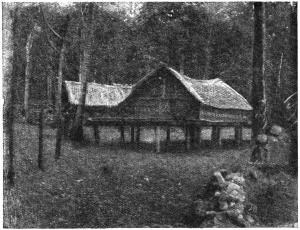
A TYPICAL PAPUAN HUT.
From a Photograph.
The village policeman went out to capture the miscreants, and was successful in bringing one to punishment. The crime, it was discovered, had been committed for a very simple reason. The dead man had been visiting a sick friend, who was the murderer’s brother. The invalid received every kindness from his friend, but eventually, in the course of nature, died. Therefore, argued the murderer, it was clear that the visitor had bewitched the sick man and caused his death, and his own life must necessarily be forfeited.
The hill-folk generally only came into prominence through committing murders or other crimes. Being removed from the coast, and able to hide in many obscure caves and lurking-places, they naturally stood less in awe of the power of Government than the coastal tribes.
One day we were visited by two hill-women who had run away from their husbands. Their bodies were covered with hideous raised scars, the result, they assured us, of spear-thrusts inflicted on them by their inhuman partners. They were in much fear of being pursued, but were given shelter for the night at Dogura, the head station on the hill behind Wedau, where I was living.
That same evening I was startled by cries from the village. The natives called to me to bring my lantern, and I ran down to find the place in an uproar. The men were rushing about, searching and looking up in the trees, while the women were huddled together, talking excitedly. I managed to make out that the husbands of the two fugitives had traced them as far as Wedau. One of the men had lurked outside a house in the village, and, so a woman averred, would have speared her as she came out, thinking her to be his missing wife. Fortunately for herself, however, she spoke, and he, knowing her by her voice to be a Wedauan, ran off in the darkness.
The villagers searched in vain, and the tumult subsided, but rumours soon reached us that the baffled husbands were collecting a force and intended to visit the head station at night and carry off the recalcitrant wives by force.
It was not thought safe for me to sleep alone in the village, so I went up the hill to add one more to the crowded house. Our girl boarders were packed in dozens into the different bedrooms, having forsaken their native dormitories for the night, and I was accommodated with a cane lounge. It was not furnished with mosquito curtains, and I decided by morning that even the hill men’s spears could scarcely be sharper than the bites of the vicious insects. No invaders arrived, however, so we put the story of their intended raid down as an idle rumour. The women stayed with us for some weeks and then slipped away. Some months later a policeman from up the coast told me that the brothers of one of the injured wives had taken summary vengeance on her husband, who paid for his cruelty with his life.
We got excellent drinking water from a little stream, though care was necessary in selecting the place from which to draw it, as the village pigs were only too apt to bathe indiscriminately. The natives used water-bottles made from hollowed coco-nut shells, fitted with a stopper of twisted leaves, and carried six or seven at a time in a netted bag suspended from the head.[281] One of my girls, with a fine disregard for proportion, styled them “New Guinea tanks.”
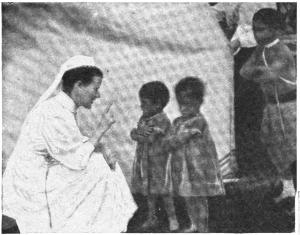
“TOMMY” AND “TEDDY,” THE TWO LITTLE MITES WHO WERE SAVED BY THE MISSIONARIES FROM BEING BURIED ALIVE.
From a Photograph.
The natives of Papua have some very curious superstitions, giving rise to barbarous customs. For instance, a woman gave birth to twin boys. The mother died, and the villagers, coming to the conclusion that the infants were accursed, decided to bury the hapless babies alive on the woman’s grave! This terrible deed would actually have been carried out had not a native who had come under mission influence told his teacher what was intended before it was too late. The missionary was thus able to save the little mites, who were taken care of by a nurse. She is seen in the annexed photograph with “Tommy” and “Teddy” when they were a year or two old. Other babies, for various superstitious reasons, have been killed at birth or hung in trees to die a slow and terrible death from starvation.
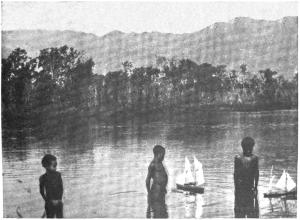
A PAPUAN SERPENTINE—NATIVE BOYS SAILING THEIR HOME-MADE BOATS IN A LAKE.
From a Photograph.
A favourite pastime with the village boys was sailing model boats, which were surprisingly well made. The picture at the bottom of the page shows lads sailing their “sikunas” (schooners) at a Papuan “Serpentine,” for all the world like youngsters at home.
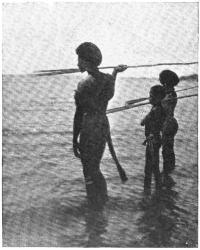
PAPUANS FISH-SPEARING.
From a Photograph.
Favourite sports, though their object was utilitarian enough, are fish-spearing and pig-hunting. The natives are wonderfully quick in detecting the presence of a fish under the surface, and the many-pronged fish-spear, shooting violently downwards, is more often than not recovered with a brightly-coloured victim impaled upon it. The snapshot above shows a group of Papuans, spear in hand, watching for fish in the shallow water.
The lower picture shows a number of fishing-nets hung up to dry. These are made, of course, by the natives themselves. The twine is woven from the peelings of liquorice-stalks netted together, the floats are light pieces of wood, and the sinkers are cockle shells in which holes have been bored.
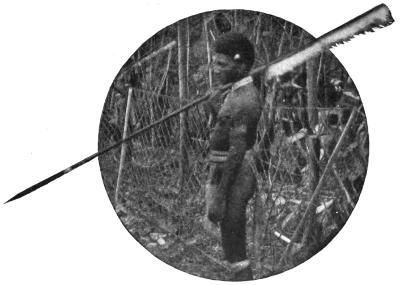
A NATIVE WAITING TO SPEAR DRIVEN PIGS.
From a Photograph.
Pig-hunting is carried out in a very thorough fashion. Stout nets are placed across the forest paths and clearings, and one party of natives then beat the jungle, driving the game before them, while the spearmen wait, as seen in the photograph, for the arrival of the quarry.
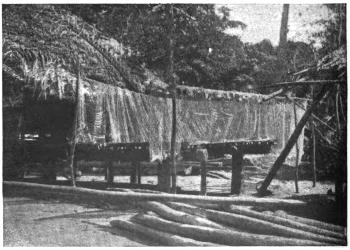
DRYING NETS—THE NETS ARE MOST INGENIOUSLY MADE FROM THE PEELINGS OF LICORICE-STALKS, WITH WOODEN FLOATS AND COCKLE-SHELL SINKERS.
From a Photograph.
Although stationed in a village, I often took short trips to other places, travelling either by canoe or whale-boat. The native canoes are made of logs, hollowed out with much labour, having an outrigger attached and a small platform lashed between the two at either end. This the passengers—myself and often Maebo, my little girl friend—shared with the cargo. Canoes were of many shapes, varying according to the tribe of the maker. Canoe travelling was idyllic in calm weather. Sometimes a turtle would lift his lazy head and take a long look at us before[283] diving, and we could gaze far down into the depths of the crystal water and watch brilliantly-hued fish disporting themselves among the branches of still more dazzlingly-tinted coral, while the golden sunlight filtered mistily down in cloudy rays. The crews paddled well, and we crossed the bay in fine style, the men being quite content with a penny each as wages.
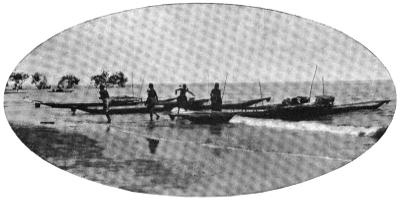
A GROUP OF NATIVE CANOES—THE AUTHORESS MADE MANY TRIPS IN THESE FRAIL CRAFT.
From a Photograph.
But, alas! it was very different in rough weather. Tired and hungry, perhaps several miles from my destination, the captain would call to me, “Misika (my native name), you’ll have to get out and go by the beach, for the wind is rising.” My heart would sink, and I would beseech him to make the crew paddle on; but the wind caught us up, and the waves broke mercilessly over the little vessel, which was hugging the shore. Then, perforce, after a thorough drenching, I got out, the canoe was hauled up, and we tramped wearily home, the captain carrying me over the streams on his back. This was rather a pleasant mode of crossing; but when the stream was very deep I had to sit on the boy’s shoulders and hold on to his chin, which—I speak from bitter experience—is a very unsafe position. Once, with myself thus perched on high, we attempted to cross a wide river at the mouth of which some natives were fishing with a drag-net. It so happened that when we reached mid-stream—I holding only too insecurely to a wobbly chin—something very special, I don’t know what, occurred in connection with the fish, and we were ordered to remain where we were! It seemed impossible, but there I remained, clinging desperately to my human steed, until the slow old fishermen had gathered their net in and—to my rather malicious satisfaction—discovered not a single fish in the meshes.
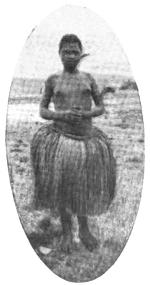
MAEBO, MISS KER’S LITTLE TRAVELLING COMPANION.
From a Photograph.
My little girl companion, Maebo, who is seen in the annexed photograph, had much charm of manner, but was not exactly pretty. She wore, as did all Wedauan woman, several skirts of shredded coco-nut leaf; she had even, while teeth, pretty hands and arms, and a satiny brown skin. On the many occasions when she shaved her head, and even her eyebrows, her appearance was certainly not improved. She was a nice child, however, and accompanied me on many journeys.
Maebo was betrothed to a village boy by her father when she was only ten years old, though that did not prevent many others from wishing to marry her. But she would have none of them, not even the highly educated, who applied for the honour of her hand by letter. She would not marry out of her village, she said,[284] for fear of her life being taken by a sorcerer. A short time ago her fiancé became her husband, and so I lost my travelling companion.
Suicide is committed in Papua for what would seem very inadequate reasons to white people. For instance, if a man goes on a long journey without bidding farewell to his nearest relatives, one of them may feel it incumbent on him to climb a coco palm and fling himself off it to his death. A village girl who was very anxious to accompany me on a trip up the coast finally reluctantly refused to go. If she did, she said, her father would “throw himself from a high tree.”
Ridicule and opposition are always very trying to a Papuan, and a sad case of double suicide took place in consequence of the latter.
A girl and a young man became much attached to each other and met regularly. Each morning, however, the girl’s father and mother would say to her, “Why do you talk to that boy? He is poor, and has not enough food to give you.” At the same time the boy’s parents told him continually how foolish he was to have anything to do with a girl who would never do good work for him at the gardens. The constant opposition told on the unhappy couple and at last the girl’s patience wore out. She said to her lover—the speech is truly characteristic of a Papuan—“The tongues of our people will never be silent. Let us cease to live, and their talk will be done!” And the boy agreed.
The next night they decked themselves in their best ornaments—necklaces, shell armlets, and sweet-scented flowers—so that they appeared as though dressed for a feast. Then they took a piece of tough jungle creeper and, having made nooses, bade farewell to each other. They were found when morning came hanging dead in the same tree.
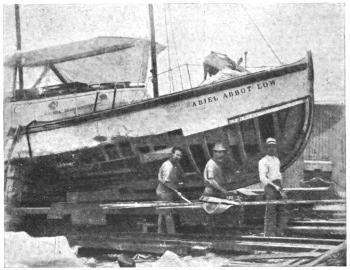
THE MISSION LAUNCH UNDER REPAIR—PRACTICALLY EVERY KIND OF MISHAP SHORT OF BEING BLOWN UP HAS BEFALLEN THIS HARD-WORKED LITTLE VESSEL.
From a Photograph.
The mission launch was, on the whole, my quickest mode of travelling—that is to say, as long as it was whole. As seen in the accompanying picture, it is being repaired after one of its many mishaps. It would be quite beyond me to relate all the adventures that have befallen it during its period of existence. It has not, I believe, been blown up yet, though it came perilously near it when on fire once, for an over-zealous native, imagining the benzine tank to hold water, was only hindered just in time from chopping it open with an axe!
(To be concluded.)

The second instalment of a budget of breezy little narratives—exciting, humorous, and curious—hailing from all parts of the world. This month we publish a humorous Canadian episode and a terrible affair which occurred on an American train.
By J. K. Strachan, J.P., of British Columbia.
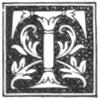
This amusing little story was told to me by Mr. John Wood, in the Tecumseh Hotel at Winnipeg. He happened to see there the character I have called “Slippery Dick,” whom he had known in 1881 or 1882 at a small village near London, Ontario, where he then lived, and the sight of the man recalled the facts to his mind. As most of the parties concerned are still living, I have thought it advisable to alter the names.
Dick Small was his name, but we called him “Small Dick,” or “Slippery Dick,” on account of his small and mean ways. Well, one night Sam Smart and I and several other boys were in Steve Brown’s bar, “talking horse,” when old Dick came meandering in, and, of course, chipped in with some of his usual boasting.
“I’ve got the best little mare in the settlement,” he told us, “and don’t you forget it. I’m game to back that little bit of horseflesh for fifty dollars for a mile, twice round the half-mile track, against anything you can produce in these parts. Who’s got anything to say? I’ll run her now, to-morrow, or any time.”
“You ain’t produced the collateral,” put in Sam, quietly.
With that old Dick thrust his hand into his back pocket and drew out quite a wad. Counting out five ten-dollar bills, he put them on the counter.
“Now, Steve, you’re stakeholder,” he said. “Who’s going to cover ’em? It’s put up or shut up.”
Sam got up, and, putting a fifty-dollar bill on top of Dick’s, replied, “I’ll jest take that bet. Hold the stakes, Steve.”
“All right,” said Steve, and pushed the money into his safe.
The boys all looked at Sam, puzzled like, and old Slippery was wondering what it all meant.
“Didn’t know you had a horse, Sam,” he remarked.
“You don’t know everything, Dick,” returned Sam, “but I ain’t surprised, for I only brought him home to-day. Well, let’s settle the time for the match. To-morrow morning at eight o’clock will suit me. I don’t want a crowd to know too much of my horse’s points, so we’ll do it on the quiet.”
The old man agreed to this, and Sam went on: “And now, as I’ve got to see some business, I’ll say good-bye, boys. Say, Steve, a word with you before I go.”
Steve and Sam went into the back room, and in about five minutes Sam came out and walked off.
The boys and Slippery hung around, and you could see the old miser was uneasy about his fifty dollars. So he began a-trying to pump Steve. “Say, Steve,” said he, “what kind of a horse has Sam got?”
“Don’t know; ain’t seen him,” replied Steve.
“You don’t know anything about him, I suppose?” inquired Dick.
“Only what Sam told me, and I don’t suppose he wanted me to repeat it. But as the bet’s made I don’t see that it matters. He told me that he covered fifteen miles with the horse yesterday in less than three-quarters of an hour, and he landed it fresh as paint; hadn’t turned a hair.”
“Gee whizz!” ejaculated Slippery, in dismay. “I’m a goner! I don’t know what I’d better do. I’ve a note to meet at the bank to-morrow, and if Sam wins my money I sha’n’t be able to come up to time on the note, and it’ll go to protest. Everybody’ll know it and my credit will be gone. What a fool I was!”
“Well, Dick,” said Steve, “I’m sorry for you, but it’s your own fault; nobody asked you to bet. Say, Sam’s not a bad sort when he’s treated right; couldn’t you tell him you forgot an important engagement for to-morrow, and ask him to agree to draw the bet? Maybe he would if you put it to him right.”
“Think he would, Steve?” asked Dick, doubtfully. “Wonder where I could find him?”
“I think I know where he could be located, and if you like I’ll send my boy Jim to bring him along.”
“Thanky, Steve. I wish you would,” said old Dick.
Soon after the boy returned, and close behind him came Sam. Looking round, and seeing old Slippery and nearly all the boys still there, he asked, “What’s up? Want to double the bet, Dick? If so, you can be accommodated.”
Steve, pretending to side with old Dick, explained that the old man had forgotten a particular engagement and had to go away for some days. As accidents might happen, he thought it would be better to cancel the bets and arrange a fresh match later on.
But Sam took it badly, angrily demanding what sort of idiot they took him for. “Draw bets? Not much!” he cried. “I’ll double it, if you like.”
Then he turned upon Dick Small, who was looking mighty miserable. “You old rascal,” he went on, “I know what it is—you’re afraid you’ll lose your money. Serve you right! You wanted to back your old mare, didn’t you? No one asked you to. Draw bets, you say? No, siree, not by a jugful!”
“Look here, Sam,” said Steve, “don’t be too hard. You think you’ve got a sure thing, but accidents might happen even on your side. Why don’t you two compromise? Supposing Dick allows you something for your trouble and sets up drinks for the crowd?”
“What do you mean by a compromise?” demanded Sam. “If Dick forfeits half his bet, that would be about fair, I should say.”
“Oh, I couldn’t do that, really,” cried old Slippery, in great distress.
“Very well,” said Sam, “then the bet stands. Good-bye; I’m busy.”
“Hold on a bit,” put in Steve, and, drawing the old man aside, he whispered to him for a minute or two. You should have seen the different emotions which chased over old Dick’s face! At last, however, he seemed to agree with Steve; and then Steve, addressing the crowd, told us that he quite understood the matter. The proposition he had to make was that Dick should pay Sam ten dollars and stand a double treat round for the crowd. If the boys now present considered that fair, he added, he thought Sam, as a sportsman, should accept.
“Do as you like,” said Sam. “I’m tired of the whole thing.”
So Steve took the votes of the company. A few thought the bet ought to stand; but the majority, being pretty thirsty, were in favour of the proposition, and it was finally carried, Sam getting back his fifty dollars and ten dollars of old Slippery’s. Steve charged three dollars for the two rounds, and gave the old man back the remaining thirty-seven dollars.
“Say, Sam,” said old Dick, just as he was going, “I should like to see your horse, if you have no objection.”
“Why, certainly,” replied Sam. “Any time you like; if I’m not at home, ask the missus.”
When Dick had gone the boys all started asking questions about Sam’s horse, but all he would say was, “You’ll know all about it by and by.”
Next day, as Sam expected, old Dick went up to Sam’s place. There was only the missus at home; Sam took care to be out of the way.
“Mornin’, Mrs. Smart,” said Slippery, politely.
“Good morning, Mr. Small,” answered Mrs. Smart. “What brings you round these parts?”
“Why, Sam said I might see the new horse if I came up.”
“I don’t see why you should be interested in such a thing,” said Mrs. Smart, looking puzzled, “but you can see it if you want to. It’s in the kitchen.”
Old Slippery was taken aback; he thought he must surely have misunderstood her.
“In the kitchen?” he echoed.
“Yes, in the kitchen, standing by the stove,” replied the woman. “You can go right in and look at it if you want to, but what there is to see in it I can’t make out.”
The old man, not comprehending things at[287] all, went through into the kitchen and looked around. But the only horse he saw there, if he expected to see any other in such a place, was a new four-legged clothes-horse with a few articles hanging on it to dry!
In an instant he realized the trick that had been played upon him, and very nearly went crazy. He stamped and swore, while poor Mrs. Smart wondered what it all meant, or if the old man had suddenly gone mad. Presently, however, she commenced to smell a rat.
“What fool trick has that man of mine been up to now?” she asked.
“I don’t know about a fool trick,” screamed the old man, “but I do know that he has swindled me out of ten good dollars, besides making me pay three dollars for a double round of drinks for all the thirsty loafers down at Steve Brown’s saloon. But I’ll get even with him, the swindler, and with Steve Brown, too, and all his gang! It was a put-up job; I can see it all now. What a double-dyed fool I’ve been! But I’ll sue him—I’ll show him up!”
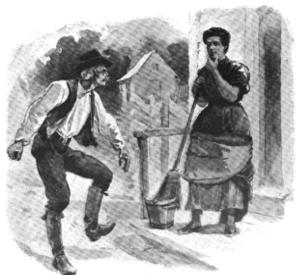
“I’LL SUE HIM—I’LL SHOW HIM UP!”
And away he went, leaving Mrs. Smart quite in the dark as to the cause of his wrath.
Still raving, the foolish old man came down town, where he saw Sam and Steve and some more of the boys. He promptly called them all a lot of thieves and crooks and swindlers, said it was all a put-up job, and that he would report Steve to the Licence Commissioners, get his licence cancelled, and make Sam return the ten dollars and Steve the three dollars he had for the drinks.
Steve heard him out quietly, and then told him to get out of his house. Dick would hear from him later, he said.
When Dick had gone, Sam and Steve went over to the town and told the whole story to Lawyer Harris. Sam said he had never thought of making any bet, but could not stand the old man’s everlasting boasting, so the idea struck him that he would work off a “bluff” on Small. He certainly had stated that he and his “horse” covered fifteen miles under forty-two minutes. It was quite correct, for he brought it in on the train. Moreover, he had stated that it landed “as fresh as paint”; that was true again—it had been freshly painted. He had said, further, that it didn’t turn a hair, and it didn’t—for the best of reasons.
The lawyer roared with laughter; it was the best joke he had heard for a long time, he said, and served the old skinflint right. “I’ll write and claim two hundred and fifty dollars each for Steve and Sam for malicious slander,” he added,[288] “and threaten him with a writ if he doesn’t pay up.”
The lawyer sent his clerk over to deliver the letter to old Dick, who read it over two or three times before he understood it. Then he nearly had a fit, but the clerk advised him to keep quiet and come over and see Mr. Harris, and perhaps they could settle things.
When Small arrived the lawyer let him have it hot and strong. He told him he was always thrusting himself in where he wasn’t wanted, and now, because for once he had overreached himself, he couldn’t take his medicine quietly, but must go calling people thieves and swindlers, in spite of the fact that he would have been glad enough to pocket Sam’s fifty dollars. If he defended the suit, the lawyer said, he would certainly have to pay damages and costs, besides making himself the laughing-stock of the country for miles around.
Dick saw the point and began to climb down, and finally Mr. Harris let him off on paying ten dollars each to Sam and Steve, another ten dollars for lawyer’s fees, and signing a letter of apology. And that’s the whole story, but I don’t think old Dick has ever made a bet since.
By Julian Johnson, of Los Angeles, California.
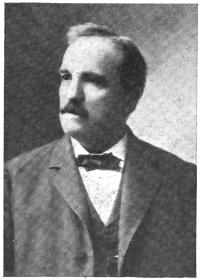
MR. CONLISK, WHO WAS THE CONDUCTOR OF THE TRAIN AT THE TIME THIS ADVENTURE HAPPENED.
From a Photograph.
Much of the history of railroading in Western America reads like a chapter from some “penny dreadful,” but none of the thrilling pioneer episodes surpasses in dramatic interest an incident which occurred a few years ago on one of the regular passenger trains of the Denver and Rio Grande.
The principal surviving actor in this singular tragedy is John Conlisk, who has now retired from active railroad service, and is at present living quietly at 2,717, Vermont Avenue, Los Angeles, California.
At the time of our story—March, 1892—Mr. Conlisk was a passenger conductor on the Denver and Rio Grande, running between Ogden, Utah, and Grand Junction, Colorado, making his home in the Utah city. This brief introduction is sufficient, however, and the rest may be narrated just as he told it to the writer recently.
The morning was crisp and clear and promised a bright March day. Shortly after two o’clock I was on the platform at Grand Junction waiting for No. 7, which I was to take back to Ogden. She came in on time, the few preliminaries attending the exchange of crews were finished as usual, and at three I was ready to go, when the conductor for the other division ran across the platform to me.
“Jack,” he said, “there’s a Chinaman in the ladies’ wash-room in the chair-car. He’s been in there two or three hours, and we can’t get him out. He’s in an ugly temper, and you may have trouble with him. If I were you I’d call the station officer.”
So I started on a hunt for that person, but he was not to be found anywhere, and after delaying the train two or three minutes I concluded to settle the matter with my own crew and passed the signal to the engineer. As we swung on board I spoke to my head brakeman, a young fellow named James Genong.
“There’s a Chinaman in the ladies’ wash-room in the chair-car,” I told him. “He’s locked himself in, for some heathen reason or other, and I wish you’d see if you can get him out without making any disturbance.”
I had a heavy load of passengers, probably two hundred in all, and after making my rounds, of course not disturbing the people in the sleepers, I went into the coach just ahead of the chair-car, and, with my train-box before me, sat down to count my tickets.
I had hardly finished my work when the door flew open, as though hurled by a violent gust of wind. Jim was behind it, with a pale, excited face. “Got a gun about you?” he asked, in a hoarse, frightened whisper.
“Why?” I asked, in astonishment.
“That Chinaman’s stabbed me!” he replied, looking furtively over his shoulder.
“Jim,” I said, getting up at once, “this thing[289] may be serious, but it can’t be settled by indiscriminate shooting in a train-load of passengers. We’ve got to find another way.”
I must here interrupt my story for a moment to tell you what had actually happened. Jim, thinking the Celestial an easy conquest, started after him before the train was fairly under way. In those days chair-cars carried the time-honoured stove and wood-box, and the brakeman, putting one foot on the edge of the latter and the other on an opposite ledge, peered down over the transom and ordered the Chinaman to come out in language that admitted of no misinterpretation. And the Chinaman did come out, ducking fairly under Jim in his elevated position. As he ducked he slashed upward with a great curved hunting-knife. The slash caught the white man on the inside of the thigh, producing a wound that bled profusely and probably gave a deal of inconvenience, but which was not really dangerous.
Seeing Jim streaming with blood, and believing that the yellow man was actually running amok, I started for the door, first telling the passengers in that car to lie down on the floor if they heard any shooting going on beyond.
The train was making good speed, but as I stood on the platform I could hear the culprit jabbering about, “Fiftleen hundled dolla! Me got plenty monee!” He commanded his end of the car, from which practically all the passengers had retired panic-stricken. The only exceptions to the general decampment were a fine-looking young chap from Bunker Hill, Illinois, who sat in a forward chair reading a book, and an army officer’s wife with a little baby, bound for Salt Lake City—in the seat opposite. These were directly under the Chinaman’s eye, and whenever they attempted to move he waved them back with a ferocious gesture of his great glittering knife.
Going to the door, which was locked, I rapped sharply on it with my ticket-punch. I had no revolver with me, but I hoped to distract his attention. And I did! Turning, he saw me, and with his face distorted with an expression of the most hideous savagery he drew back his arm, and sent it and the knife through the glass, clear to the shoulder, the blade just missing me!
Without more ado I pulled the bell-cord and ran into the forward car, where I borrowed a big Colt’s revolver from a cowboy I knew. Then, returning to the platform, I waited until the train had almost stopped, and dropped to the ground, catching the rear platform of the chair-car as the wheels ground down to their final revolution.
The frightened people were packed so densely against the door that I had to fight my way in, and then through them. The Chinaman, with his two quiet prisoners, had the whole front end of the car to himself. I called to him, exhibiting the pistol.
At the sight of that gun the most awful frenzy blazed in his eyes. He was a big fellow, and now, with the greatest deliberation, he rolled up his wide sleeves, disclosing a tremendous pair of arms, covered with heavy black hair. He looked like a typical Boxer on the war-path.
Then he started in my direction, but in a moment changed his mind about leaving a foe in his rear, and with the most calculating, revolting cruelty that I have ever seen swirled his great blade down over the seated boy’s head, and plunged it to the hilt in his body. Women shrieked and fainted, and I felt myself all but falling.
Raising my revolver I fired, and the ball broke his legs under him. He fell, and the army officer’s wife, with a terrible shriek, raised her baby to her shoulder and started down the car.
But in an instant the Chinaman was on his feet, wounded as he was, and struck the woman an appalling blow over the shoulder. She dropped like a stone—apparently stabbed to the heart.
I waited no more on the possibility of a high bullet glancing into the car ahead, but fired straight at his heart. Even with the crash of my pistol another sounded just behind me, and the yellow fiend fell headlong between two chairs.
Someone went over and kicked him, but the body gave no sign of life, and we devoted our attention to the unfortunate young man, who now lay huddled in a pathetic and bloody heap in his seat.
Others crowded around us, and at length I saw my cowboy friend approaching. Just as he reached me I was stooping over the Celestial’s first victim, in an attempt to raise him, when I heard the puncher yell, in an agonized voice, “For Heaven’s sake, Jack, look out!”
I glanced backward, and there was that colourless, diabolical countenance again blazing into mine. He was standing erect, and the knife was poised for a blow which would have given me my quietus. As I looked, certain that death was coming, I felt a wrench at my hip-pocket. It was the cowboy tearing his revolver out of my clothes. Even as the knife descended, my saviour jammed his weapon squarely into the Chinaman’s ear—and fired.
The big bullet, at that distance, almost tore his head to pieces. Blood was spattered over[290] all of us, in the most sickening way that could be imagined. Hating to touch the body, we pushed it under a seat and turned our whole attention to the wounded.
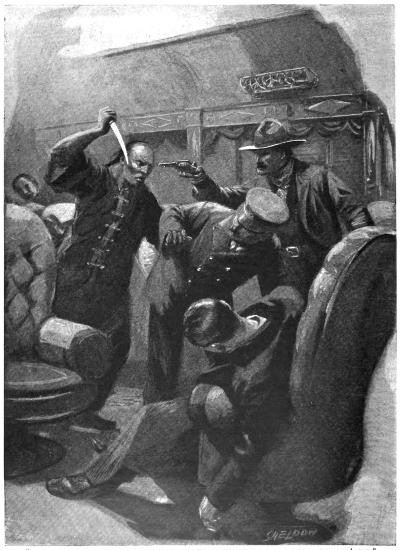
“EVEN AS THE KNIFE DESCENDED, MY SAVIOUR JAMMED HIS WEAPON SQUARELY INTO THE CHINAMAN’S EAR.”
The officer’s wife, strangely enough, had not a scratch on her. She was in a dead faint, but both she and the child were practically uninjured. The explanation of her escape seems to have been that the Chinaman’s wrist fell with full force on the baby, thus preventing the knife from doing any damage to either.
The poor boy, though conscious, was plainly[291] mortally wounded. He made no complaint, and smiled faintly as we carried him back to a vacant berth in one of the Pullmans.
About daylight, at one of the longer stops, several of the passengers dragged the murderer’s horribly-battered body forward to the baggage-car. They did not carry him, but dragged him, and, as it was in the spring, the road-bed was very muddy. When the body reached the baggage-car the features were absolutely hidden in a combined coating of dried blood and slime.
Then, as we got under way again, a physician on the train, with myself and others, searched the remains. The dead man had on two pairs of trousers, and, sewn inside his shirt, fifteen hundred dollars in greenbacks. In his purse he had a first-class ticket from Pittsburg to San Francisco and, what was still more singular, a paid-up life insurance policy for five thousand dollars in favour of one Ah Say, of Evanston, Wyoming.
We rolled the body into a corner and looked over his few effects. Presently one of the men, who was sitting on a trunk facing us, gave a peculiar gasp and turned as white as blotting-paper. His eyes were fixed staringly on something behind our backs. We turned with one accord.
The supposedly dead Chinaman—a Chinaman with a body as full of holes as a sieve—was sitting up! I cannot convey in words the indescribably hideous effect of that face, caked as it was with gore and filth. Only a ghastly red crack of mouth was visible, grinning in demoniac vacancy, and two burning black slants which indicated his eyes.
The doctor was the only man who had his nerve in that excruciating moment.
“Well, John, how d’you feel now?” he said, speaking in a tone that was even jocular.
The Chinaman did not deign to answer, but first felt carefully all over himself. Then he put his hand to what should have been his trousers pocket, and at length ran his fingers violently around the place in his shirt from which we had taken his greenbacks. That frightful malevolence came back into his eyes, and, never taking those snaky optics from our faces, he began to hitch painfully across the floor towards a stand in which were kept guns for emergency use, in case of train robbery. To me, his actions seemed like those of some dreadful automaton. Every man of us watched him—held motionless, as a rattlesnake holds its victim, by the spell of terror.
Slowly, painfully, he progressed. He gained inch by inch, and at last was almost within reaching distance. He stretched out his arms to the guns, and partially rose; then he fell over stone-dead—dead this time for good and all.
The doctor examined him, and reported his survival to be due to opiates, which he had taken in enormous quantities.
At Salt Lake City I received an order from Mr. W. H. Bancroft, then receiver of the road, to stop there with the crew, which included James Donohue, engineer, and Charles Francis, fireman.
We arrived there about three o’clock, and the young man was still alive, though fast weakening. In an ordinary conversational manner he told us that his home was in Bunker Hill, Illinois, that his father was a banker, and that, after leaving school, he had been sent on a Western trip before assuming the business himself. Informed of his grave condition, he expressed his best wishes for all of us, and went under the anæsthetic with a happy smile. He died without ever returning to consciousness.
At the coroner’s inquest it was decided that the Chinaman had suddenly gone insane from an overdose of opium, for, as the evidence showed, he had been pleasant enough during the day, and had talked to several ladies in the car, telling them that he had been recently converted to Christianity and that he proposed to preach in San Francisco. After his burial expenses had been paid, the balance of his money was forwarded to the Chinese Consul in the city toward which he was bound.
There was an amusing sequel to the tragedy, though an exasperating one in some ways. Some months afterwards the keeper of one of the eating-stations, calling me to one side, inquired rather pointedly, “Have you noticed that the Chinese seem to be afraid of you?”
I replied that I hadn’t given the matter any thought, either way.
“Well,” he added, “Agent ——, of the U.P. (an opposition road), has told all the Chinks in the State that you killed their countryman for his money!”
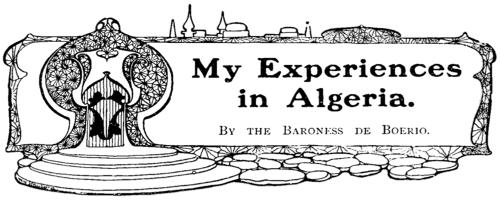
By the Baroness de Boerio.
The Baroness’s husband, an officer in the French army, was ordered to Algeria, and took his wife and children with him. There, located at a tiny post far from civilization, in the midst of fierce and unruly tribes, the authoress met with some very strange adventures, which she here sets forth in a chatty and amusing fashion.
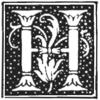
How well I remember the day when my husband, an officer in the French army, was nominated for service in Algeria! I was still plunged in slumber when I was suddenly aroused by a diabolical yell (if you ask my husband he will hotly deny this, but men can never be believed). I sat up, thinking the end of the world had come, and saw my husband frantically waving a white paper and shouting: “Named in Algeria—1st Regiment of Spahis! With a wife and children it’s impossible! Why am I married?”
“Well!” I said, still half asleep, but seizing the sense of the remark that referred to me. “You ought to know why you are married. What’s the matter with you? Do you want a divorce?”
“Don’t be frivolous; it is a serious matter,” he groaned, holding out the paper for my inspection. “Do you understand? I am nominated to an African regiment, the 1st Spahis, and in a fortnight I must be there.”
“Do you mean that we—you and I—are going out to North Africa?” I cried. “Really? Hip, hip, hurrah!”
“Are you mad?” he demanded, in astonishment.
“Yes; mad with joy,” I replied. “I’m tired to death of poky French garrison towns. We’ll go out to the sun and be stewed, have our throats cut by Arabs, and enjoy ourselves down to the ground.”
“My dear girl,” said my husband, with as much calmness as he could muster, “we are ordered to a post in the mountains, Teniet-el-Haad. In all probability you will get no servants to go with you, and there may not even be a fit house to live in. A lady cannot go there!”
“An English one can—we follow our husbands,” I said, stoutly.
“I shall have to go alone,” he said, quietly, “unless I can find some fellow to exchange.”
“You can do as you like,” I answered, loftily, “but I am going to join!”
And so I did, in his company and that of my three children.
I was sadly disappointed in Algiers; it appeared to my jaundiced eyes quite an ordinary town. Its arcades, filled with elegant Parisian-looking women and top-hatted, frock-coated men straight from the Champs Elysées and Bois de Boulogne, gave me quite a shock. However, I consoled myself with the thought that our station was far away up in the wild mountains of the Tell, where real live Arabs, hyenas, jackals, and a panther here and there would advantageously replace these civilized banalities.
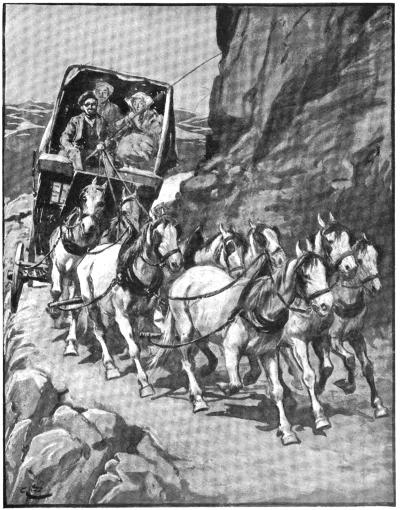
“A WHEEL HUNG FOR AN INSTANT OVER BOTTOMLESS SPACE.”
Our journey from Algiers to Affreville was just like any other railway journey. At the last-named town we got out, had a nice breakfast at the station buffet, and at twelve got into the coupé of a diligence so dilapidated and prehistoric in appearance that my heart sank within me; but that was only the beginning. This vehicle was drawn by eight skinny white horses, each of whom seemed to have his own private opinion as to the manner of drawing the vehicle—and all their opinions seemed to differ vastly from that of the driver, whose face wore an “I give it up” sort of expression. So bored was the good man by things in general that[293] during the journey he indulged in sundry snoozes. This was bearable whilst the road was wide and on the flat, but when it wound like a narrow white ribbon round and round the mountains, and one gazed up on the left at a grey wall of rock, and on the right down fathomless precipices, we glanced at our slumbering Jehu and held on by the skin of our teeth, whilst the skinny horses dashed headlong round narrow corners and a wheel hung for an instant over bottomless space. This nightmare ride lasted for eight hours, during which time I tried hard to feel that I was enjoying myself, despite the cramp in my legs and the stiffness of my neck—necessarily slightly bent on account of the lowness of the roof. Finally we arrived at Teniet-el-Haad, which appeared to be composed of one narrow street hemmed in abruptly on either side by the mountains. Thankfully we crawled out of the[294] diligence and walked up the hill to the “bordj,” or fort, where a flat had been provided for us by the Government. So this was to be my home! I gazed eagerly round at the small rooms with their bare, whitewashed walls, and then—when I had a box to sit on—I sat down and cried.
“Nice place, Algeria, isn’t it?” mildly remarked my husband. I felt at that moment as though I could have throttled him cheerfully.
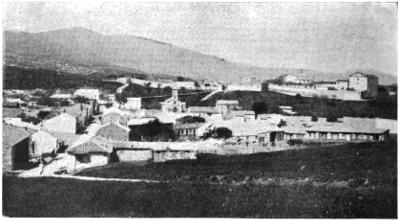
A VIEW OF TENIET-EL-HAAD.
From a Photograph.
Truly my position was not enviable. Accustomed hitherto to be waited on hand and foot, I now found myself without a servant of any kind, save my husband’s orderly. I was in a strange country, and was expected to do everything for myself. However, repining would not help matters, so I set to work to teach the orderly the rudiments of the culinary art, he knowing nothing more about it than—than I did. What hard days those were, to be sure! I wonder my husband survived them. My fried potatoes fell into greasy bits instead of frying, my scrambled eggs flew up the chimney, my omelettes were sickening messes, and the meat either would not cook at all or exaggerated the matter and turned into coal. Then there was the washing and ironing. I never thought—until I essayed the work—that there was much difficulty about it; it seemed quite easy. You took soiled things off, put them in water and soaped them; then you wrung them out, ironed them, and there you were. Our linen, however, grew greyer and greyer, yellower and yellower, and I became pensive. “What do you think is wrong with it?” I asked the orderly, who had become our washerman, there being no other.
“Well, madam,” he said, diffidently, “I think it wants sort of boiling gently with something or other. I remember my mother——”
“Oh, what did your mother do?” I asked, eagerly.
“Well, she washed it first, and then put it in a barrel with a hole in the bottom and—and boiled it, I think. Leastways, it was somehow all right after.”
“But you can’t boil in a barrel; it would catch fire,” I objected. “And why a hole? Surely the water would run out?”
He looked shy and unhappy.
“Well, there may be something wrong about the boiling in the wooden barrel. I misremember that, but”—a slow grin spread over his face—“I’m sure about the hole, because I used to stop it up, and mother was awfully wild.”
After some weeks, however, the orderly began to see light, and, helped by an Arab boy, managed these tiresome domestic matters well enough to allow of my going out riding and seeing a little of the country.
The mountains, burnt yellow by the hot summer sun when I first saw them, were growing rapidly green after a few hours’ torrential rain. In the forest all the spring flowers sprang to life again, flowering hastily on tiny short stems as though fearing they would not find time before being cut off by the winter frosts. A carpet of blue and white iris and crocus spread out under[295] the shade of the mighty cedars, together with all sorts of bright creeping plants. Orchids and narcissi peeped up from every damp corner, and in the crevices of the rocks wild carnations and geraniums made a dash of bright colour.
One day whilst out mushrooming I felt rather thirsty, and proposed to my husband to go and ask for some goats’ milk at a tent I saw peeping through the underwood higher up. He acceded, and, talking and picking flowers, we wandered up slowly. Never in my life have I seen so dilapidated a tent. It had been mended again and again with rags so various in shape and colour that little of the original felidga was left. Around it was the traditional artificial hedge of jujube trees, whose thick, fine, long thorns protected the inmates from thieves and wild beasts. A sad-looking donkey and a few goats grazed around, while a particularly savage dog began barking violently and straining at a very rotten cord at our approach. Thin and mangy, he looked as if he could thoroughly enjoy a steak out of my husband’s substantial calves, but he soon retired, with more haste than dignity, when my better half stooped to pick up a stone. All Kabyle dogs have a settled opinion about stones, and the gesture is sufficient for them.
The noise brought out the owner of the tent, and he stood gazing majestically at us, draped in dirty white rags. A woman followed him. Her thin, bony, brown face, scraggy neck and shoulders, skinny arms and legs might have been those of an old woman, yet something told me that she was young, but worn out by over-work and under-feeding. Such sights are often seen and fill one with pity. Behind her came five little children, all, except the two girls—who each modestly wore a red handkerchief on their curly heads, and a necklet of wooden beads—clothed in sunbeams.
My husband asked if we could have some milk. With a lordly gesture the Arab signed to the woman, who slowly caught a goat by its hind leg and began milking it into a broken yet clean-looking earthen bowl. Nevertheless, I brought out my little picnic mug and made her milk into that.
My husband offered ten sous to the Arab, but he turned away disdainfully. “He who drinks at my tent is welcome,” he said. “He is God’s guest, and between him and me no money can pass.”
And yet how the want of money showed itself on every side!
I made up for it to myself by slipping a few pennies into the brown little hands of the children, who had finally decided that I was not likely to bite and had approached me. Delighted, they ran with them to their mother, who seized them feverishly, with a terrified side-look at her husband. Filled with pity, I slipped a silver piece into her lean hand—rather too well rewarded by the ardent kisses she showered on my hands, my shoulders, and the edge of my dress. I then asked the Arab to show me the interior of his tent. He seemed pleased at my demand, but I regretted it deeply when I beheld the dirtiness of it. Dirt was the principal furniture, together with several wooden spoons, an “aguesseau” for rolling the semolina into cous-cous, a “kess-kess” for cooking it by vapour, and a heap of terrible-looking rags. On this heap lay an indistinct form, from which came slow, painful gasps—the gasps of a departing life. Shuddering, I bent down and saw a venerable woman—so small, so wizened, so extraordinarily thin that I could not imagine how there was any life in her. She opened her eyes and turned them slowly on the Arab; and I read pitiful supplication, mingled with bitter reproach, in their cavernous depths.
The Arab looked down gloomily, and a wave of emotion swept over his hitherto impassive face.
“What is the matter with her?” I asked.
“She has not eaten for two days,” he answered.
“But why? Is she ill? Give her some milk at once. At once, do you hear?”
I felt angry at the calmness of these people in the presence of this dying woman.
“She is dying,” he said, obstinately.
“But you are doing nothing to save her,” I cried.
My husband pulled my sleeve.
“Come, come, dear,” he whispered, “you are giving yourself useless pain.”
“But I will make him give this old woman something,” I persisted. “She is his mother, perhaps, and is trying to ask him for food with all her strength. Give her some milk,” I cried.
The man mumbled something; I understood that he was telling me she was old, worn out, and that it was waste to feed her.
Overwhelmed with horror, I gasped: “Then you are letting her die—on purpose! She—she is dying because you have let her starve to death?”
He bowed his head. Then, as if he felt that some explanation was due to the roumia who was his guest, he added, in a low voice, “Her children will have her share. They want it.”
I seized my husband’s arm. “Come—come away from this horror,” I cried; and quickly we ran down the hill to where the fragrant narcissi grew, and there I flung myself on the ground and sobbed.
Presently the sweet, balmy air was filled with sharp shrieks and yells—the cries of mourning[296] of the Arab women as they tear their faces with their nails. And I knew that the poor old woman had passed away, and that those who had starved her to death were now bemoaning her loss, and consoling themselves by saying, “In cha Allah!” (“It is the will of God”).
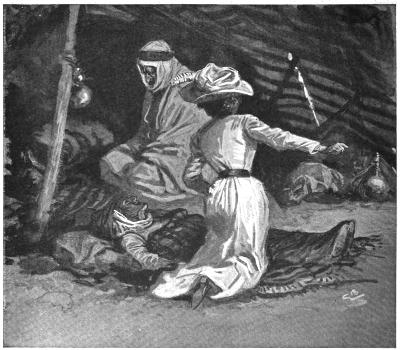
“‘GIVE HER SOME MILK,’ I CRIED.”
I went home a wiser and a sadder woman; I have never forgotten the horror of the incident.
From my window in the fort I had a beautiful view. In front was the range of mountains along which the cedar forest runs. I could just discern the rock where General M——’s first lion tried to get at him, and the small, scrubby tree up which the gallant General swarmed just in time. Lions are very rare nowadays in these parts, though a forester signalled the passage of one on the other side of the forest during my stay. On the left of my window I could see the bee-hive habitations of a race of negroes who live on the hill rising up immediately behind the chief street of Teniet. I think I have never seen such inhuman-looking, hideous specimens of the human race. Monkeys are far superior in looks to them, and their utter malignity and wickedness of expression lent additional ugliness to their distorted, pointed features. Murders were—well, if not daily occurrences, at least very frequent among them, and at last I grew quite accustomed to the diabolical shrieks and shouts which the warm, balmy air wafted to me from the opposite hill.
More often than not the rows originated over some very trivial matter. No European would venture for love or money into this negro village, and several French Spahis told me that they would not guarantee the life of the white man who dared to enter it even in broad daylight. The Arabs held the same opinion, and no honest man among them would visit the place on any account. Thieves and murderers, however, were certain to find a safe refuge, and many a one, I was informed, had hidden there, married a negress, and become one of the sinister tribe. The police never thought of entering the hamlet, and always abandoned pursuit of a criminal at its boundaries. I[297] cannot imagine why the whole place was not burnt down and its lawless inhabitants dispersed.
I failed to obtain a photograph of one of these beauties. They objected to being taken, and no one dared to insist. The next picture, however, depicts the village itself, as seen from Teniet-el-Haad.
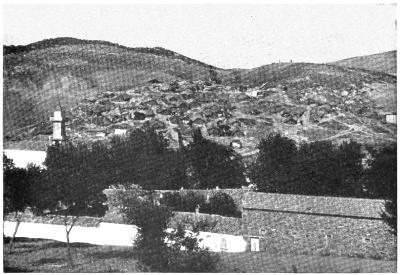
THE THIEVES’ VILLAGE AS SEEN FROM TENIET-EL-HAAD.
From a Photograph.
Talking of murders brings to my mind a double suicide which occurred in the fort. One night I was awakened by a revolver-shot just outside my window. I got up and looked out, but at first could see nothing, so black was the night. After a time, however, I saw a dark mass on the ground and heard a faint moaning. I was about to give the alarm when the sentry passed, stooped down, and uttered an exclamation. Then he went away, to return immediately with others. There was a murmur of voices, and finally they carried something away. My husband was absent, so I was forced to await morning in order to ascertain the facts of the matter. “Cherchez la femme” is, alas! a very true adage. The shot was fired by one of our non-commissioned officers, who had killed himself as he walked to and fro in the barrack-yard smoking and talking with his best friend, whom he had just discovered was a successful rival for the heart of the girl he loved and meant to marry as soon as his service was over. Having had suspicions, he had determined to draw the truth from his friend, who was perfectly oblivious of there being any engagement between him and the girl, and confessed freely when pressed that they loved each other and meant to be married later on. Drawing a revolver from his pocket, the unhappy sous-officier cried, “She was to have been my wife!” and, before the other understood what the phrase meant, pulled the trigger and fell dead at his horrified comrade’s feet.
The morning after, the friend, another non-commissioned officer, was raving mad. When the girl learnt of the tragedy she had caused, we learnt afterwards, she grew very white, but said nothing. All day she sat silent with fixed eyes, deaf to the reproaches of her parents, who did not spare their abuse. The next morning they found her asleep in death—she had poisoned herself!
I noticed here and there whilst riding about the country trees from whose branches hung long shreds of different-coloured cloth. On making inquiries I was told they were marabout, or holy, trees. Each district has one or more of these sacred trees, and to them come all the women to beseech of Allah to grant their prayers. In order to obtain the intercession of the holy tree, they hang pieces of their clothing on the branches, which are sometimes almost entirely[298] covered with coloured rags, fluttering in the breeze, and giving the tree a most curious appearance.
A marabout is a saint, or holy man, and it is not given to every man to be a saint, however pious he may be. Real saintship among the Arabs is hereditary, and is one of the three castes of nobility. The sons are heirs to the fathers’ piety, and, though often far from worthy, reap the benefit of their birth-right. This religious nobility has great influence, and can excite or quell revolts, as, Koran in hand, they preach its precepts, often explained to satisfy their own wishes.
Apart from the hereditary marabouts there are the “little” marabouts, who live miserably on public charity beside the tomb of some ancestor who died in the odour of sanctity. Many of these so-called marabouts manage their affairs uncommonly well and are really wealthy men. Here is a story I have been told, which gives one an idea of the way these “little” marabouts set up in business.
Mohammed ben Mohammed was a marabout whose affairs were in a most flourishing condition. Pilgrims visited his ancestor’s tomb by hundreds, leaving many and rich offerings, and Mohammed ben Mohammed grew fatter and wealthier daily until his servitor, Ali ben Ali, became tired of watching his master’s increased wealth and bulk, whilst his own pocket was as flat as his body was thin. So one dark night he silently took his departure, riding on the back of a young ass belonging to his master.
After a march of about thirty miles the ass had enough of carrying Ali. It was a young ass, and knew no better, so it went on strike, lay down, and forthwith died. Thereupon Ali dug a big hole and put the ass in, piling a great mountain of stones over it. Then, sitting down beside the heap, he began to pray. A traveller passing inquired by whose tomb he prayed so fervently. Ali was filled with astonishment. “What! Had he never heard of the great Saint Amar ben Amar (literally ‘an ass, the son of an ass’)? All the people of the country round came there to pray.” The traveller did not fail to mention the Marabout Amar ben Amar’s tomb, and soon pilgrims flocked to it with offerings, and Ali ben Ali grew fat and rich. The faithful neglected Mohammed ben Mohammed, who at last, furious, abandoned his marabout in order to pay a visit to his rival. Great was his astonishment when he recognised his runaway servitor.
Taking him aside, he whispered, “Tell me the truth. Who is your marabout?”
“The ass I stole from you. And now tell me—who is your marabout?”
“The mother of the ass you stole from me!”
I conclude that the two Arabs chuckled together and continued to exploit the faithful in common, but history does not relate any more of their doings—nor, indeed, does it vouch for the complete veracity of the story. It is, however, to my personal knowledge quite the sort of thing one might expect to happen.
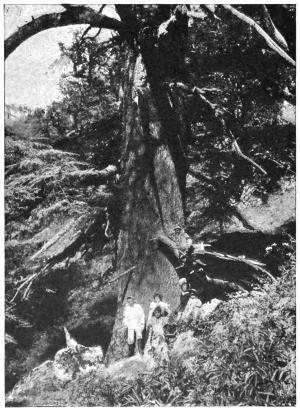
THE AUTHORESS AND HER CHILDREN IN THE CEDAR FOREST NEAR TENIET-EL-HAAD.
From a Photograph.
(To be continued.)
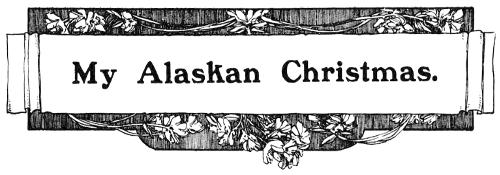
By W. E. Priestly, of Fairbanks, Alaska.
We have published a number of stories of adventure in the icy North, but none giving a more realistic impression of the hardships and dangers which lie in wait for the traveller and prospector in these inhospitable regions than this. Mr. Priestley and his partner set out with dog-teams for a new goldfield, but the partner lost heart and turned back, leaving him to struggle on alone. Death dogged his footsteps through the great white wilderness, and but for the intelligence of his leading dog he would undoubtedly have lost his life.

It was my fortune, or misfortune, to be present in San Francisco at the time of the earthquake and fire of April 18th, 1906. Although I gained a good deal of valuable experience as my share of the catastrophe, I lost all my belongings to offset the bargain.
I stayed in San Francisco until June 1st, and then resolved to try my luck in another country, where earthquakes and such petty worries are unknown. Fate directed my roving footsteps to Alaska, glowingly described by the transportation companies as “The Golden North—the land of fur, fish, and gold.” I thanked the companies for their information, but did not avail myself of their kind offer to sell me a ticket. Both Nature and Fate seemed to have destined me for a rover, and one of the main tenets of a roving life—to say nothing of my financial status—demanded and ordained that I must travel at the least possible expense. I accordingly made arrangements, and worked my passage from San Francisco to St. Michael’s, viâ Nome, on the ss. Buckman. St. Michael’s is a port on the Bering Sea, and is the principal shipping port for the Yukon River and Central Alaska.
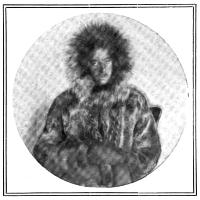
THE AUTHOR, MR. W. E. PRIESTLY, IN HIS ALASKAN COSTUME.
From a Photograph.
From St. Michael’s I found a boat was leaving for the Tanana district, and again luck favoured me, for I got the chance to work my way up to that part of the country. We traversed the Yukon River as far as Fort Gibbon, and from there proceeded up the Tanana River to the mining camp of Fairbanks, which is situated about four hundred miles up-stream from Fort Gibbon.
I arrived in Fairbanks on July 1st, having travelled nearly four thousand miles since leaving San Francisco, and found myself about twenty-five dollars better off than when I started. I stayed in the Fairbanks district until the end of November. The physical features of this country are best described as “eight months iceberg and four months swamp.”
Towards the end of November rumour began to circulate reports that a new goldfield of incredible richness had been discovered. Tales of “eight dollars to the shovelful” were passed through the camp, and all kinds of stories, real and imaginary, were discussed with feverish excitement.
The new diggings were known as the Chandelar, and were situated at the head-waters of the Chandelar River, a tributary of the Yukon,[300] having its source in the Arctic slope and entering the Yukon River about twenty miles below Fort Yukon.
I was anxious to try my luck in the newly-discovered country, but this was a matter that could not be lightly considered. The diggings were about four hundred miles due north of Fairbanks, and a good deal of preparation was necessary before a trip of this kind could be undertaken. I was a new-comer in the country (locally termed a “chechaco”); I was unused to the ways of the trail; there was no food in the new district, except, of course, wild game; and, finally, the temperature at that time was about forty degrees below zero, with every possibility that it would drop to sixty or seventy below zero by the end of December.
I made up my mind that the first thing I must do would be to get a travelling partner who could be depended on. I finally made arrangements with an old-timer in the country, named Bartlett, who was also going up to the Chandelar. He had been in the Klondike rush of ’98, and as he sat by a hot stove and related his marvellous exploits on the trail, his thrilling adventures and hair-breadth escapes, in a state of “chechaco” simplicity that was almost pitiable I congratulated myself on my choice of a partner.
Finding that I had not enough money to purchase everything necessary, I spoke to two friends of mine, and they agreed to put seventy-five dollars each into the trip; in return, they were to have a one-third interest between them of any mining property that I located in the Chandelar. This is a common occurrence in Alaska, and is generally known as a “grubstake proposition.”
![KNOW ALL MEN BY THESE PRESENTS: That We, R.L. MENIFEE, and G.L. BLACKWELL,
of Fairbanks, Alaska, have made constituted and appointed, any by these
presents do hereby make, contribute and appoint, F. Priestley, of the
same place, our true and lawful attorney for us and in our name, place
and stead, and for our use and benefit, to locate stake and record for
us, places mining property in the CHANDELAR DISTRICT, in the Region of
Alaska, North of the Yukon River: [three lines erased here]
hereby giving and granting onto W. PRIESTLEY as said attorney full power
and authority to do and perform all and every act and thing whatsoever
requisite and necessary to be done in and about the premises, as fully
to all intents and purposes as we might or could do if personally
present, hereby ratifying and confirming all that our said Attorney,
W. PRIESTLEY, shall lawfully do or cause to be done by virtue of these
presents.
In WITNESS WHEREOF, we have hereupon set our hands and seals this 3rd
day of December, A.D. 1905.
SIGNED, SEALED & DELIVERED IN THE PRESENCE OF: [signatures]](images/text-power-small.jpg)
A FACSIMILE OF THE AUTHOR’S POWER OF ATTORNEY, GIVING HIM AUTHORITY TO STAKE GROUND ON BEHALF OF HIS PARTNERS.
Agreements were drawn up between us, one being styled a “grubstake agreement” and the other a “power of attorney.” The “grubstake agreement” stated that in return for the sum of one hundred and fifty dollars the parties of the first part drew up this agreement in order that they might have legal claim to a one-third interest in all placer and mining ground staked by party of the second part in the Chandelar district and north of the Yukon River.
The power of attorney was simply a legal document, giving me permission to stake ground for the benefit of absent parties.
Having settled all legal matters and received my “grubstake,” I purchased my outfit—four dogs, a fur robe, a Yukon sled, and a Yukon stove. In addition I had to purchase dog harness, a gun, ammunition, axe, tent, and compass, as well as dog-feed, a good supply of provisions, and suitable clothing for the trip.
My four dogs were of different breeds, only one being a pure native dog or “malamute.” My leader deserves special mention. The most[301] intelligent dog is always placed in the lead, as the dogs are not driven by reins, but simply by word. To tell the dogs to travel straight ahead, the command is “Mush!” or “Mush on!” which is evidently a corruption of the term used by the French-Canadian trappers of the Hudson Bay Company, who would naturally say “Marchez” when ordering their team to travel. To travel to the right the command is “Gee!” and to the left “Aw!”
My leading dog was born in Circle City and had been christened Nellie. She had both the native and the outside strain—a dog whose intelligence and faithfulness cannot be questioned, as after-events will prove.
We left Fairbanks on December 12th, my partner and myself each having four dogs. We had an outfit consisting of tent, stove, guns, ammunition, robes, snow-shoes, one hundred pounds of dog-feed, and about five hundred pounds of food. It was our intention to proceed to Circle City, and there to complete our outfit.
For the first few miles the trail was in excellent condition and we made good time. It was rather late when we started, and by the time we had covered sixteen miles it was already dark. It must be remembered that in the middle of winter there is only a very short period of daylight in Alaska. The first night we stayed at a mining camp known as Golden City, consisting of two saloons and a number of dilapidated cabins, the majority being minus doors or windows.
Next day we made an early start, as we had a very steep hill to climb, known as Cleary Dome. There had been a light fall of snow during the night, and this made the trail very heavy. We found it impossible to get the loads up the hill, so we hitched the eight dogs on to one sled, and, having dragged it to the top of the Dome, we took the dogs down again for the other sled. From the summit there was a steep decline, and it took me all my time to hold back the sled, to prevent it cutting the hind legs of the wheeler dog.
The trail was in bad condition, as it had been cut to pieces by some heavy freight teams. The track at this point ran along the side of a hill down into the valley, and the sleds were on one runner most of the way. Every few minutes they would upset, and a good deal of physical energy would be expended to right them again. The loads were lashed to the sleds, so little actual damage was done.
That night we stayed at Cleary Creek, having accomplished ten miles as the result of the day’s trip, but as the greater part of the ten miles consisted of the ascent and descent already mentioned we were both satisfied.
Next morning we started off, following the trail down Cleary Creek until we struck the Chatanika River, and here we met our first big obstacle. Our course lay up the Chatanika for about seventy miles, but as soon as we arrived on the banks of this river we found it impossible to travel any farther, on account of overflows. It may be as well to explain for the benefit of the uninitiated what is meant by an overflow.
The Chatanika is a river over one hundred miles in length, but is full of gravel bars. At the beginning of winter the stream, of course, freezes, and where the gravel bars are situated it freezes solid to the bottom, owing to the fact that the water is very shallow at these points.
There is always a large body of water flowing from the subterranean springs at the source of this river, and, as this water cannot make its way through the barriers of ice and gravel, it forces itself up through the ice and flows over the top until such time as it freezes or finds its way under the ice again. In some places the overflows thus formed are three or four feet deep.
Now, it is a serious matter to wade through water when the thermometer is a long way below zero. It is the easiest thing in the world for a man to lose his feet in this way, for as soon as one gets wet the moisture freezes into a cake of ice, and unless precautions are immediately taken the limbs may become so badly frozen that amputation is necessary, in order to prevent mortification.
When we found the river was so full of overflows we judged it best to wait a few days and give the water a chance to freeze, as the weather was very cold at this time. We found a deserted cabin, minus door and window, and proceeded to make ourselves as comfortable as possible under these circumstances. We had a stove with us, and as there was plenty of wood handy we soon had the cabin warm.
We stayed at this place over two weeks, waiting for the overflows to close up. Time began to drag heavily on our hands, for the days were very short and game scarce, so all we could do was to eat and sleep and wait for the flood-water to freeze. Our Christmas Day—that day of all the year so eagerly looked forward to in happier climes—we spent as follows. During the few hours of daylight I took my gun and went off into the woods. I found the tracks of a wolverine, but was unable to follow them up, as it was already getting dark, though I could see that the tracks were newly made.
That night we did our best to celebrate Christmas properly. We prepared a feast, which consisted of caribou steak, evaporated potatoes, evaporated onions, canned butter, canned pears, and baking-powder bread. Such little luxuries[302] as plum-puddings and mince-pies were chiefly conspicuous by their absence, and I finished my repast with a bad attack of home-sickness, which was perhaps natural, but hardly in keeping with my rôle of dauntless pioneer.
We waited by the banks of the Chatanika until January 1st, and then, as the overflows still showed no signs of freezing over, we determined to start the New Year and our trip up the river at the same time, and trust to that special Providence which is supposed to guard sailors, fools, drunken men, and little children. The dogs were in good condition, as they had done nothing for two weeks but eat, sleep, and grow fat. They showed a distinct dislike to their harness at first, which was perhaps natural, but after a time resigned themselves to the inevitable.
For the first two miles we managed to pick out a land trail, but after that we had to take to the river, as the timber became too thick. After we had travelled about two miles on the river trail, we began to congratulate ourselves on the condition of the track, for by picking our way carefully and avoiding the stretches of open water we were making good time.
All at once we saw smoke issuing from a small cabin, so we halted the dogs in order to make inquiries regarding the overflows higher up the river. We found the cabin to be occupied by two hunters, who told us that round the bend of the river there was an overflow over three feet deep, which it was impossible to get through. They had been waiting for a week to see whether it would freeze over. We, however, had had enough of delays, so we determined to see whether we could get through.
Reaching the overflow we found it covered with a thin coating of ice. We had just succeeded in getting on to this “glare” ice when, with a crack, it broke under us, and we sank up to our knees in ice-cold water, while the poor dogs were nearly covered. Having once got wet, we thought we might as well try to get through; but it was impossible for the dogs to pull, as they could not get a foothold, and the noses of the sleds were blocked with “slush” ice. We accordingly hitched our eight dogs on to one sled, and I walked ahead in order to encourage the animals to follow me.
Every time I put my foot down I broke through the ice, and it was easy to follow my course by the holes I left behind me in the trail. The farther I went the deeper the water became, and at last I realized that the only thing to be done was to return to the cabin, as it was impossible for either dogs or men to stand the deadly cold of the water much longer. As soon as I arrived at this decision the two hunters, who had come out to assist us, went back to the cabin and prepared a big fire and hot coffee.
We succeeded in getting the dogs on to solid ice again, and the water on the dogs, sleds, and harness—to say nothing of ourselves—immediately turned to ice.
We reached the cabin in a few minutes, got the dogs inside in order to thaw them out, and proceeded to change our frozen clothes. The cabin could hardly be described as pretentious, as the dimensions were only about eight feet by ten, by five feet in height. Put four men and eight dogs, all ice-coated, in this space, with a big fire going, and it will be easily seen that the atmosphere is likely to become somewhat oppressive. To add to our discomfort, the cabin became so hot that the snow on the roof commenced to melt and find its way through the numerous cracks. The floor, consisting as it did of plain mother earth, soon began to take on the form of a small duck-pond, so we were compelled to make a thick carpet of spruce boughs.
Next morning, after a hearty breakfast, we were ready to try the overflow again. My partner at this time began to show himself in his true colours. He was ready to return to Fairbanks, for he had developed a disease variously termed “cold feet,” “crawfish,” or “white feather.”
Reaching the overflow again, we repeated the previous day’s programme, with the same result, but we found that the ice was a little thicker than before. We returned to the cabin, resolved to wait a few days. After staying two more days in the cabin, in an atmosphere resembling a Hindu bazaar or a Turkish bath, another man came up the river with four dogs, and we determined to make a combined attempt to get through.
We therefore hitched the twelve dogs on to one sled, and after a tremendous effort succeeded in getting the sled through the overflow on to solid ice. The first sled taken through contained the tent and stove, and while my partner and myself returned for the other sleds our latest ally pitched the tent and lit the stove, and by the time we got back with the second sled a good cup of coffee was waiting for us. We then returned for the third sled, and having succeeded in dragging it through to the tent we unanimously decided to knock off work, for, although we had only travelled about half a mile from the hunters’ cabin, we were all satisfied that we had done a good day’s work.
Next morning we started before daybreak, determined to put in a long day’s “mush.” The thermometer was down to forty below zero, and we all had the hoods of our “parkas” drawn tight.
We passed Kokomo Creek and had travelled for about six miles when to our dismay we came to a place where the river was open, as far as we could see it round the bend.
The same dreary programme of Chatanika overflow was repeated. Three journeys were made through the water, which was in some places waist deep and was over half a mile long. At the end of the first trip my partner stayed to light a fire. After we had again succeeded in getting the three sleds high and dry we changed our clothes in front of the fire, and, after knocking the ice off the harness and sleds, we made a forced march to an Indian camp about a mile farther ahead. We stayed here for two days, in order to rest the dogs, as their feet had been badly cut by the ice.
At the end of two days my partner and myself started on alone and, after a hard struggle through water and drifts, succeeded in reaching a cabin known as “Cy’s Place,” which is about thirty miles from Cleary Creek. My partner here threw up the sponge and said he was going back to Fairbanks. I told him that I was not in the habit of turning back, so we finally decided to separate, he to go back to Fairbanks, while I made up my mind to try and reach Circle City, and there wait for some party going to the Chandelar.
A bad wind-storm had arisen during the night, and up-river no signs of a trail could be seen, so I left the dogs at “Cy’s Place” and tied on my snow-shoes. Going ahead I “broke trail” for about six miles, returning at night to Cy’s. Next morning I started off on my lone trip, and soon came to the end of my beaten trail. I walked on ahead, wearing my snow-shoes, and the dogs followed as best they could. Every few yards the nose of the sled would bury itself in a drift, and the dogs would lie down until I turned back and dragged it loose.
After I had covered about nine miles in this way the wind began to blow again. It was getting dark, so I tried to pitch the tent, but found it impossible on account of the wind. The only thing left for me to do was to light a big fire and make myself as comfortable as I could until morning. Fortunately there was a good supply of dry wood handy, and I soon had a big fire under the trees. I laid spruce boughs on the snow, and, having fed myself and the dogs, rolled myself in my robe and slept till morning. Of course I had to replenish the fire two or three times during the night, and each time I awoke I found the dogs lying almost on the top of me for warmth.
Next morning, after a rather cheerless breakfast, I started off again. The dogs seemed reluctant to travel, as though aware of some danger ahead. I intended, if possible, to reach a cabin at the mouth of Faith Creek, which was about twenty miles from my camp. I found the trail very heavy, and the only way I could make any progress was to fasten a rope to the sled, tie the other end round my waist, and pull with the dogs. Time and again the sled would be buried in the drifts; but, notwithstanding this, by about half-past two in the afternoon I had made some fourteen miles. It was just commencing to get dark, and the temperature was about forty degrees below zero. I was hoping to get into Faith Creek before five o’clock, as I had not been bothered with overflows, when, suddenly turning a bend in the river, I saw, straight ahead, a stretch of “glare” ice, which warned me to look out for an overflow. I fully realized my serious position. With the weather so cold I was running a chance of freezing to death if I got wet, for the wood all round seemed to be green, and there was now no partner to help me in case I got stuck.
I walked ahead, with the dogs close at my heels, looking for solid ice. Presently, without warning, there was a loud crack, and myself, dogs, and sled were precipitated into the water. The thing happened so suddenly that almost before I realized what had occurred I found myself standing in four feet of water, with the dogs struggling to keep themselves afloat.
My first thought was for them, so I drew out my hunting knife and cut them loose from the sled. They scrambled out as best they could, dragging themselves to solid ice. I next tried to haul the sled out of the water, but found it impossible, so I cut the ropes, let the load sink under the ice, and pulled out the empty sled. With all my food, clothes, dog-feed, and everything else lost, I managed to flounder through the water with the sled on my shoulder. When I got to solid ice once more I began to reflect upon the serious nature of my position. I was at least six miles from any cabin; from feet to neck I was covered with a solid coat of ice; and when I tried to light a fire the green wood refused to burn and my fingers began to freeze. Owing to the ice upon my clothes, I found it impossible to bend my knees, and I realized that my only chance of salvation lay in reaching Faith Creek, six miles away.
Without wasting any further time, I fastened the dogs to the sled and started off. The wind commenced to blow again, and the trail was completely obliterated. The only thing I could do was to trust to the instinct of Nellie, my leading dog. She struggled on gamely through drifts and snow-banks, and the other dogs and myself followed her. The trail was so bad and[304] my clothes were frozen so stiff that I could only travel at about a mile an hour.
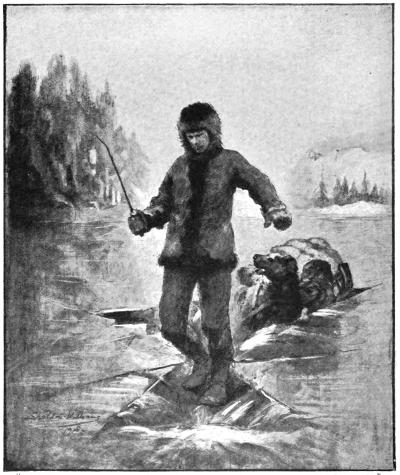
“THERE WAS A LOUD CRACK, AND MYSELF, DOGS, AND SLED WERE PRECIPITATED INTO THE WATER.”
The night grew darker, and it was soon almost impossible to see the trees on either side of the river, except at such times as the trail veered to one side or the other; then the trees would be discernible, standing up stark and naked, like gigantic skeletons rising from the snow. In the zenith the Polar star glowed brilliantly, while as far as the eye could reach the snow lay like a gleaming shroud on the earth. Not a sound was to be heard save the panting of the dogs, the crunch of snow under my frozen moccasins, and, somewhere in the distance, the howl of an animal. I cared for nothing, thought of nothing, desired nothing, save to reach Faith Creek. Time and again I was ready to drop, but I still kept on, spurred by the thought that I was fighting for my life, for I knew that once I gave way to the lassitude that seemed to be gripping my senses, my life would pay the forfeit. I had heard so much of lone “mushers” on the trail, who had lain down on the snow for a sleep from which they never awoke, that I was prepared to struggle on to the last.
Soon the dogs began to tire, and it was only by persistent effort that I could keep them from lying down in the snow. They were so weary, poor brutes, that it was cruelty to whip them; all I could do was to pat them and encourage them with my voice. Nellie tried to lick my frozen gauntlet, or, half in play, to bite my numbed hand.
Still I kept on, hoping against hope that I[305] should soon see the light in the Faith Creek cabin. I kept shouting, but all the answer I got was a mocking echo. Blundering through snow-drifts, with the wind-blown snow driving against my face like particles of glass, the dogs panting with exertion or moaning from the pain of their lacerated feet, without a sign of a trail or landmark, and with my feet in a peculiar condition of insensibility, still I staggered blindly but persistently towards my goal.
At eight o’clock I was still on the trail; but somehow a doubt began to take possession of me that perhaps I had missed the cabin altogether and was wandering towards the Twelve-mile Divide.
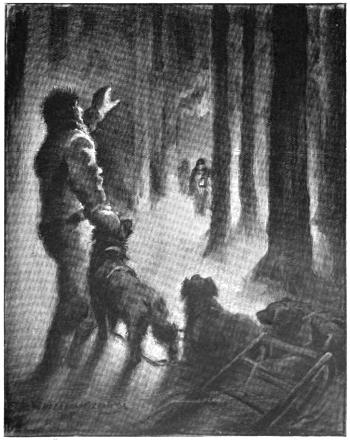
“I SAW TWO MEN APPROACHING ME, AND AT ONCE STRUGGLED TO MY FEET.”
All at once the dogs stopped, and on stepping ahead to see what was the matter I found they were tangled in their harness. I tried to bend over to release them, but my clothes were so stiff that I found it impossible, and I lurched over, falling head-foremost into a drift.
I tried to raise myself to a sitting position, only to fall back weakly. A new sensation seemed to be taking possession of me. I no longer desired to struggle; a mysterious warmth appeared to surround me, and a drowsiness stole over my senses. My only wish was to be left alone to sleep. I was just dozing off when Nellie, my leading dog, lifted up her nose and gave vent to a weird, wolf-like howl, which she[306] repeated after a few seconds’ interval. I gazed at her with an almost ludicrous amazement, wondering stupidly why she was making such a noise. Almost simultaneously with her second howl I heard a shout and, to my amazement, saw a lantern shining through the trees. I at once realised that help was at hand, and immediately the desire for sleep left me. A wild longing for life, for warmth, for food, asserted itself instead, and I gave a yell that must have sounded like the war-whoop of an Apache Indian. A moment later I saw two men approaching me, and at once struggled to my feet. Through the trees came the shouted query, “Are you all right?” “I’m all right,” I answered. “Where’s the cabin?” By this time the two men had reached me, and one of them, looking hard into my face, exclaimed, “Why, your nose is frozen!”
He put his arm round me and helped me to the cabin, while the other man took charge of my dogs. I found that the cabin was only about a hundred yards from the place where I had lain down to sleep, but, owing to the fact that it was built in a grove of trees, it was impossible to see it until one was close to it. It seems almost ironical that had it not been for the howl of a dog I would surely have died within a hundred yards of warmth and shelter.
Once in the cabin the men examined me, and found that my nose, ears, and fingers were frozen, but not dangerously so. Without any hesitation they took a knife and cut off my socks and moccasins. My feet, from the toes to the ankles, were as white and as hard as marble. They thawed them out with snow, and for three hours I suffered indescribable torment as the congealed blood began to circulate.
Next morning my feet were so swollen and looked so bad that I was wrapped in furs, packed in a dog-sled, and taken to the hospital at Fairbanks, which was reached in three days. I lay in the hospital for three months, but fortunately did not lose any portion of my feet. It will be many months, however, before I shall be able to walk as well as formerly, but I count myself as one of the most fortunate, because I escaped with my life.
It only remains for me to add that Nellie is still with me; I intend never to part with her. Very few men can say that they have cheated death through the howl of a dog, and I consider it my duty to care for the animal who, by her devotion and intelligence, saved my life that day on the Circle trail.
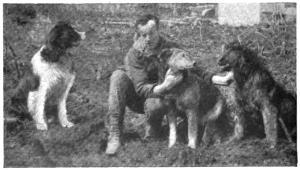
THE AUTHOR AND HIS DOGS—THE CENTRE ANIMAL IS NELLIE, WHO SAVED HIS LIFE.
From a Photograph.
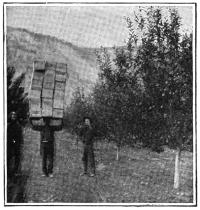
The photograph reproduced herewith is taken from “The Captain,” and shows a Hindu employed on a farm in British Columbia carrying on his head a load of boxes of apples over six feet in height and weighing one hundred and twenty-five pounds. The photograph incidentally gives a very good idea of the grand scenery in this flourishing colony.
The group of islands known as the Nicobars, about one hundred and fifty miles south of the Andamans, has been but little explored, though the manners and customs of the inhabitants offer very interesting peculiarities to the ethnologist. One of the most noticeable of these is the passion for old hats. Young and old, chief and subject alike, endeavour to outvie one another in the singularity of shape, no less than in the number of old hats they can acquire during their lifetime. On a fine morning at the Nicobars it is no unusual thing to see the surface of the ocean in the vicinity of the islands dotted over with canoes, in each of which the noble savage, with nothing on but the conventional slip of cloth and a tall white hat with a black band, may be watched catching fish for his daily meal. Second-hand hats are in most request, new ones being looked upon with suspicion and disfavour.—“TIT-BITS.”
Numbers of irresponsible men ride along the trails in spring, when the deer are in deplorable condition after a hard winter, and almost too weak to get out of the way, taking pot shots at the poor brutes with revolvers, hardly troubling to see whether they make a kill, and never following a wounded animal. Almost every district which has had a mining excitement has had the game almost entirely depleted in this manner. The more outrageous offences have certainly been stopped to some extent; but there is still a great deal of this sort of thing going on, and now that the laws are being more strictly enforced many of these irresponsible persons take out a miner’s licence so as to render themselves safe from prosecution.—“COUNTRY LIFE.”
The Chinese are rapidly taking up Western ideas, and translations of English and French novels are now in increasing demand. Our romantic and sentimental treatment of love-affairs, however, is a thing so foreign to Oriental ethics that the hero of the ordinary European novel appears to the Chinese mind as a person of perverted moral sense and doubtful sanity. Translations of Dickens, therefore, impress the Chinese reader less than they amaze him, and detective stories and tales of adventure command a more sympathetic audience.—“WOMAN’S LIFE.”
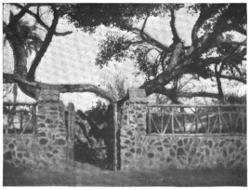
The annexed photograph shows a famous tree growing in the little Egyptian village of Matariyah, which is partly built on the ruins of Heliopolis and situated about four and a half miles to the north of Cairo. It is usually called “The Virgin’s Tree,” from the tradition that the Virgin Mary sat and rested under its shadow during her flight to Egypt. It is also said that by remaining hidden in the hollow tree by means of a marvellously-twisted cobweb she succeeded in escaping her persecutors.—“THE STRAND MAGAZINE.”
The “Shark Papers”—A Mysterious Archway—British Columbian “Poverty Socials,” etc., etc.
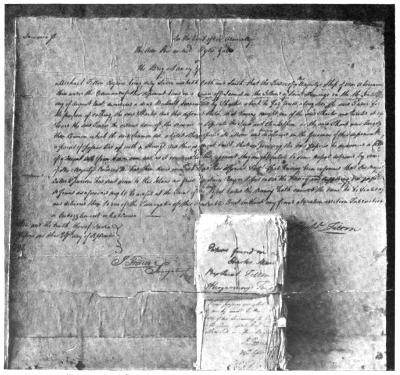
THE FAMOUS “SHARK PAPERS” OF JAMAICA, WHICH HAVE A MOST CURIOUS AND ROMANTIC HISTORY.
From a Photograph.
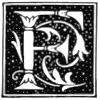
Few exhibits in the Institute of Jamaica, British West Indies, possess a more curious history than the famous “Shark Papers,” a photograph of which is reproduced herewith. The story is, briefly, as follows: On August 28th, 1799, a naval officer named Hugh Wylie, in command of H.M. cutter Sparrow, while cruising off the coast of Hayti, gave chase to, and eventually captured, the American brig Nancy. The prize was sent in to Port Royal, and a fortnight later a suit for salvage was brought on behalf of Wylie against “a certain brig or vessel called the Nancy, her guns, tackle, furniture, ammunition, and apparel, and the goods, wares, merchandise, specie, and effects on board her, taken and seized as the property of some person or persons, being enemies of our Sovereign Lord and King, and good and lawful prize on the high seas, and within the jurisdiction of this Court.” A claim for the dismissal of the case with costs, backed with affidavits, was put in by the owners of the brig, in which, as it subsequently turned out, they perjured themselves freely. While the case was proceeding Lieutenant Michael Fitton, in command of the Ferret, and Wylie in command of the Sparrow (both tenders of H.M.S. Abergavenny, the flagship at Port Royal), put out to sea with the object of earning for the stationary flagship a share of the prizes which were constantly being taken by the cruisers. On rejoining after an accidental separation, Fitton invited[309] Wylie by signal to come to breakfast. While waiting for him to come aboard the Ferret crew captured a huge shark, which, on being opened, was found to contain a sealed packet of papers. During the breakfast Wylie mentioned that he had detained an American brig called the Nancy. Fitton thereupon said he had her papers. “Papers?” answered Wylie. “Why, I sealed up her papers and sent them in with her.” “Just so,” replied Fitton; “those were her false papers. Here are her real ones; my men found them in the stomach of a shark!” These papers, together with others of an incriminating nature found on the Nancy some time after her capture, carefully concealed in the captain’s cabin, led to the condemnation of the brig and her cargo on the 25th November, 1799. The head of the shark which swallowed the papers is still preserved in the United Service Museum at Whitehall, London, S.W.
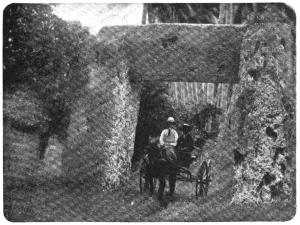
A MYSTERIOUS ARCHWAY IN THE TONGAN ARCHIPELAGO—IT IS OF VAST ANTIQUITY, AND IS BELIEVED TO POINT TO THE FACT THAT THE PACIFIC ISLANDS WERE ONCE ONE VAST CONTINENT.
From a Photograph.
The archway here shown, made of enormous slabs of coral rock neatly chiselled and mortised, is one of the many interesting problems of the Pacific. If, as is generally believed, the South Sea Islands are of comparatively recent volcanic and coralline formation, who built this archway, which is situated on one of the smallest islands of the Tongan group? The oldest native inhabitants of the islands know nothing of its origin, and from its appearance the monument is of great antiquity. From this and other indications it has been claimed that the “Milky Way” of the Pacific was in prehistoric times one vast continent, inhabited by peoples of whom the present-day world has lost all record.
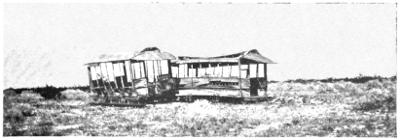
THE LAST RELICS OF AN ILL-STARRED ENTERPRISE, A “HORSE RAILWAY” ACROSS AN AMERICAN DESERT.
From a Photograph.
“Travelling recently on donkey-back across a trackless portion of the Conchilla Desert in South-Eastern California,” writes a correspondent, “we sighted ahead of us above the sage-brush a nondescript object which on nearer approach resolved itself into the two dilapidated tramcars shown in the next photograph. They formed the equipment of a ‘horse railway’ across the sands ten or twelve years ago to connect a solitary station on the Southern Pacific Railway with an agricultural colony several miles distant. The farming enterprise, however, failed utterly, and the ‘horse railway’ with it. The incongruous sight of these two abandoned cars in the midst of drifting sands is all that remains to-day to tell the tale of shattered hope.”
The amusing handbill shown below refers to a curious function which is very popular in British Columbia—the “poverty social.” This is an entertainment of the kind formerly known in more conventional circles as a “conversazione.” Whereas the latter is chiefly distinguished for its formality and general uncomfortableness, these “poverty socials” are delightfully free and easy; indeed, the people attending them are actually fined if their clothes are considered at all stylish or savouring of ostentation, the idea, of course, being that everyone—rich and poor alike—shall feel entirely at their ease. Needless to say, the bad spelling and the mistakes made in the printing of the bill are all carefully designed to heighten the homely effect of the gathering.
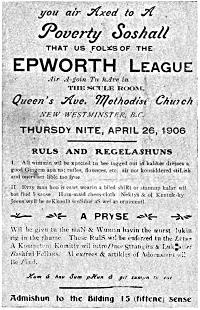
THIS AMUSING HANDBILL REFERS TO A BRITISH COLUMBIAN “POVERTY SOCIAL,” A FORM OF ENTERTAINMENT WHICH IS EXTREMELY POPULAR.
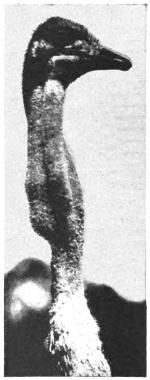
HALF-A-DOZEN ORANGES TRAVELLING DOWN THE THROAT OF A CALIFORNIAN OSTRICH.
From a Photograph.
It is questionable if any animal on earth could duplicate the swallowing feat that is to be seen daily (or as often as a tourist comes along) at the Cawston Ostrich Farm in South Pasadena, California. The ostriches on this farm are veritable giants of their race, having responded generously to the genial climate, good food, and scientific care. Oranges are one of their great dainties—the big “navel” oranges of California, measuring upwards of three and a half inches in diameter. One old patriarch named “Emperor William” will catch the oranges one after another, full ten feet above the ground, until an even dozen may be seen at the same time slowly bumping down his long expanse of neck, to be finally lost in the ruffle of feathers where neck and body join! “William” has been known to gulp thirty-five or forty oranges in succession, and the fact that he is in robust health at twenty-three years of age seems to indicate that California oranges agree with him.
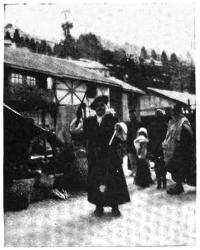
THE UBIQUITOUS GAME—A NATIVE OF BHUTAN PLAYING “DIABOLO” AT DARJEELING.
From a Photograph.
An Indian reader writes: “I enclose a photograph which I recently took whilst paying a visit to the Indian hill station of Darjeeling. The picture represents a Bhutia, or native of Bhutan, playing ‘Diabolo.’ Although the game has made big strides both at home and abroad, I think that probably Darjeeling, at an altitude of seven thousand feet, represents the highest point it has touched at present.”
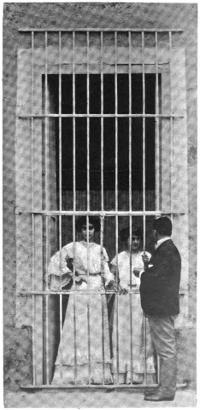
LOVE-MAKING IN MEXICO—THIS YOUNG MAN HAS PATIENTLY WAITED UNDER THE WINDOW OF HIS INAMORATA UNTIL SHE CHOSE TO COME TO THE GRATING AND SPEAK TO HIM.
From a Photograph.
In Spanish-speaking countries young women are allowed but little of the liberty that they enjoy in lands where English is the native tongue. They rarely meet young men at social entertainments, and are never permitted to converse with them except in the presence of older people. They do, of course, contrive to carry on flirtations, but chiefly with the eyes. In every town in a Spanish-speaking country there is a plaza, where a band plays on one or two evenings of the week. The young men and women congregate there, the former walking round and round in one direction and the latter in the opposite direction. Thus they are constantly meeting and making eyes at each other, but they do not pair off or sit down on the benches together. When a young man wants to pay his attentions to a girl, he must get notes smuggled to her or “play the bear”—that is, stand under the window of her room and try to attract her attention, either by serenading her with some musical instrument, or, if he has no gift that way, by simply waiting patiently until she chances to look out and cast him an encouraging glance. In spite, however, of all difficulties and obstacles, Cupid contrives to find a way, and young people fall in love and marry just as in lands where etiquette is less strict and opportunities for tête-à-tête conversations more frequent.
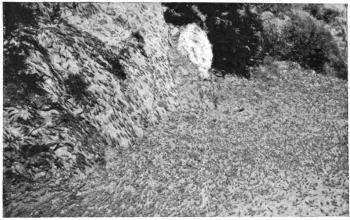
A PLAGUE OF LOCUSTS ON THE NORTH-WEST FRONTIER OF INDIA—THEY COVERED THE HILLS FOR MILES, STRIPPED ALL THE LEAVES OFF THE TREES, AND IN SOME CASES EVEN ATE THE BARK!
From a Photograph.
The striking little photograph above was sent by Colonel the Hon. H. E. Maxwell, D.S.O., from the remote post of Cherat, on the North-West frontier of India. “It was taken during a flight of locusts,” he writes. “They covered the hills for miles in every direction, and during their two or three days’ stay caused enormous damage to the few trees and shrubs with which we are blessed, stripping them entirely of their leaves, and in some cases even eating away the bark!”
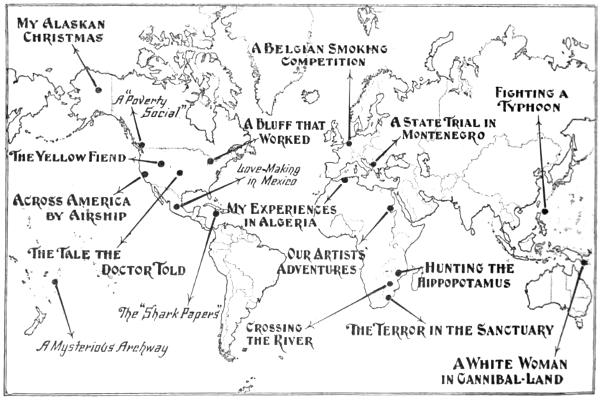
THE MAP-CONTENTS OF “THE WIDE WORLD MAGAZINE,” WHICH SHOWS AT A GLANCE THE LOCALITY OF EACH ARTICLE AND NARRATIVE OF ADVENTURE IN THIS NUMBER.
End of the Project Gutenberg EBook of Wide World Magazine, Vol. 22, No. 129,
December, 1908, by Various
*** END OF THIS PROJECT GUTENBERG EBOOK WIDE WORLD MAGAZINE, DEC 1908 ***
***** This file should be named 53928-h.htm or 53928-h.zip *****
This and all associated files of various formats will be found in:
http://www.gutenberg.org/5/3/9/2/53928/
Produced by Victorian/Edwardian Pictorial Magazines,
Jonathan Ingram and the Online Distributed Proofreading
Team at http://www.pgdp.net
Updated editions will replace the previous one--the old editions will
be renamed.
Creating the works from print editions not protected by U.S. copyright
law means that no one owns a United States copyright in these works,
so the Foundation (and you!) can copy and distribute it in the United
States without permission and without paying copyright
royalties. Special rules, set forth in the General Terms of Use part
of this license, apply to copying and distributing Project
Gutenberg-tm electronic works to protect the PROJECT GUTENBERG-tm
concept and trademark. Project Gutenberg is a registered trademark,
and may not be used if you charge for the eBooks, unless you receive
specific permission. If you do not charge anything for copies of this
eBook, complying with the rules is very easy. You may use this eBook
for nearly any purpose such as creation of derivative works, reports,
performances and research. They may be modified and printed and given
away--you may do practically ANYTHING in the United States with eBooks
not protected by U.S. copyright law. Redistribution is subject to the
trademark license, especially commercial redistribution.
START: FULL LICENSE
THE FULL PROJECT GUTENBERG LICENSE
PLEASE READ THIS BEFORE YOU DISTRIBUTE OR USE THIS WORK
To protect the Project Gutenberg-tm mission of promoting the free
distribution of electronic works, by using or distributing this work
(or any other work associated in any way with the phrase "Project
Gutenberg"), you agree to comply with all the terms of the Full
Project Gutenberg-tm License available with this file or online at
www.gutenberg.org/license.
Section 1. General Terms of Use and Redistributing Project
Gutenberg-tm electronic works
1.A. By reading or using any part of this Project Gutenberg-tm
electronic work, you indicate that you have read, understand, agree to
and accept all the terms of this license and intellectual property
(trademark/copyright) agreement. If you do not agree to abide by all
the terms of this agreement, you must cease using and return or
destroy all copies of Project Gutenberg-tm electronic works in your
possession. If you paid a fee for obtaining a copy of or access to a
Project Gutenberg-tm electronic work and you do not agree to be bound
by the terms of this agreement, you may obtain a refund from the
person or entity to whom you paid the fee as set forth in paragraph
1.E.8.
1.B. "Project Gutenberg" is a registered trademark. It may only be
used on or associated in any way with an electronic work by people who
agree to be bound by the terms of this agreement. There are a few
things that you can do with most Project Gutenberg-tm electronic works
even without complying with the full terms of this agreement. See
paragraph 1.C below. There are a lot of things you can do with Project
Gutenberg-tm electronic works if you follow the terms of this
agreement and help preserve free future access to Project Gutenberg-tm
electronic works. See paragraph 1.E below.
1.C. The Project Gutenberg Literary Archive Foundation ("the
Foundation" or PGLAF), owns a compilation copyright in the collection
of Project Gutenberg-tm electronic works. Nearly all the individual
works in the collection are in the public domain in the United
States. If an individual work is unprotected by copyright law in the
United States and you are located in the United States, we do not
claim a right to prevent you from copying, distributing, performing,
displaying or creating derivative works based on the work as long as
all references to Project Gutenberg are removed. Of course, we hope
that you will support the Project Gutenberg-tm mission of promoting
free access to electronic works by freely sharing Project Gutenberg-tm
works in compliance with the terms of this agreement for keeping the
Project Gutenberg-tm name associated with the work. You can easily
comply with the terms of this agreement by keeping this work in the
same format with its attached full Project Gutenberg-tm License when
you share it without charge with others.
1.D. The copyright laws of the place where you are located also govern
what you can do with this work. Copyright laws in most countries are
in a constant state of change. If you are outside the United States,
check the laws of your country in addition to the terms of this
agreement before downloading, copying, displaying, performing,
distributing or creating derivative works based on this work or any
other Project Gutenberg-tm work. The Foundation makes no
representations concerning the copyright status of any work in any
country outside the United States.
1.E. Unless you have removed all references to Project Gutenberg:
1.E.1. The following sentence, with active links to, or other
immediate access to, the full Project Gutenberg-tm License must appear
prominently whenever any copy of a Project Gutenberg-tm work (any work
on which the phrase "Project Gutenberg" appears, or with which the
phrase "Project Gutenberg" is associated) is accessed, displayed,
performed, viewed, copied or distributed:
This eBook is for the use of anyone anywhere in the United States and
most other parts of the world at no cost and with almost no
restrictions whatsoever. You may copy it, give it away or re-use it
under the terms of the Project Gutenberg License included with this
eBook or online at www.gutenberg.org. If you are not located in the
United States, you'll have to check the laws of the country where you
are located before using this ebook.
1.E.2. If an individual Project Gutenberg-tm electronic work is
derived from texts not protected by U.S. copyright law (does not
contain a notice indicating that it is posted with permission of the
copyright holder), the work can be copied and distributed to anyone in
the United States without paying any fees or charges. If you are
redistributing or providing access to a work with the phrase "Project
Gutenberg" associated with or appearing on the work, you must comply
either with the requirements of paragraphs 1.E.1 through 1.E.7 or
obtain permission for the use of the work and the Project Gutenberg-tm
trademark as set forth in paragraphs 1.E.8 or 1.E.9.
1.E.3. If an individual Project Gutenberg-tm electronic work is posted
with the permission of the copyright holder, your use and distribution
must comply with both paragraphs 1.E.1 through 1.E.7 and any
additional terms imposed by the copyright holder. Additional terms
will be linked to the Project Gutenberg-tm License for all works
posted with the permission of the copyright holder found at the
beginning of this work.
1.E.4. Do not unlink or detach or remove the full Project Gutenberg-tm
License terms from this work, or any files containing a part of this
work or any other work associated with Project Gutenberg-tm.
1.E.5. Do not copy, display, perform, distribute or redistribute this
electronic work, or any part of this electronic work, without
prominently displaying the sentence set forth in paragraph 1.E.1 with
active links or immediate access to the full terms of the Project
Gutenberg-tm License.
1.E.6. You may convert to and distribute this work in any binary,
compressed, marked up, nonproprietary or proprietary form, including
any word processing or hypertext form. However, if you provide access
to or distribute copies of a Project Gutenberg-tm work in a format
other than "Plain Vanilla ASCII" or other format used in the official
version posted on the official Project Gutenberg-tm web site
(www.gutenberg.org), you must, at no additional cost, fee or expense
to the user, provide a copy, a means of exporting a copy, or a means
of obtaining a copy upon request, of the work in its original "Plain
Vanilla ASCII" or other form. Any alternate format must include the
full Project Gutenberg-tm License as specified in paragraph 1.E.1.
1.E.7. Do not charge a fee for access to, viewing, displaying,
performing, copying or distributing any Project Gutenberg-tm works
unless you comply with paragraph 1.E.8 or 1.E.9.
1.E.8. You may charge a reasonable fee for copies of or providing
access to or distributing Project Gutenberg-tm electronic works
provided that
* You pay a royalty fee of 20% of the gross profits you derive from
the use of Project Gutenberg-tm works calculated using the method
you already use to calculate your applicable taxes. The fee is owed
to the owner of the Project Gutenberg-tm trademark, but he has
agreed to donate royalties under this paragraph to the Project
Gutenberg Literary Archive Foundation. Royalty payments must be paid
within 60 days following each date on which you prepare (or are
legally required to prepare) your periodic tax returns. Royalty
payments should be clearly marked as such and sent to the Project
Gutenberg Literary Archive Foundation at the address specified in
Section 4, "Information about donations to the Project Gutenberg
Literary Archive Foundation."
* You provide a full refund of any money paid by a user who notifies
you in writing (or by e-mail) within 30 days of receipt that s/he
does not agree to the terms of the full Project Gutenberg-tm
License. You must require such a user to return or destroy all
copies of the works possessed in a physical medium and discontinue
all use of and all access to other copies of Project Gutenberg-tm
works.
* You provide, in accordance with paragraph 1.F.3, a full refund of
any money paid for a work or a replacement copy, if a defect in the
electronic work is discovered and reported to you within 90 days of
receipt of the work.
* You comply with all other terms of this agreement for free
distribution of Project Gutenberg-tm works.
1.E.9. If you wish to charge a fee or distribute a Project
Gutenberg-tm electronic work or group of works on different terms than
are set forth in this agreement, you must obtain permission in writing
from both the Project Gutenberg Literary Archive Foundation and The
Project Gutenberg Trademark LLC, the owner of the Project Gutenberg-tm
trademark. Contact the Foundation as set forth in Section 3 below.
1.F.
1.F.1. Project Gutenberg volunteers and employees expend considerable
effort to identify, do copyright research on, transcribe and proofread
works not protected by U.S. copyright law in creating the Project
Gutenberg-tm collection. Despite these efforts, Project Gutenberg-tm
electronic works, and the medium on which they may be stored, may
contain "Defects," such as, but not limited to, incomplete, inaccurate
or corrupt data, transcription errors, a copyright or other
intellectual property infringement, a defective or damaged disk or
other medium, a computer virus, or computer codes that damage or
cannot be read by your equipment.
1.F.2. LIMITED WARRANTY, DISCLAIMER OF DAMAGES - Except for the "Right
of Replacement or Refund" described in paragraph 1.F.3, the Project
Gutenberg Literary Archive Foundation, the owner of the Project
Gutenberg-tm trademark, and any other party distributing a Project
Gutenberg-tm electronic work under this agreement, disclaim all
liability to you for damages, costs and expenses, including legal
fees. YOU AGREE THAT YOU HAVE NO REMEDIES FOR NEGLIGENCE, STRICT
LIABILITY, BREACH OF WARRANTY OR BREACH OF CONTRACT EXCEPT THOSE
PROVIDED IN PARAGRAPH 1.F.3. YOU AGREE THAT THE FOUNDATION, THE
TRADEMARK OWNER, AND ANY DISTRIBUTOR UNDER THIS AGREEMENT WILL NOT BE
LIABLE TO YOU FOR ACTUAL, DIRECT, INDIRECT, CONSEQUENTIAL, PUNITIVE OR
INCIDENTAL DAMAGES EVEN IF YOU GIVE NOTICE OF THE POSSIBILITY OF SUCH
DAMAGE.
1.F.3. LIMITED RIGHT OF REPLACEMENT OR REFUND - If you discover a
defect in this electronic work within 90 days of receiving it, you can
receive a refund of the money (if any) you paid for it by sending a
written explanation to the person you received the work from. If you
received the work on a physical medium, you must return the medium
with your written explanation. The person or entity that provided you
with the defective work may elect to provide a replacement copy in
lieu of a refund. If you received the work electronically, the person
or entity providing it to you may choose to give you a second
opportunity to receive the work electronically in lieu of a refund. If
the second copy is also defective, you may demand a refund in writing
without further opportunities to fix the problem.
1.F.4. Except for the limited right of replacement or refund set forth
in paragraph 1.F.3, this work is provided to you 'AS-IS', WITH NO
OTHER WARRANTIES OF ANY KIND, EXPRESS OR IMPLIED, INCLUDING BUT NOT
LIMITED TO WARRANTIES OF MERCHANTABILITY OR FITNESS FOR ANY PURPOSE.
1.F.5. Some states do not allow disclaimers of certain implied
warranties or the exclusion or limitation of certain types of
damages. If any disclaimer or limitation set forth in this agreement
violates the law of the state applicable to this agreement, the
agreement shall be interpreted to make the maximum disclaimer or
limitation permitted by the applicable state law. The invalidity or
unenforceability of any provision of this agreement shall not void the
remaining provisions.
1.F.6. INDEMNITY - You agree to indemnify and hold the Foundation, the
trademark owner, any agent or employee of the Foundation, anyone
providing copies of Project Gutenberg-tm electronic works in
accordance with this agreement, and any volunteers associated with the
production, promotion and distribution of Project Gutenberg-tm
electronic works, harmless from all liability, costs and expenses,
including legal fees, that arise directly or indirectly from any of
the following which you do or cause to occur: (a) distribution of this
or any Project Gutenberg-tm work, (b) alteration, modification, or
additions or deletions to any Project Gutenberg-tm work, and (c) any
Defect you cause.
Section 2. Information about the Mission of Project Gutenberg-tm
Project Gutenberg-tm is synonymous with the free distribution of
electronic works in formats readable by the widest variety of
computers including obsolete, old, middle-aged and new computers. It
exists because of the efforts of hundreds of volunteers and donations
from people in all walks of life.
Volunteers and financial support to provide volunteers with the
assistance they need are critical to reaching Project Gutenberg-tm's
goals and ensuring that the Project Gutenberg-tm collection will
remain freely available for generations to come. In 2001, the Project
Gutenberg Literary Archive Foundation was created to provide a secure
and permanent future for Project Gutenberg-tm and future
generations. To learn more about the Project Gutenberg Literary
Archive Foundation and how your efforts and donations can help, see
Sections 3 and 4 and the Foundation information page at
www.gutenberg.org
Section 3. Information about the Project Gutenberg Literary Archive Foundation
The Project Gutenberg Literary Archive Foundation is a non profit
501(c)(3) educational corporation organized under the laws of the
state of Mississippi and granted tax exempt status by the Internal
Revenue Service. The Foundation's EIN or federal tax identification
number is 64-6221541. Contributions to the Project Gutenberg Literary
Archive Foundation are tax deductible to the full extent permitted by
U.S. federal laws and your state's laws.
The Foundation's principal office is in Fairbanks, Alaska, with the
mailing address: PO Box 750175, Fairbanks, AK 99775, but its
volunteers and employees are scattered throughout numerous
locations. Its business office is located at 809 North 1500 West, Salt
Lake City, UT 84116, (801) 596-1887. Email contact links and up to
date contact information can be found at the Foundation's web site and
official page at www.gutenberg.org/contact
For additional contact information:
Dr. Gregory B. Newby
Chief Executive and Director
[email protected]
Section 4. Information about Donations to the Project Gutenberg
Literary Archive Foundation
Project Gutenberg-tm depends upon and cannot survive without wide
spread public support and donations to carry out its mission of
increasing the number of public domain and licensed works that can be
freely distributed in machine readable form accessible by the widest
array of equipment including outdated equipment. Many small donations
($1 to $5,000) are particularly important to maintaining tax exempt
status with the IRS.
The Foundation is committed to complying with the laws regulating
charities and charitable donations in all 50 states of the United
States. Compliance requirements are not uniform and it takes a
considerable effort, much paperwork and many fees to meet and keep up
with these requirements. We do not solicit donations in locations
where we have not received written confirmation of compliance. To SEND
DONATIONS or determine the status of compliance for any particular
state visit www.gutenberg.org/donate
While we cannot and do not solicit contributions from states where we
have not met the solicitation requirements, we know of no prohibition
against accepting unsolicited donations from donors in such states who
approach us with offers to donate.
International donations are gratefully accepted, but we cannot make
any statements concerning tax treatment of donations received from
outside the United States. U.S. laws alone swamp our small staff.
Please check the Project Gutenberg Web pages for current donation
methods and addresses. Donations are accepted in a number of other
ways including checks, online payments and credit card donations. To
donate, please visit: www.gutenberg.org/donate
Section 5. General Information About Project Gutenberg-tm electronic works.
Professor Michael S. Hart was the originator of the Project
Gutenberg-tm concept of a library of electronic works that could be
freely shared with anyone. For forty years, he produced and
distributed Project Gutenberg-tm eBooks with only a loose network of
volunteer support.
Project Gutenberg-tm eBooks are often created from several printed
editions, all of which are confirmed as not protected by copyright in
the U.S. unless a copyright notice is included. Thus, we do not
necessarily keep eBooks in compliance with any particular paper
edition.
Most people start at our Web site which has the main PG search
facility: www.gutenberg.org
This Web site includes information about Project Gutenberg-tm,
including how to make donations to the Project Gutenberg Literary
Archive Foundation, how to help produce our new eBooks, and how to
subscribe to our email newsletter to hear about new eBooks.